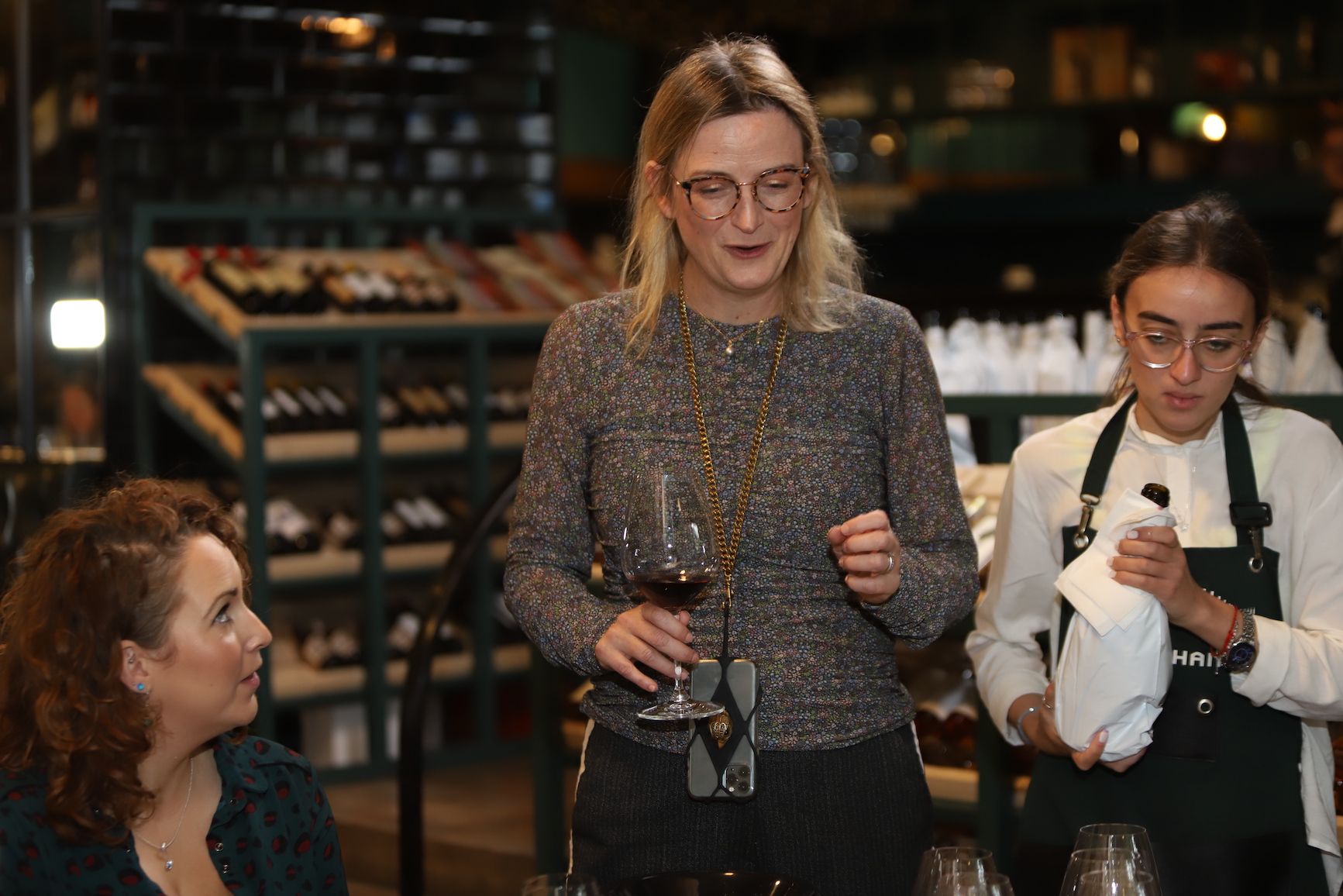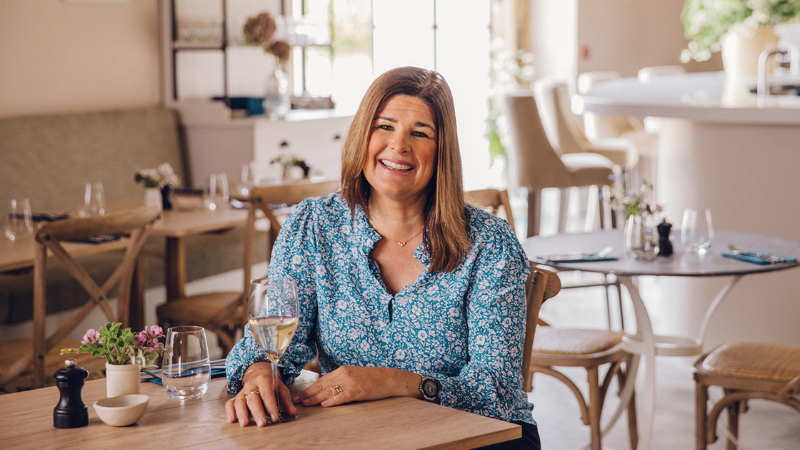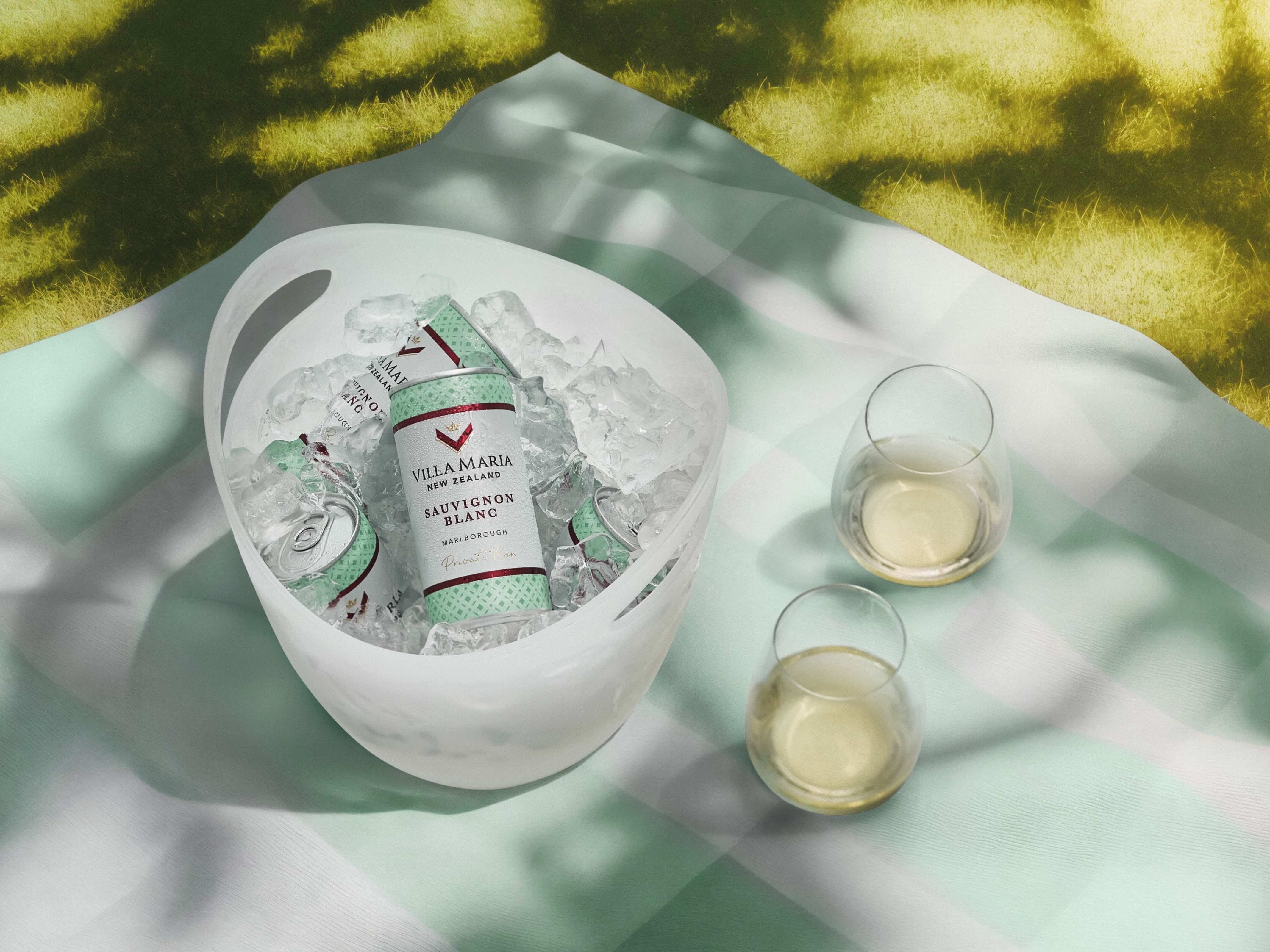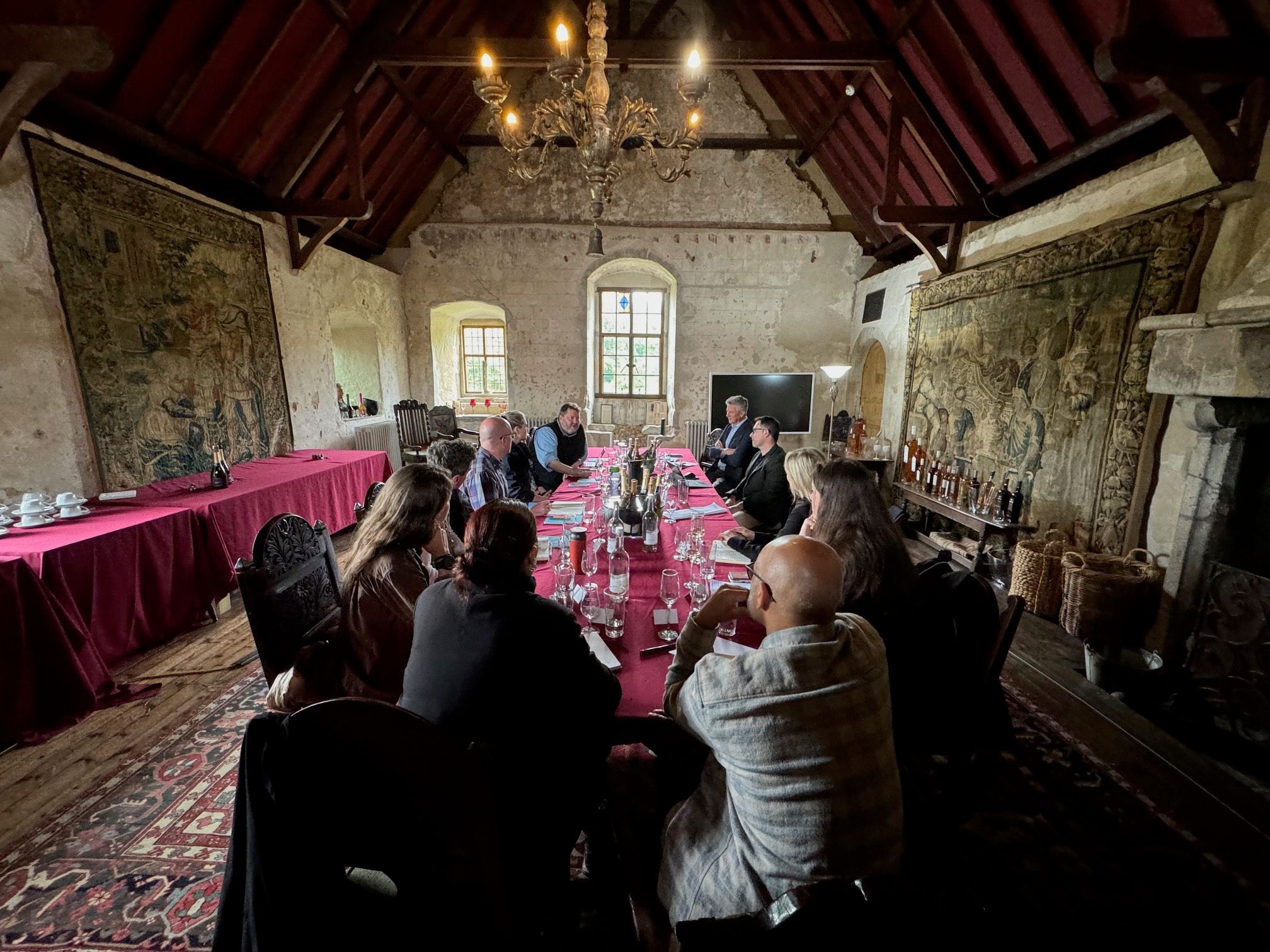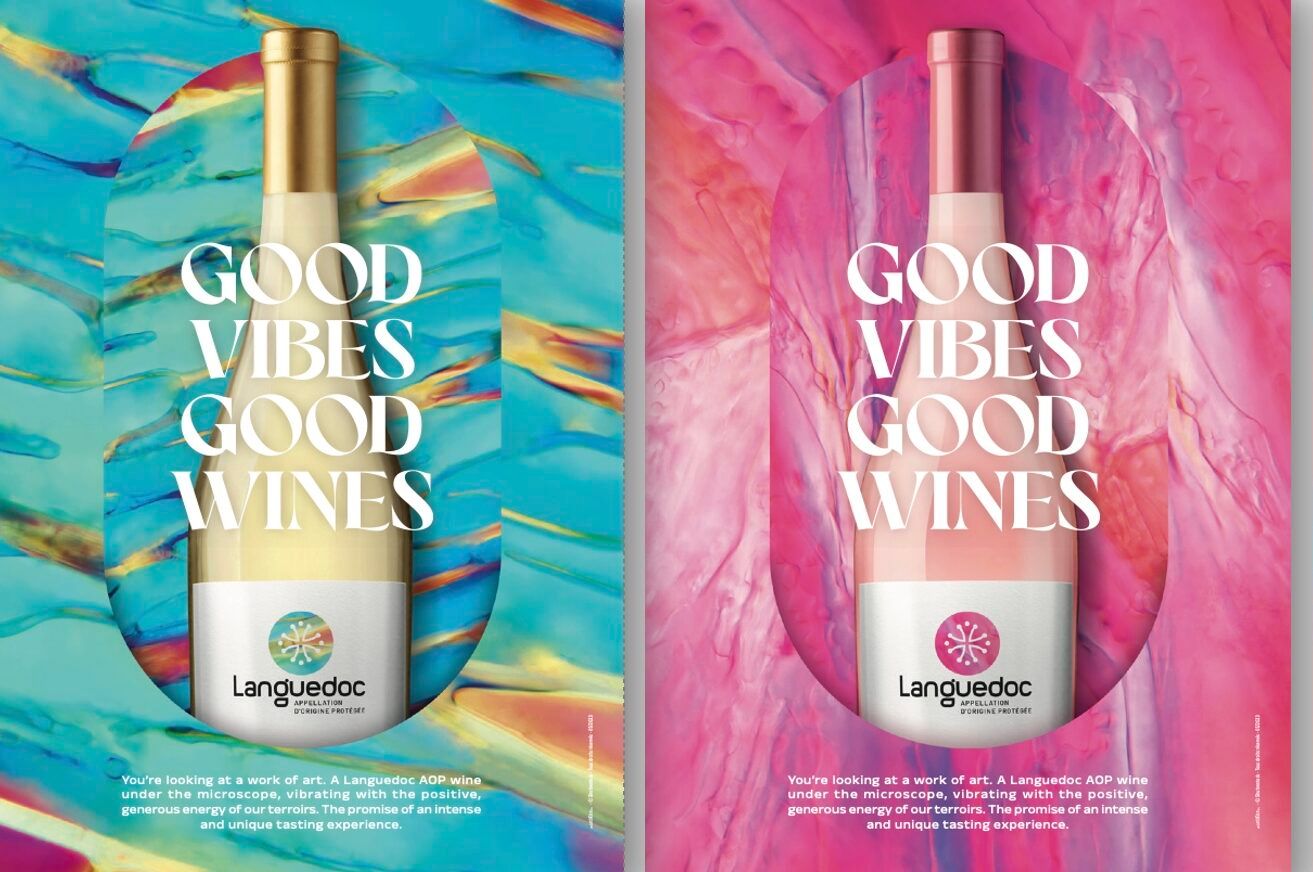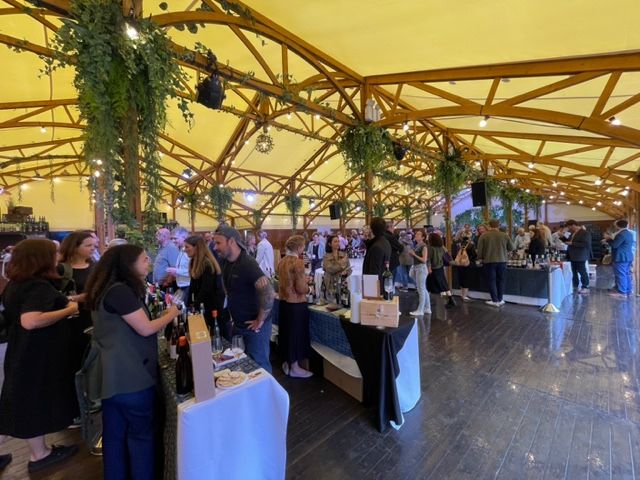You can keep up with what has happened over the last three weeks in the drinks and hospitality sectors and their response to the crisis by checking Part One of our Covid-19 Hub here.
The Buyer’s Covid-19 Hub has been set up to provide the key information that hopefully helps you keep abreast and on top of the on-going impact of Covid-19 in our industry. Although this is primarily aimed at the situation in the UK we would also like to hear share advice and thoughts from around the word. Either by emailing richardsiddle@btopenworld.com or tag us on social media at @TheBuyer11.
April 30
Consumer Confidence crisis: only 10% want to return to ‘normality’ next week
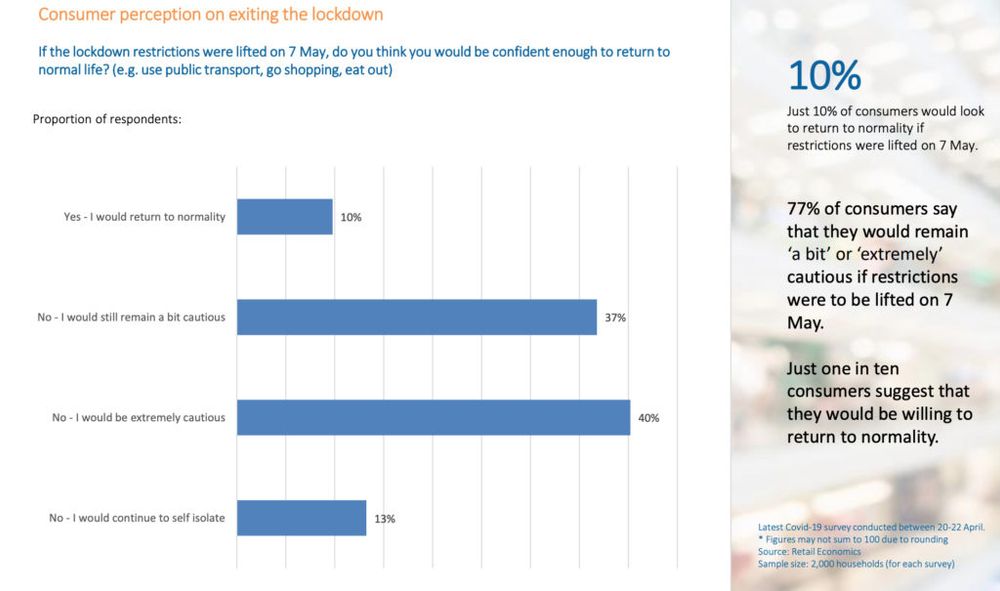
Retail Economics’ latest study of 2,000 households in the UK show there is real uncertainty and unwillingness to return to normal life too soon and that people have become accustomed to life in lockdown and will take time to go back to normal life. The analysts’ latest ‘Impact of the Coronavirus on the Cconsumer’ report clearly shows that our national habits and behaviours are changing the longer we are all collectively in lockdown. Overall if found that:
- 49% of consumers expect the lockdown to be extended by a further three weeks when the government conducts its next review on May 7.
- Only 10% of people would want to ‘return to normality’ if restrictions are lifted next week.
- 40% said that they would remain “extremely cautious” and 37% said that would remain “a bit cautious”, whilst 13% said they would remain in lockdown.
- 28% of consumers said the crisis will have a permanent impact on the way they shop in the future.
- 85% of consumers say they think Covid-19 is a ‘high’ or ‘very high’ risk to the UK, down from 88% on 29 March, but well up 36% on March 1 and 63% on March 15.
- 26% of consumers said that they had done a ‘little more’ shopping than usual to combat shortages.
Big swings in consumer attitudes
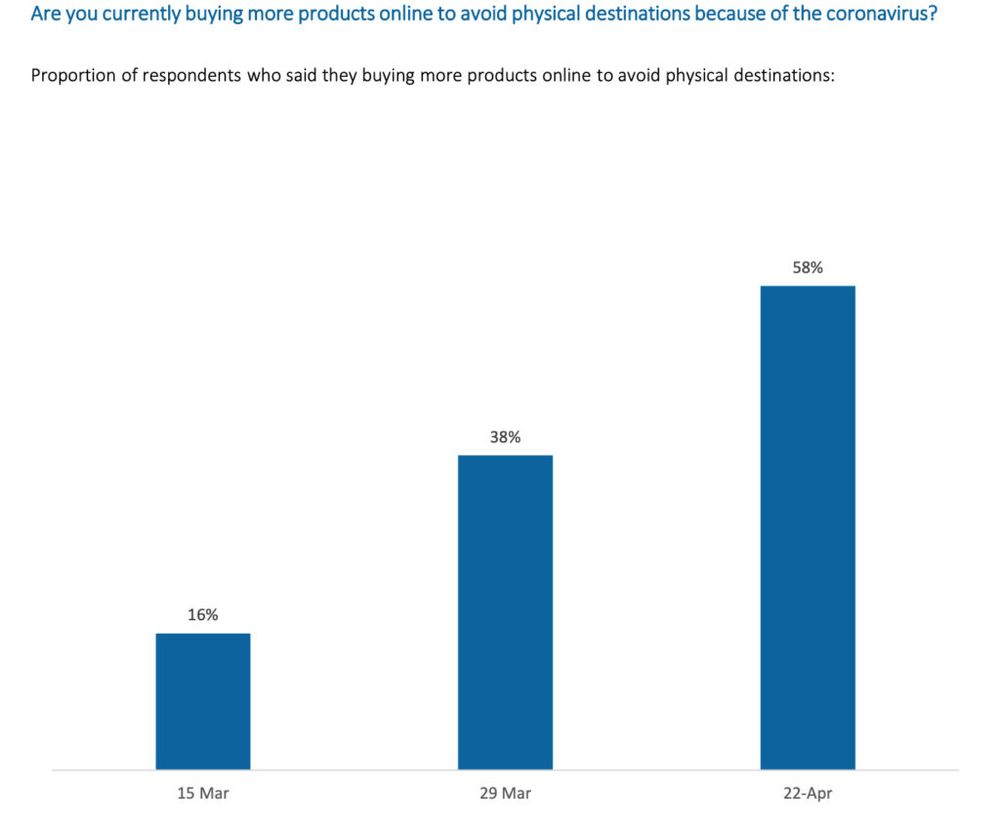
But where we are starting to see real changes in attitude is how our thinking has changed the longer the lockdown has gone. For example:
- 58% of consumers said they are buying more online to avoid visiting physical destinations when asked on April 22. But this is up from 38% when consumers were asked the same question on March 29 and a massive jump from the 16% on March 15.
- 43% of consumers said that they are shopping online for products that they had only ever previously shopped for in-store. This again shows how much online is dominating our lives as it up from 33% asked only on March 29.
- You can access the full report here.
Errazuriz Wine Photographer of the Year
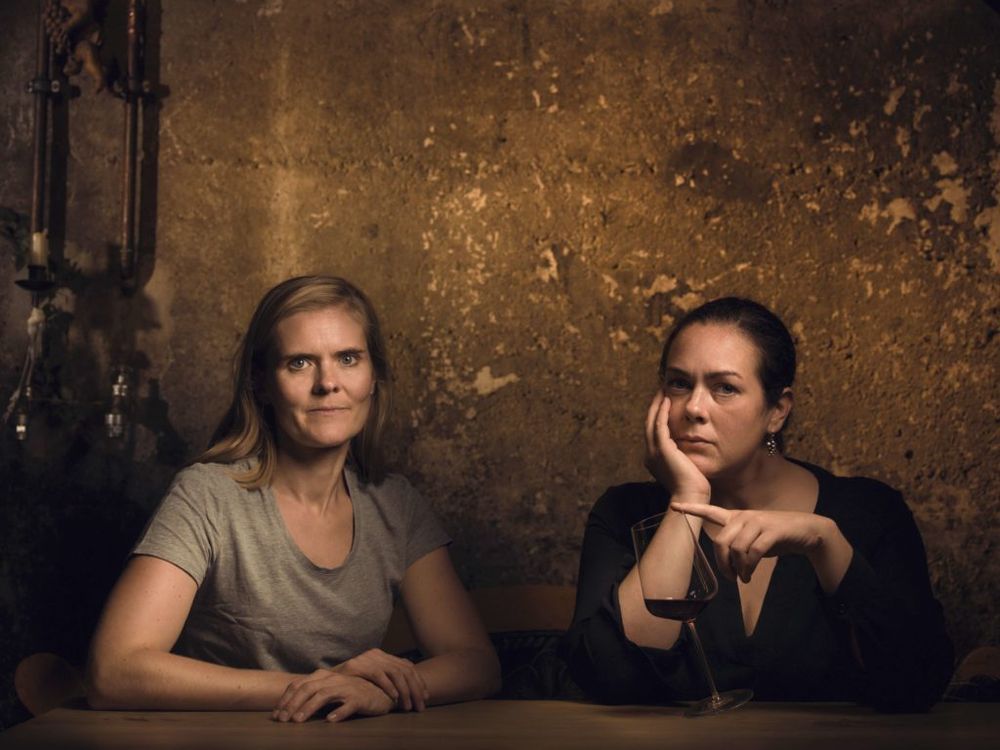
The winning photograph in the Errazuriz Wine Photographer of the Year taken by David Weimann.
A portrait of the German Pinot Noir winemakers, Meike and Dörte Näkel, from the wine estate, Meyer Näkel, by German photographer David Weimann, has won the prestigious Errazuriz Wine Photographer of the Year, a category of Pink Lady® Food Photographer of the Year 2020, the world’s leading celebration of food and wine photography and film, which had to hold its awards online due to the lockdown. Weimann had first won the People section of the category. Places was won by Thomas Hyland, USA, with A Langhe Winter and Produce was won by Patrick Desgraupes, France, with Clos Saint Patrice Sample.
Steady as we go…hospitality chiefs fearful of post- lockdown
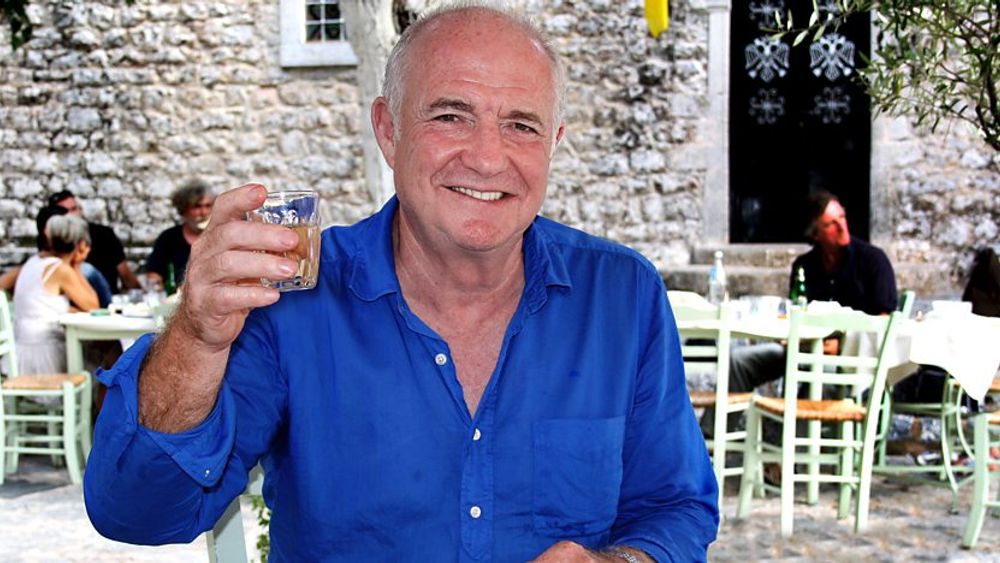
Rick Stein is one of the chefs warning the government against too quick a relaxation on lockdown of restaurants
A leading group of hospitality chiefs have written to the government warning against relaxing lockdown regulations on the on-trade sector until there is enough confidence within the public that restaurants and bars are safe places to go to.
There is a real concern the costs involved in re-opening sites and bringing staff back into the business and off furlough and support schemes will not be worth while it if they: a) have to introduce strict social distancing measures in their outlets, limiting their covers and potential income; and b) the expected low pick up and
It is understood leading chefs, including Rick Stein and Tom Kerridge, have also joined the appeal by restaurant owners to delay re-opening. Chains such as ASK, the Azzurri Group, the Casual Dining Group have reportedly said “opening the restaurant sector too early could lead to a substantial number of businesses failing, given the discrepancy between the costs they will incur and the revenues they will be able to achieve”.
The letter continues: “Unfortunately, it will not be possible for most restaurants to open in an economical way until we can ensure a critical mass of customer visits. Should we be asked to reopen too early, and pay full staff costs, rent and all of our supply costs, it will be impossible for most restaurants to operate sustainably until we are also able to return to serving customers at our normal capacity.”
The move comes as the hospitality and restaurant sector steps up its efforts to get the government to agree to extending the furlough scheme beyond the end of June, as well as agree for rents to be suspended completely for up to nine months.
The Drinks Trust hits £1m in Covid-19 support donations

Actor Ryan Reynolds is donating nearly a third of his UK profits for Aviation gin to The Drinks Trust
A combined industry effort has helped The Drinks Trust raise just over £1 million that will go a long way to helping individuals in difficulty across the drinks industry, but particularly those who have been affected by the Covid-19 crisis.
Of that £1m over £650,000 has come from individual donations and fundraising initiatives and a further £350,000 from the charity’s business partners. There have been major new donations from major drinks companies, including Pernod Ricard, and even Hollywood stars. Bruce Reynolds is donating 30% of the UK profits from his Aviation Gin brand, sold through UK distributors Proof Drinks and The Whisky Exchange.
Ross Carter, chief executive of The Drinks Trust, said: “We are so grateful to absolutely everyone who has responded so quickly at this difficult time. We hope to work with you all on an ongoing basis to ensure that we continue to provide support for all drinks industry professionals.”
The Drinks Trust has been using its funds to both support its existing 350 beneficiaries, plus many more who have been hit by the fallout from Covid-19, particularly amongst the on-trade and hospitality workers.
Its Covid-19 Emergency Grant fund has so far been able to provide 1,750 drinks trade members with a one-off financial grant of £250.
The next step in its activities will be to shortly launch an initiative based around helping “members of the drinks industry to live a constructive and healthy life in these times of uncertainty, isolation and distance from an otherwise social and community-orientated industry”.
Shaken not Broken…
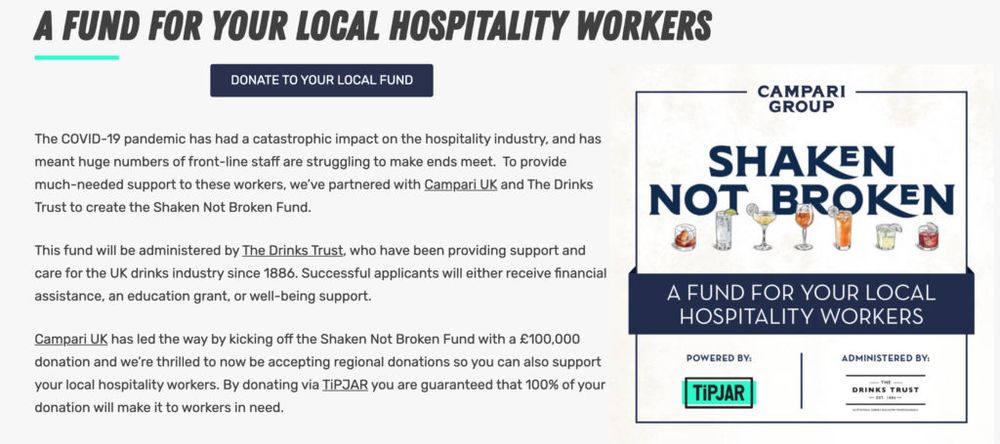
Campari UK has also teamed up with The Drinks Trust this week to create a ‘Shaken Not Broken Fund’ with an initial £100,000 donation. The scheme is being run, and powered in partnership with Tipjar – that helps manages the tronc tips system in the on-trade. People can choose to support the overall fund or can go to separate donation pages to help workers and colleagues in different parts of the country.
Brad Madigan, managing director of Campari UK, says: “We want this to be a broad-based community initiative – building a platform that allows anyone to donate to the fund. We encourage suppliers and agencies alike that are involved in the hospitality industry…to contribute a virtual tip to front-line workers who run our amazing venues and make the world’s best drinks here in the UK.”
Berkmann sets a £250k donation target for Help 4 Hospitality ecommerce site

Berkmann Wine Cellars move to direct selling with its Help 4 Hospitality website has set itself a target of raising £250,000 by August 1 to donate to The Drinks Trust. The new ecommerce platform was launched by Berkmann in its response to the Covid-19 crisis after losing its main on-trade business which it puts at around £5m a month.
The new online model offers two different services for its on-trade customers and the general consumer. Restaurants can get a discount code to send to their customer databases encouraging them to buy wine through the site. Consumers can also buy from a carefully selected range. Whatever purchases are made 12.5% of the cost is donated to The Drinks Trust and Hospitality Action.
Any hospitality outlet that would like to take part in the scheme can get a voucher by contacting h4h@berkmann.co.uk. The scheme now has over 600 hospitality outlets signed up.
You can donate and find out more here.
Covid-19: All the latest…and facts and figures
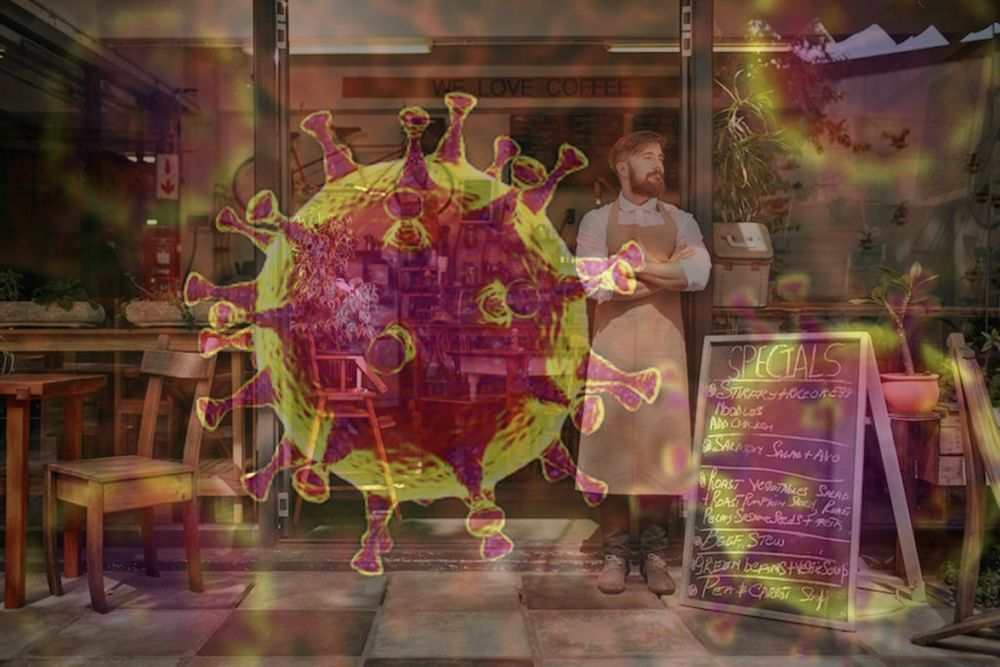
Here is our running hub of content summarising what importers, restaurant groups, producers, trade bodies and companies are doing to cope with Covid-19
Here are some top line figures from across the drinks, retail and hospitality sectors that highlight the impact Covid-19 is having and how different sectors and companies are responding.
Fullers DTC: Fullers is the latest drinks brand to announce it is setting up its own direct to consumer website to sell consumers a selection from its range of beers direct. It is selling everything from a single bottle for £1.80 through to a mini barrel for £38.
C&C Group:The owners of Bibendum and Matthew Clark, and producers of major drinks brands including Bulmers and Tennents, has confirmed it has furloughed 70% of its overall staff, with an on average 20% pay cut across the company. It says it “continues to implement a series of measures to reduce operating costs, maximise available cash flow, and maintain and strengthen the group’s liquidity position”. It says its liquidity position is around €570 million “of which €430 million (unaudited) is cash”. There will be no final dividend for 2020. It is also still looking to recruit a chief executive.
Hospitality figures: UK Hospitality has revealed that the overall UK hospitality sector saw sales decline 21.3% in the first quarter of 2020, but with the main losses coming in March when we approached and then went into national lockdown. Its annualised sales across the hospitality sector are £126.8bn, down 2.7% on the previous 12 months. The total value of the sector to the UK economy at the end of 2019 was £133.5bn.
UKHospitality chief executive Kate Nicholls said the sector at the end of December had seen year-on-year growth “running at 3.9%”. “The turnaround has been dramatic and will only get worse in the coming quarter,” she added. “A continuation of business support is the only way to avoid a bloodbath of job losses and company failures in the hospitality sector, one of the UK economy’s jewels in the crown.”
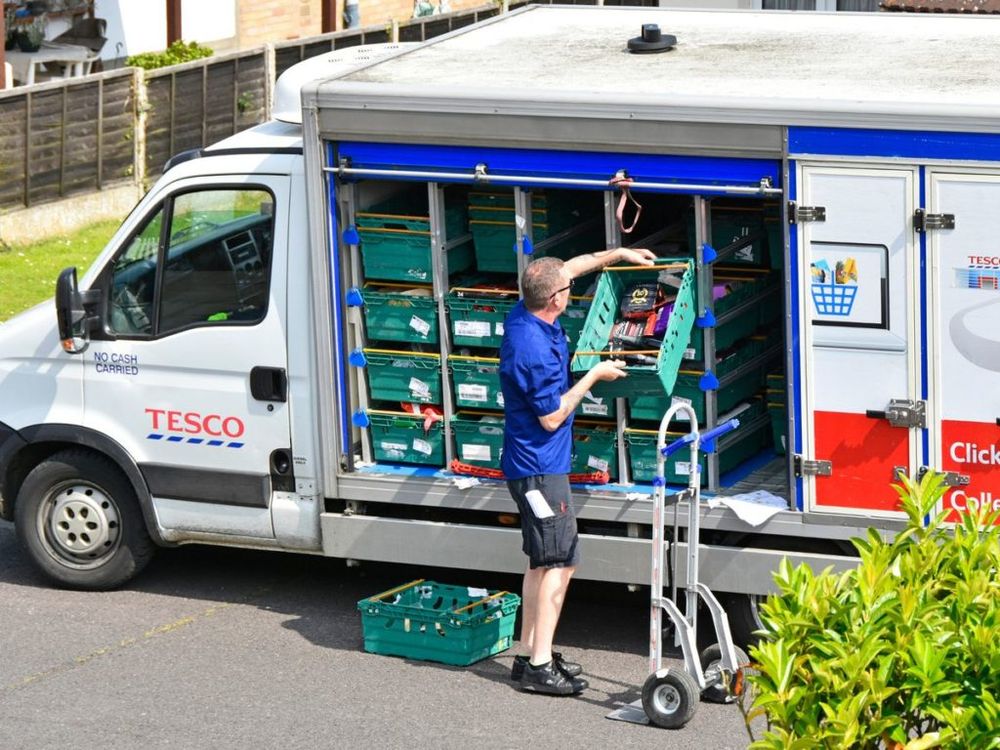
Tesco – along with all the Big 4 – grocers have been able to massively increase home delivery slots
Tesco: The UK’s biggest grocery retailer says it has fulfilled a million orders in a week, up from 590,000 before the crisis. It aims to hit 1.2m orders in a fortnight.
Online boom: Nearly a third of all consumers around the world are now spending more time shopping for food and drinks online. Global Data says 29.2% of the 5,000 consumers it polled in 11 countries are now regularly buying their groceries online and it believes it’s a “habit unlikely to fully reverse post-pandemic”.
UK Off-trade sales: Overall alcohol sales were up 31.4% in March, with supermarkets drinks sales up 10.3% in March, according to the Office for National Statistics March retail report. It means an additional £200m was spent on drink in March taking the monthly total to £1.1billion. It’s not just alcohol that is hitting record numbers. As our hair grows, so do sales of hair clippers, with online sales at their highest ever level, up 22.3%.
Grocery sales: We may not be panic buying any more but our cupboards in March were full of £10.8bn worth of grocery products, which is far more than last Christmas which would be the busiest time under normal circumstances (Nielsen).
US online sales: Nielsen says US online sales for alcohol are up by five times for the four weeks to April 28. Retail sales are also booming with beer up 17.7% for the same period.
Concha y Toro Covid-19 testing: Chilean producer Concha y Toro has had its Centre for Research and Innovation certified so that it can carry out Covid-19 testing. It has also donated 50,000 litres of hand sanitiser to Chilean health authorities.
Alone at home…who you gonna call? A smart speaker
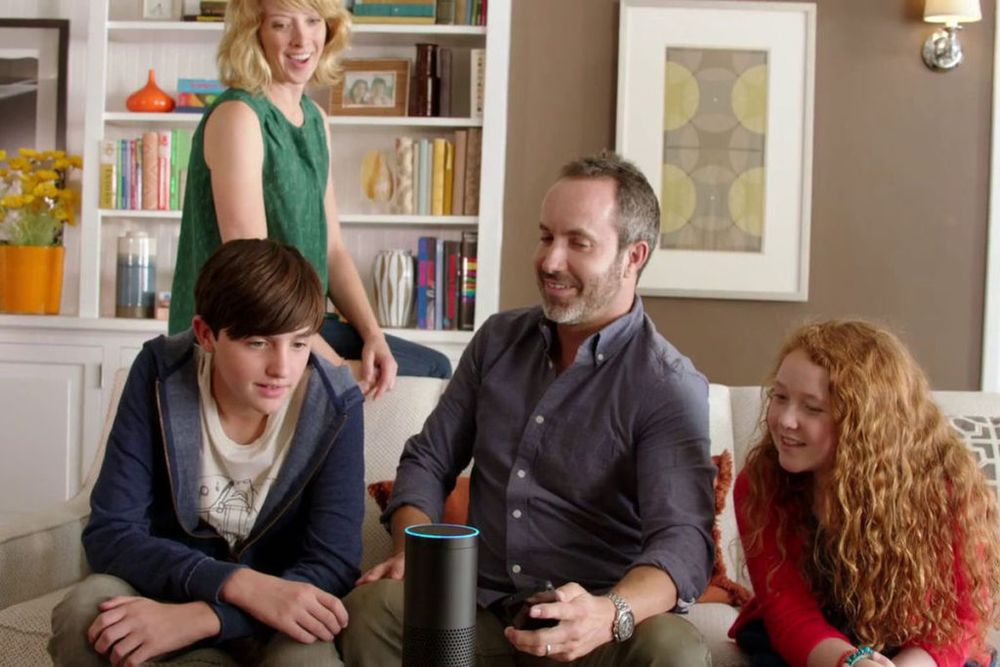
“Alexa families” are popping up all over the world
The latest figures from the US show how quickly households are turning to smart speakers and voice assistants, like Amazon’s Alex and Echo. Voicebot, which tracks the smart economy, now claims 34.4% of US households now have voice assistant, covering 87.7m adults, up 32% in the last year.
The last 12 months saw an additional 21.3m new users and the overall numbers are 85% higher than January 2018 when 26% of US families had a smart voice assistant. The figures confirm smart speakers have been the “most vital new consumer electronic device segment over the past five years,” claims Voicebot.
April 28
WSTA: new goverment-backed loans don’t go far enough

The new government-backed loan schemes that on the face of it allow small businesses to apply for 100% backed loans, amounting to 25% of turnover up to £50,000, are all very good, but they only apply to the loans that banks have granted, which, to date, has been a small percentage of the overall claims
The Wine & Spirit Trade Association said the new move was “welcome” and “may support the continued survival of businesses across the wine and spirit industry” but they are still loans that will need to be paid back. .”A ceiling of £50,000 is low and the government could have gone further,” said the WSTA.
“The burden of additional debt is particularly unattractive to businesses in the supply chain who are yet to enjoy the government support afforded to other hospitality businesses in the form of grants, but for whom, just like pubs, bars and restaurants, sales have been reduced to zero practically overnight.”
The WSTA has re-iterated its stance for wine and drinks businesses to be treated in the same way as “other parts of the hospitality sector”. “It may well be the case that these businesses will be the last to be permitted to re-open, and even when they are allowed to begin trading again it is likely they will still be forced to operate at reduced capacity or be tightly restricted. This impact will be felt just as much by businesses in the supply chain,” it added. “The government must extend business rates exemption and availability of government grants to businesses in the on-trade supply chain, by broadening its definition of hospitality to include them. This would represent a much more supportive measure. The government must recognise that persisting with such a narrow definition of hospitality is harmful – there will be no hospitality sector without the businesses that keep pubs, bars and restaurants stocked.”
The British Beer & Pub Association has said the ‘Bounce Back Loan’ scheme also does not support all pubs. “The measures announced today won’t help the vast majority of pubs, who at present are struggling to get access to the Business Interruption Loan Scheme,” it stressed. Before adding: “For many pubs, taking on debt in the form of a loan isn’t even a viable option. For those that do take out loans, it’s imperative they are given more time to pay them back to boost their chances of remaining open after COVID-19”.
Join Katie Jones on her morning walk in the vines
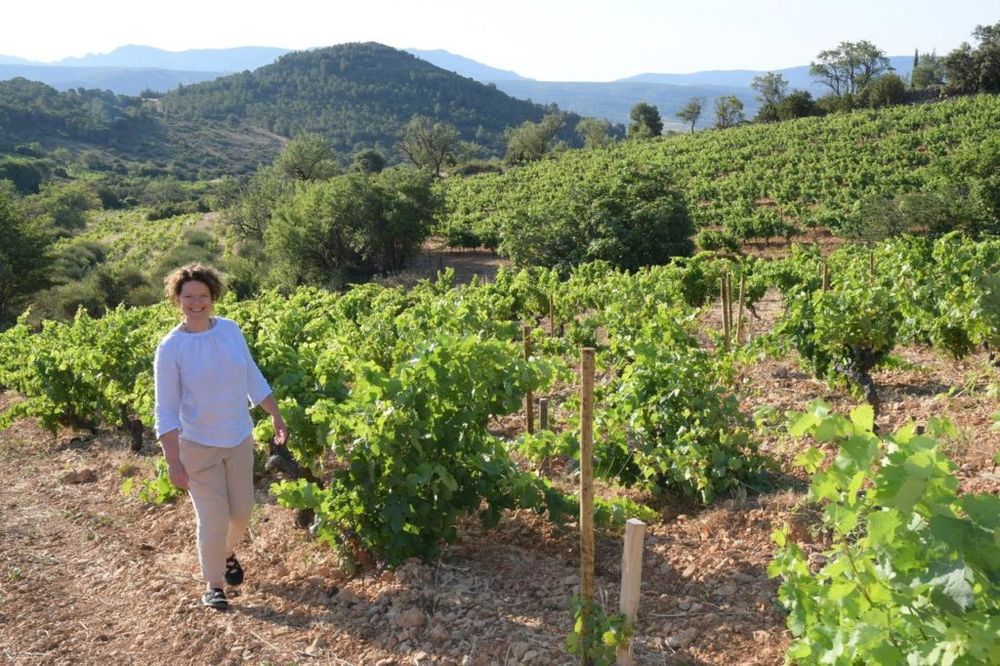
Join Katie Jones on an Instagram walk through her vines each morning at 7.30am in the UK
You might not be able to physically join Katie Jones on her daily walk through the vineyards of her Domaine Jones in Tuchan, Aude in the south of France, but you can do visually as she has started sharing her morning walk on Instagram (@DomaineJones). If you happen to have a running machine in the house you can always pop on and turn it to walking speed and join her. It ’s just one of the ways she is looking to connect with her customers during lockdown, which has also included a series of online tastings. Here she explains what’s keep herself motivated during these times.
Why are you doing with these morning Instagram walks?
I have started doing a vineyard ramble at 7.30 UK time. It lasts just 15 minutes and takes viewers on a gentle stroll through a different vineyard everyday talking about the vines, the soil, the view. My parents were meant to be on holiday with me at the moment in Tuchan and every day we would have visited a different vineyard so I started doing live videos for my parents on a Saturday morning and then thought that perhaps other people would enjoy it too.
My wines are so much about the terroir and the area that they come from that to be able to share this with people is amazing. The fact it’s live just adds even more to the excitement! Hopefully people can also understand better when I say that my wines take on the herbal character from the wild herbs in the garrigue landscape around the vines – I can actually show these wild herbs to viewers.
As Domaine Jones is made up of 14 different small parcels of old vines I have a varied selection of vineyards to choose from and the scenery is just stunning. In all of them. There are an awful lot of live tastings and chats at the moment and I wanted to come at it from a different angle – a sort of ‘farming today’ from my vineyards that could be enjoyed at all levels.
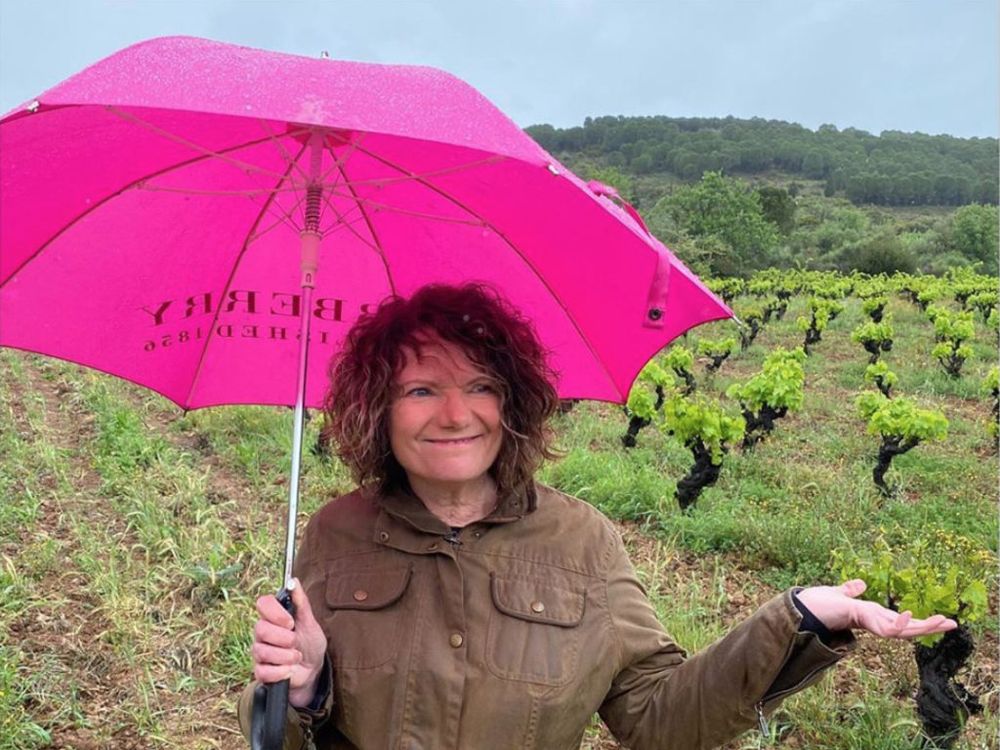
It’s not all glamor out in the vines
How has the lockdown affected you and the winery?
The vines have definitely not been affected and are continuing to grow at an amazing speed. So there is loads to do in the vineyards and we have been able to carry on working. We only have three employees, who each work on different vineyards, so there is no chance of contact. As I manage the sales at Domaine Jones I have not been able to travel to see my customers and do tastings, so I have been traveling using social media and doing live zoom tastings instead.
I am trying to maintain contact and give all of my customers a different more in-depth experience of Domaine Jones. We have quite a varied distribution network in different countries which has helped to limit the risk. I worry that there may be a knock on effect over the coming months and I want to be ready to hit the ground running when things get back to ‘normal’ and I definitely don’t want anybody to have forgotten my wines.
Are you still able to ship and move and sell your wines?
Yes, we have been open for business throughout the whole lock down period and transporters have been able to come in and collect wines. We have shipped to the UK, Belgium, Holland without any problem. We also launched a limited release ‘To Help See you Through’ case of 12 bottles of wine as an invitation to join me and my husband forthree zoom sessions so that customers could learn more about our wines and our Domaine.
We tasted the 5 different wines in the case together so that they got an idea of the types of wines we produce and they can then look out for them online or in their local wine shop.
Are you spending more time in the vineyards?
Yes, I am and I’m loving it! It’s how I imagined running a vineyard would be when we set up 10 years ago and before the hard reality of having to sell the wine hit in. I am sure it is good for the wines as people will have a much better understanding of them. The vines seem pretty happy to see me every morning at 8.30pm (in France) too, although my husband has said that next time I could actually do some work instead of just ‘rambling’ on!
Honest Grapes debate: time for Bordeaux to rethink En Primeur
Nearly 60% of wine experts think Bordeaux is becoming a less important part of the fine wine scene, and close to 70% want to see En Primeur changed.
Yes, you did read that right, at least according to Honest Grapes survey of 30 trade experts and 100 of its wine collectors. It’s clear their Bordeaux client base want to see wholesale changes taking place in Bordeaux regardless of the Covid-19 situation.
The subject of En Primeur was the backdrop to an online debate that Honest Grapes held last week (click on link above to watch) with a panel of industry experts including: Gavin Quinney, owner of Bordeaux’s Chateau Bauduc, Nick Martin, director of fine wine trading exchange, Wine Owners, and Drinks Business’ Rupert Milar. Quinney said he has heard directly from Ronan Laborde, president of the Union des Grands Crus, that it remains reluctant to alter the existing En Primeur system as “it is in the DNA of the Bordeaux Grands Crus”.
Momentum, though, is building for change with Honest Grapes claiming “quality and value” are the two main driving forces to moving the tastings by a year. As scores, reviews and most of all prices change so much from year to year, collectors and investors are losing faith in En Primeur, said the panel.
Nick Martin said: “The Bordelais need to figure out what En Primeur stands for. In the past it was very clear, the négociants funded the new vintage at a discount market value and they passed that discount on to the consumer and the system worked well. We are now in a world where price is used to justify expensive property purchases and land values are correlated to release prices.”
The panel felt this was a great opportunity to revamp the whole system. As Tom Harrow, Honest Grapes wine director, pointed out Chateau Latour has already given up with the current system, having only just released its 2012 Grand Vin in March.
- You can download a full report on how Honest Grape’s Bordeaux research here.
Gigglewater looks to build up UK & international ambassador network
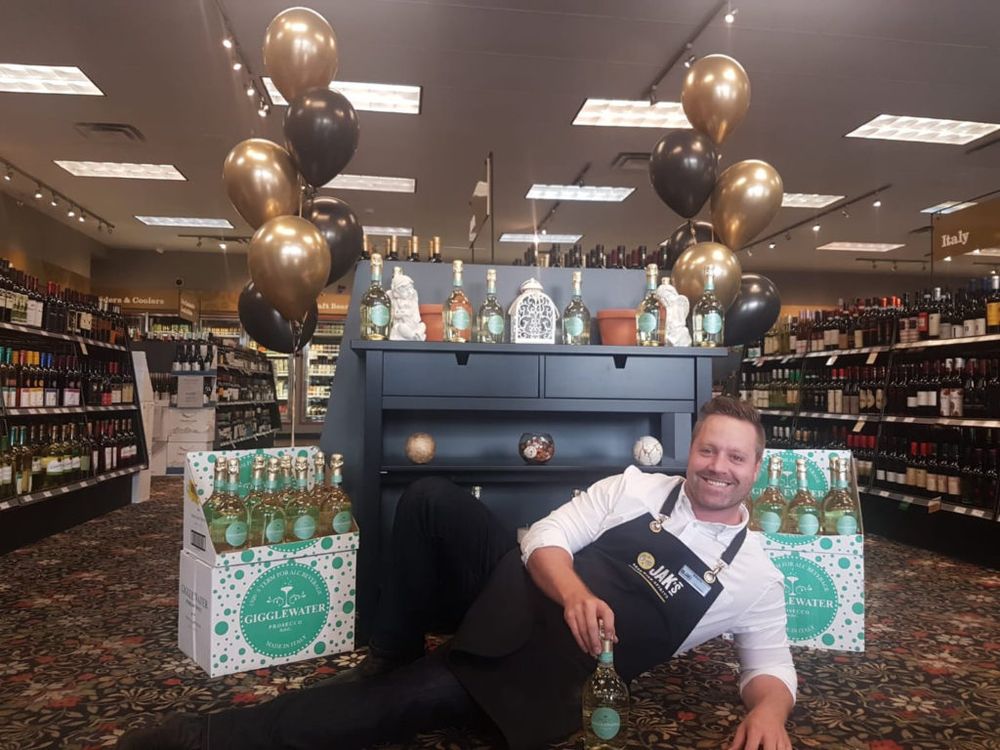
How far will you go to be a fan of Gigglewater
Catherine Monahan is making the most of the lockdown to sign up an international network of social media ambassadors for her Gigglewater Prosecco brand. It is inviting women aged between 25-55 to apply to for 15 UK brand ambassador roles as part of its #DiscoverYou #Gigglesathome online campaign which starts on May 1. The chosen ambassadors will be each sent a case of six bottles of Gigglewater and a food and wine pairing programme, devised by chief, Raul Crespo, and then encouraged to share their dishes on social media with their glasses of Gigglewater.
Monahan is starting the initiative in the UK, but then hopes to build up a network of ambassadors in Canada, Ibiza, the US, South Africa, Dubai, and other major markets down the line. She says she hopes it’s a good way to raise the brand’s profile on social media, but also keep on the front foot in terms of trade relations. She hopes to be able to sign up “at least 150 UK brand ambassadors doing online tastings and different events by the middle of the summer”.
“We want to show potential new retailers that if they list us, we can support them with wine sales online and in-store and grow the brand without just relying on them and in-store promotions. Our brand ambassadors will be hosting parties and encouraging their friends to buy Gigglewater and try the food pairings. Hopefully it will be like a domino effect in terms of brand growth and awareness. Plus encouraging them to share all this across different social media platforms
She says that overall Gigglewater’s sales are still moving international but it’s “slower as markets, like Canada, rely on indies and hotels, restaurants and bars”. “But pushing the brand online and creating these brand ambassadors also helps us with direct to consumer marketing and sales, so we are really pushing on that in the UK and Ibiza as well”.
New Zealand Winegrowers Webinar Masters series
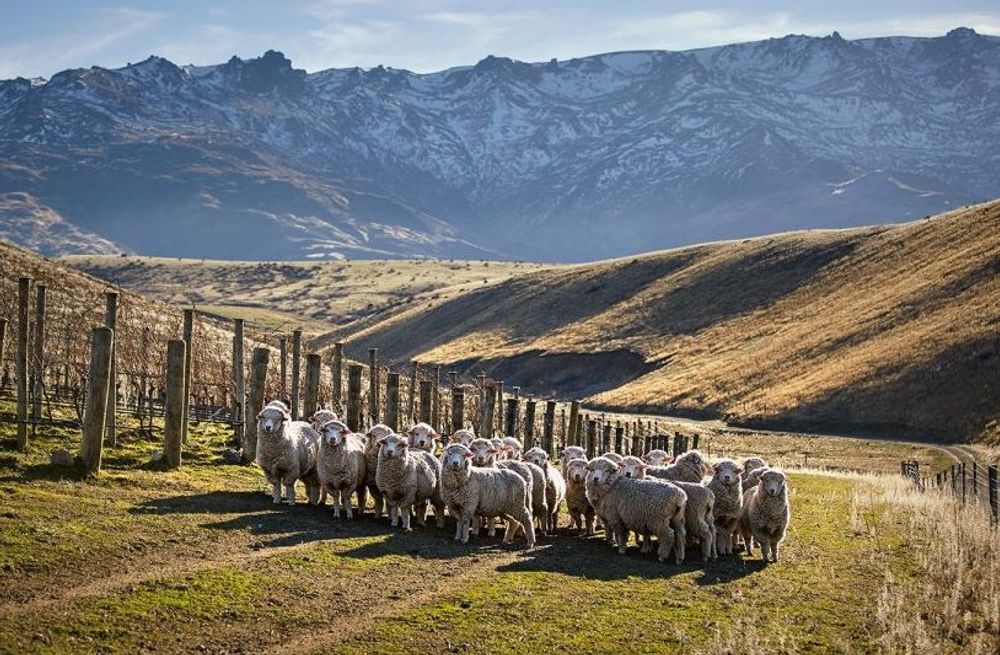
“I can see the sheep from here…” Perhaps not but you will be able to hear MWs and MSs talking all about New Zealand wine in a series of webinars through the summer
New Zealand Winegrowers has been busy pulling together an A list of MWS and Master Sommeliers to help host a monthly series of what it is calling “conversational webinars” on key wine themes –starting with Sauvignon Blanc on April 29. It has four lined up between now and September starting with:
Session One April 29
Sauvignon Blanc – Get Past the Gooseberry, Let’s Talk About the Wine with Ronan Sayburn MS (UK), Jane Skilton MW (New Zealand) and David Keck MS (US) and John Szabo MS (Canada). It takes place in US West Coast 12-1pm; East Coast 3-4pm;and UK 8-9pm. Register here to take part
Session 2, May 27: Chardonnay & Pinot Noir at the Other 45th Parallel with John Szabo MS, Cameron DouglasMS (New Zealand), Ronan Sayburn MS (UK), and David Keck MS (US). North America West Coast 12-1pm; East Coast 3-4pm; andUK 8-9pm.
Session 3, June 24: New Zealand Wine in a Post-Covid World with David Keck MS, Emma Jenkins MW (New Zealand), Ronan Sayburn MS (UK) and John Szabo MS (Canada). North America West Coast 12-1pm; East Coast 3-4pm; and UK 8-9pm.
Session 4, September 23: Organic Wine – Not just for Hipsters Anymore with Stephen Wong MW (NZ), Ronan Sayburn MS (UK), David Keck MS (US) and John Szabo MS (Canada). North America West Coast 12-1pm; East Coast 3-4pm; and UK 8-9pm.
Registration details for Sessions 2-4 will be released down the line.
- New Zealand is also celebrating ‘International Sauvignon Blanc Day’ on May 1. You can join and drink and share your favourite Kiwi Sauvignon Blanc on social media using #NZWine and #SauvBlancDay. And make sure you follow @nzwinegrowers on Insagram and Twitter @nzwine.
April 27
Kantar: Millennials and GenZ trends during lockdown

Younger consumers are more interested in keeping fit and staying healthy than having a drink
Over half of millennials (52%) and 49% of GenZ consumers say they have seen a drop in their household income since the start of the Covid-19 crisis, according to the third tranche of Kantar’s global Covid-19 Barometer.
It has found that the crisis is impacting younger consumers more than other demographic groups, both financially and mentally.
Whilst drinks sales might be booming in the off-trade, millennials are preferring to go for a “drysolation” with 26% avoiding alcohol (vs 21% overall).
Over a quarter (26%) of those polled aged 18-34 age group expect to be hit even more in the future – more than any other generation. Kantar’s research covers 50 markets across the world. Its latest findings are:
- Social interaction has been the hardest to give up for 41% of millennials and gene, followed by freedom and leaving the house. But when compared to older generations, 18-34 year olds are engaging more intensely with a range coping strategies to manage their mental health and wellbeing:
- 53% of GenZ and 48% of millennials are exercising more (vs 43% overall).
- 53% of GenZ and 45% of millennials are sleeping more (vs 41% overall).
- 23% of GenZ and 22% of millennials are meditating (vs 18% overall).
- 18% of GenZ and 20% of millennials are avoiding news (vs 17% overall).
- 40% of GenZ and 38% of millennials say they are focusing on their personal development, compared to a global average of 29%
- 57% of GenZ and 63% of millennials are trying new recipes (vs 51% overall).
Perhaps not surprisingly younger age groups are also spending more time online and on social media.
- Online video has seen the greatest increase, with 72% of GenZ and 69% of millennials saying they use it more (vs 52% overall).
- YouTube has seen the greatest increase, with 71% of GenZ and 65% of millennials using the channel more.
- TikTok usage up by a third (33%) among GenZ and 27% among millennials.
- 68% of 18-34 year olds are spending more time on social channels.
- Instagram usage is up 63% amongst GenZ and 49% for millennials.
- 22% of GenZ and 23% of millennials feel brands should set an example and donate money to good causes (vs 18% overall).
- Half of GenZ and 46% of millennials say that companies should make donations to support the purchase of masks and sanitisers for hospitals (vs 44% overall).
- 39% of GenZ and 33% of millennials believe that companies should make donations to support scientific research (vs 32% overall).
Game changing shifts in fine wine
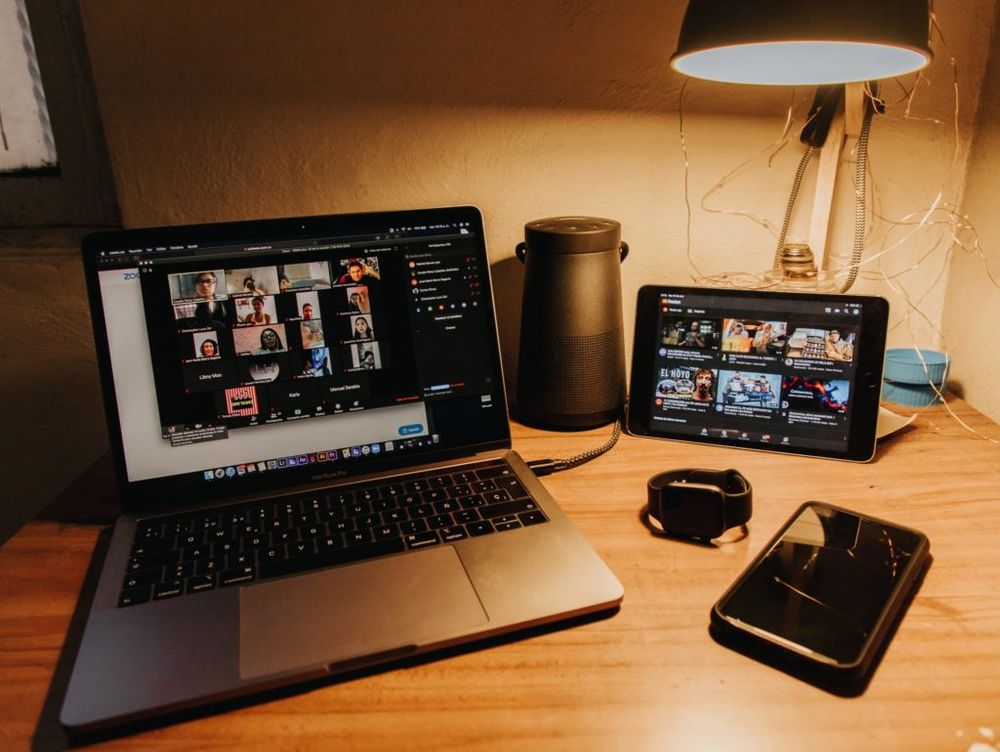
Areni, the global research institute for fine wine, has identified a series of “game-changing shifts” in the way Covid-19 is helping to fast track major changes in the way what it calls the “Fine Wine Ecosystem” works.
Digitalisation of the conversation
As we are all now having to live our lives and work online it follows that we are all now talking about wine far more online than ever before.
As Areni explains: “The first few weeks of lockdown have been very similar across all countries and industries, with a shared feeling of chaos that left most of us groggy and stressed. We all went to Zoom and videoconference tools with apprehension, yet powered by the need to learn and adapt.”
First going from analogue to digital, which so far seems to have been a big success considering the number of online tastings, debates, and webinars taking place.
It has made wine a lot easier to talk about and taken away some of the audience’s fear, says Areni. “We are all in the same boat” is very much the feeling that is coming from consumers and merchants and there is a closer connections between the two.
There is already very much a feeling that this new online way of talking is here to stay.
Digitalisation of Commerce
The boom in online spending and home delivery around the world shows how fast consumers have accepted that ecommerce is now the way to go if they want to carry on getting the goods and services they are used to. “Wineries, merchants and retailers that already operated online with a tested delivery systems have flourished everywhere,” says Areni. But whilst it is “one small step for some” it’s “one giant leap for most,” it adds.

Online shopping has long been seen as the next big thing, and the situation has now made that a reality. The challenge will be for more luxury brands in how they “curate the same feeling of exclusivity and frictionless experience online that what they normally provide in real life”.
The challenge going forward will be how good you are using and analysing what online consumer data you now have access to. Producers will, for example, also have no choice but to think about lighter packaging.
Going direct to consumer
Going DTC is nothing new, but it has come into its own during this crisis. “The constriction of its distribution channels is deeply affecting the Fine Wine Ecosystem, and DTC has in many situations been a life-saver, with quick changes in regulations in countries like the US to facilitate it,” says Areni.
It reports one of its members as saying “as of this week and for the long-run, we want to go direct for 80% of our sales (we currently do 40%). The remaining 20% will be for carefully curated on-premise internationally that we see surviving the crisis”.
But Areni carries this warning from one of its members: “Small brands should be extremely careful when pivoting to online direct-to-consumer sales. Competition is fierce, and e-commerce requires both skills and time that most don’t have internally.”
Consumers will be reluctant to go back to their old ways

Retail Economics is the latest research body to claim the crisis has changed consumers for the long term and that it will take them some time to return to their former habits when the lockdown ends. It reports that only 10% of consumers will resume spending and travelling as they had before the pandemic struck. People will be reluctant to use public transport and to eat out. Crowded public venues may be a no-no for some time, it says.
The findings support the research in CGA and The Buyer’s first Covid-19 bulletin that reveals that 16% of consumers are missing being able to eat out in a restaurant. Only 9% are missing being able to drink out in a bar or pub.
People’s Choice Wine Awards Lockdown Diaries
The People’s Choice Wine Awards is looking to share some fun videos on its new Lockdown Diaries Youtube site to help put a smile on our faces. So far we have The Wine Society’s Ewan Murray and his lockdown take on Simon & Garfunkel’s classic with a twist – Housebound. Then there is this one from comedian Steve Royle who helped host this year’s awards with great success thanks to his mixture of jokes and juggling act – little did we know at the time that it was actually part of his rehearsals for his appearance on ITV’s Britain’s Got Talent. Here he explains what a comedian gets up to lockdown and why doing a bit of DIY is a bit like a wine tasting-ish.
Janet Harrison, founder of the PCWA, is looking for people in the trade to share their ideas and videos as well so if you have anything you would like her to post up in her Lockdown Diaries then contact her at janet@peopleschoicewineawards.
What we can learn from Allbirds omnichannel approach to retailing online and in-store
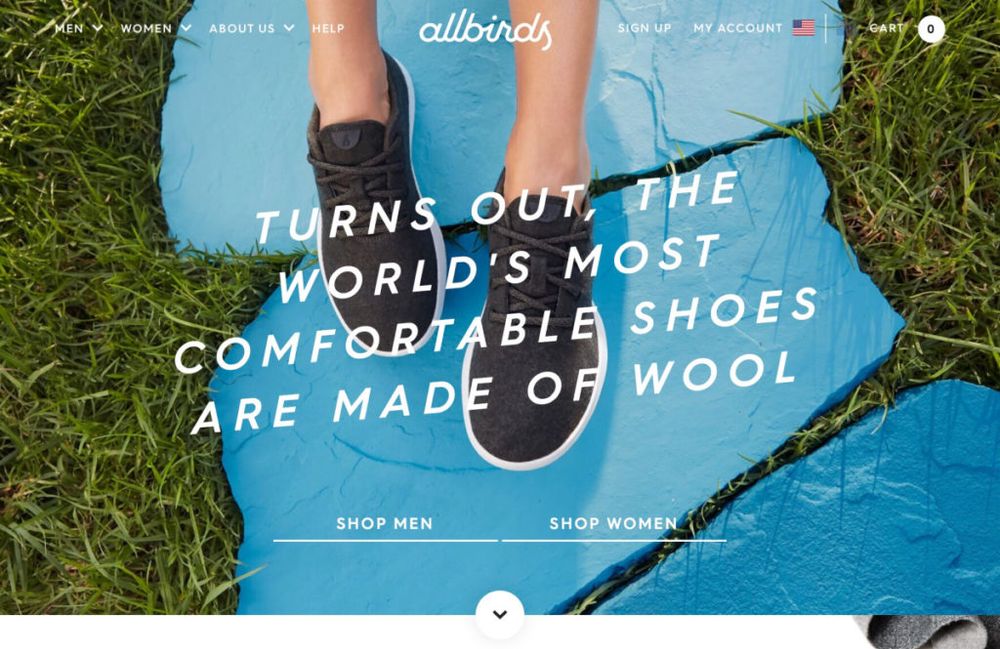
Allbirds are setting the pace with DTC and direct marketing
Erick Haskell, international president at Allbirds, says it has moved quickly to use technology even more to engage with its consumers during this time. Whilst its shops have been closed for customers it has been able to still use them in giving its online customers an in-store experience.
It has introduced video chat lines for its customer services teams in key cities, like Shanghai. So when a customer calls in and asks for advice about what the shoes they want to look like when you are wearing them, they can be hooked up to a sales assistant working in a store who can show them different styles and colours. An option they could not offer when the stores were full of customers. Haskell says he hopes to able to continue the service post-lockdown.
Allbirds shoes have proved particularly popular amongst front line health workers during the crisis. So much so that Allbirds has been shipping extra stock direct to key hospitals in the UK and the US to give to its staff for free. It is now running a “buy-one-give-one” scheme where customers can help Allbirds donate further shoes to those in the health service. It has already been able to give away over $1 million worth of shoes to healthcare workers globally.
Haskell urges all brands to pick up the immediate trends coming out of China where consumers are even more focused on families and health than they were before.
He also says an omnichannel strategy has to be the way forward. “Consumers want to deal with a brand in a holistic way. They want to be able to recognise the brand across multiple channels,” he explains.
“E-commerce has been critically important for us, and being able to fulfil from our retail spaces was something that many brands were not able to do seamlessly. In this world, where we can be struck by crises – it can be a health crisis or a financial crisis – keeping that flexibility and ability to work across channels is just so critical.”
April 24
New York Times: Extract from US restaurateur on what it’s like to close her restaurant Prune after 20 years
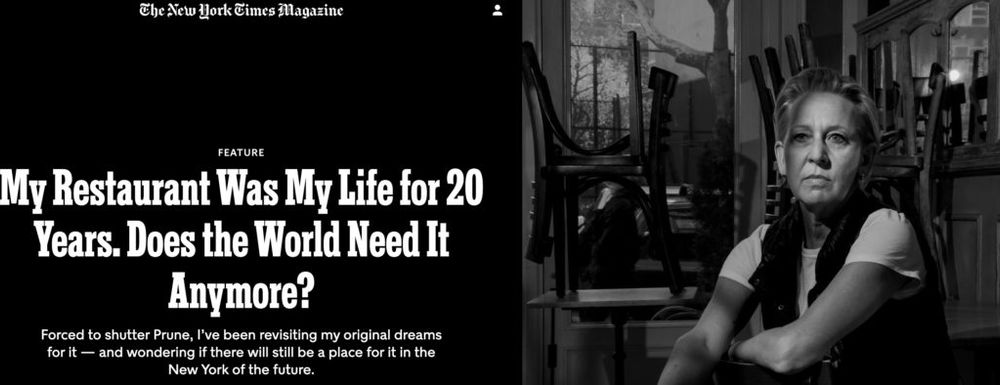
What it’s really like to have to close the doors on a restaurant that has been your life for 20 years
The one thing that will bond us all when we come through the Covid-19 lockdown is we will all have our own personal story to tell. Our own experience that we can all share and learn from. Here’s a wonderful piece of writing that truly captures what it is like for an independent restaurant owner to have to close their doors and lay off all their staff. It’s short extracts from a long piece in the New York Times by Gabrielle Hamilton, owner and chef at Prune in New York. Please, when you can, read the full article.
“In the night before I laid off all 30 of my employees, I dreamed that my two children had perished, buried alive in dirt, while I dug in the wrong place, just five feet away from where they were actually smothered. I turned and spotted the royal blue heel of my youngest’s socked foot poking out of the black soil only after it was too late…
“Ten days of being waterboarded by the news, by tweets, by friends, by my waiters…After a couple of weeks of watching the daily sales dwindle — a $12,141 Saturday to a $4,188 Monday to a $2,093 Thursday — it was a relief to decide to pull the parachute cord. I didn’t want to have waited too long, didn’t want to crash into the trees. Our sous chef FaceTimed in, as did our lead line cook, while nearly everyone else gathered in the dining room. I looked everybody in the eye and said, “I’ve decided not to wait to see what will happen; I encourage you to call first thing in the morning for unemployment, and you have a week’s paycheck from me coming…
“I had spent 20 years in this place, beginning when I was a grad student fresh out of school, through marriage and children and divorce and remarriage, with funerals and first dates in between; I knew its walls and light switches and faucets as well I knew my own body. It was dark outside when Ashley and I finally rolled down the gates and walked home.
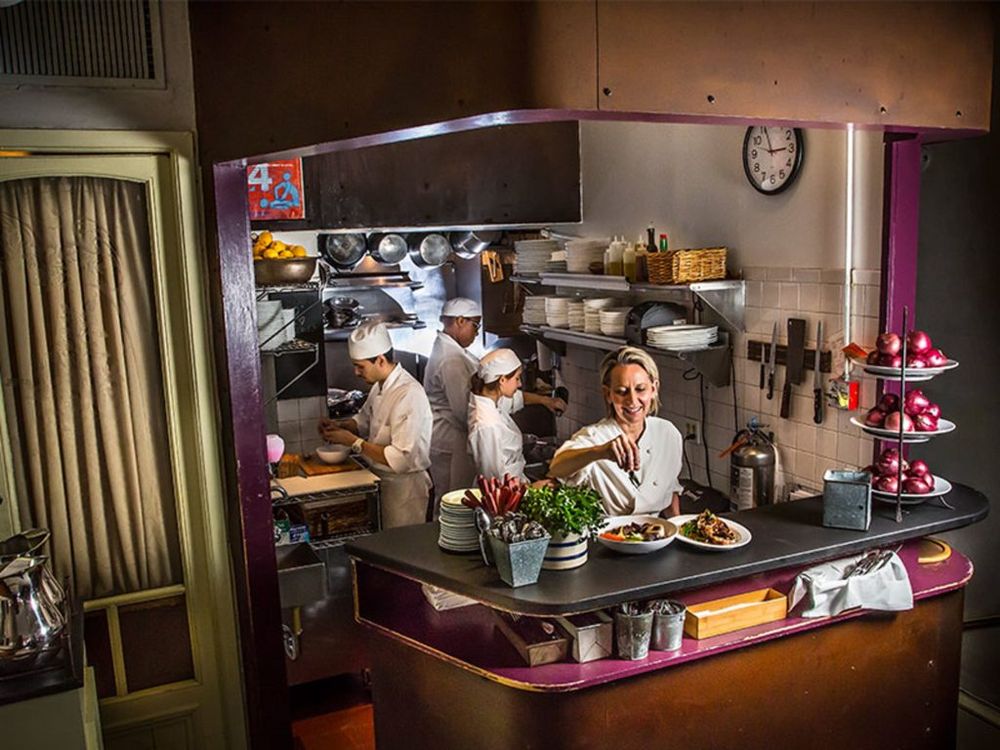
Gabrielle Hamilton hopes to be able to bring Prune back after the lockdown
“But the very first time you cut a payroll check, you understand quite bluntly that, poetic notions aside, you are running a business. And that crew of knuckleheads you adore are counting on you for their livelihood…
“It’s no mystery why this prolonged isolation has made me find the tiny 24-square-inch tables that I’ve been cramming my food and my customers into for 20 years suddenly repellent. I want round tables, big tables, six-people tables, eight-tops…
“I have been shuttered before. With no help from the government, Prune has survived 9/11, the blackout, Hurricane Sandy, the recession, months of a city water-main replacement, online reservations systems — you still have to call us on the telephone, and we still use a pencil and paper to take reservations! We’ve survived the tyranny of convenience culture and the invasion of Caviar, Seamless and Grubhub. So I’m going to let the restaurant sleep, like the beauty she is, shallow breathing, dormant. Bills unpaid. And see what she looks like when she wakes up — so well rested, young all over again, in a city that may no longer recognize her, want her or need her.”
Tim Atkin MW to host Instagram winemaker series
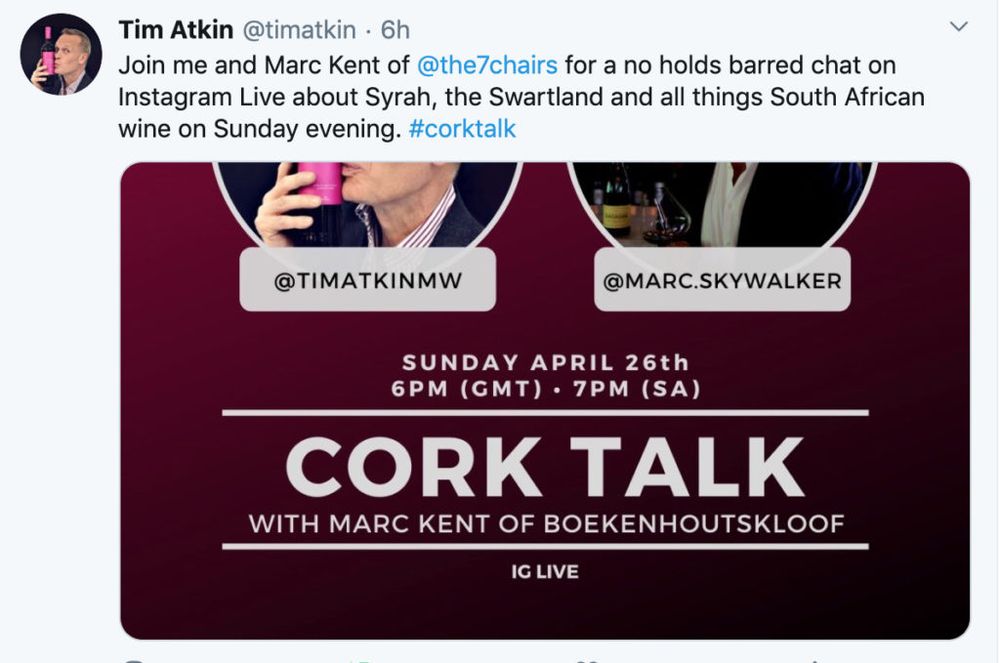
Wine journalist, Tim Atkin MW, is the latest high profile wine critic to turn his talents to hosting interviews on Instagram as he starts a new series on Sunday night, April 26 at 6pm (BST) with his first winemaker chat with Marc Kent at Boekenhootskloof.
Atkin has also recently published his first report analysing the wines of Uruguay, which he describes as being “one of the most exciting, up-and-coming wine-producing countries in the world right now”. The report focuses on the 146 brands that Atkin scored 90 points or more, along with his analysis on the overall wine trends there. “It is, if you like, an informed outsider’s take on the Uruguayan wine scene and, I believe, the most comprehensive overview of the subject in English,” he says.
It costs £10 and is available here. It joins the other regular annual series of reports he does, including Chile (£20); Rioja (£20); South Africa (£20); and Argentina (£20).
Global wine sales could be down by a half due to Covid-19

The Covid-19 is causing wine havoc around the world
Worldwide wine sales could be slashed in half due to the Covid-19 outbreak, according to data released by the International Organisation of Vine and Wine (OIV). While wine sales are likely to bounce back again when lockdown is lifted, and the on-trade is able to operate again the crisis could bring about “irreversible changes to the sector” it warned.
European producers, notably those in Spain, France and Italy are calling for urgent help, with French winemakers being particularly hard hit by the US tariffs of 25%.
“In Europe, the shutdown of this important channel of distribution [through the on-trade] might bring a reduction of 35% in volume and a reduction of almost 50% in sales,” said the OIV’s director general Paul Roca in a webcast press conference yesterday.
He added that while distribution had shifted to retailers and e-commerce, overall consumption was predicted to fall, along with prices, affecting winemakers’ profitability and turnover.
With global profits from wine hitting record highs last year, the shrinkage in the sector is comparable to that seen at the end of the Second World War, he added. ”At this moment everybody agrees that the lockdown has had a destructive effect, probably irreversible unless exceptional public resources for reconstruction are put forward,” said Roca.
Earlier the same day French agriculture minister Didier Guillaume said that the country’s winemakers were being stifled and urged the EU to help. “While certain countries are starting to reopen their harbours, it is the case for China for example, for the near future the scenario does not leave much space for optimism,” he said.
The two largest markets in the world, Europe and the US, could reduce their imports, he said. “Trade flows may recover with the economy, but some permanent changes may occur.”
As to how Covid-19 would affect exports, the OIV said that “economies in recession are not a promising market to develop”, saying that during this pandemic, the largest consuming countries have been the most affected. “Trade flows may recover along with the economy, but some permanent changes could occur.”
Joe Wadsack, aka The Drinks Coach, links up with drinks brands to support The Drinks Trust
If you are not tuning in every night at 8.30pm (BST) to watch Joe Wadsack transform himself into The Drinks Coach then you are missing out. For the last couple of weeks Joe has basically been doing what he does best. Talking about booze. Any kind of booze, providing it tastes good, and you can make cracking drinks out of it or just drink it the way it was made.
As well as entertaining us for 10 to 12 minutes a night he is now going to be raising some much needed money for The Drinks Trust’s Covid-19 Emergency Fund. All of the drinks featured on the show will be asked if they are able to make a donation in return to the charity’s appeal. Simple really.
As Joe explains: “All drinks featured in The Drinks Coach UK are ones I personally enjoy and want to encourage consumers to explore. We’ve been approached by many companies and brands wanting to know how to get involved and now we can harness that interest in a way that helps others who really need support through our dedicated JustGiving page.”
James Gabbani of CUBE, the PR communications agency that is working behind the scenes on the programme, adds: “This seems to be a win-win for all involved at a time when we all feel like we are losing. Beers, wines, spirits, lo/no, mixers, coffee, tea – you name it – if Joe likes it and features it, a donation to The Drinks Trust will make it taste even better!”
As well as a fascinating trip into Joe’s head of drinks, it’s also interesting to see how he has been able to keep his front room looking so tidy for all this time. He says: “It’s all done with mirrors!” Tune into The Drinks Coach UK on YouTube. Follow him on Facebook, Instagram & Twitter @drinkscoachuk and most important make donation at https://www.justgiving.com/fundraising/drinkscoachuk
Michael Kors shows the way on ‘customization’

Here’s another great idea when it comes to offering personalised services to your customers from US fashion brand, Michael Kors. It is now running its customers a new ‘customization’ service for consumers who want to personalise the handbags they are buying from it.
The new “MK My Way” is being trialed on China’s Alibaba Group’s e-commerce site Tmall before it has a global rollout later in the year. It is working around the lockdown of retail and high street shopping by using Tmall’s Flagship Store 2.0, to design a digital pop-up experience for Chinese consumers. Through the pop-up, users can take a personality quiz, based on a series of lifestyle questions, such as their favourite sport or drink, and then get product recommendations from allegedly Michael Kors himself. They can then customise whatever brand or product they choose, including making hand-painted bag using “paints” they pick out from Tmall’s app.
April 23
YouGov: consmers don’t want to go back to restaurants and bars post lockdown

It will take some time before consumers feel comfortable about going back to restaurants. Perhaps this sort of seating arrangement at Beast restaurant is what we will see more of in the future
It seems even if pubs, bars and restaurants could open, the majority of consumers would not want to go to them, at least not at the moment, and for some time in the future.
That’s the standout line from the latest YouGov research that has found that more than half of drinkers, diners and gym-goers are reluctant to return to normal life after the lockdown. The findings are in keeping with what restaurant operators themselves feel will be the slow return to normal and how we can not expect any sudden turn to normality.
A worrying 63% of those surveyed said they would be uncomfortable returning to bars and restaurants post-lockdown. While around six in 10 would be reluctant to revisit cafes, restaurants and gyms.
YouGov’s Chris Curtis says: “The public are more concerned about visiting places where they would likely end up in closer contact with others. For example, just 32% said they would feel comfortable going back to pubs and bars, 32% for beauty and nail salons and 30% for gyms. In each case around twice as many said they would feel uncomfortable going back (63%, 60% and 62% retrospectively). The number saying they would feel comfortable were a bit higher for coffee shops (36%) and restaurants (37%) although a majority in both cases say they would feel uncomfortable.”
He adds: “There is a noticeable gender difference across most of the areas we tested. For example, looking specifically at clothing stores, 54% of men saying they would feel comfortable going back, compared to 42% of women. There is a similar age divide, with 64% of 18 to 24 year olds saying they would feel comfortable returning to clothing stores, compared to just 46% of those aged from 50 to 64. The numbers are even lower for those aged over 65, although most of that age group will likely still be in isolation after the lockdown has eased. Both of these are in line with the overall coronavirus trends we have seen, with men and younger people being far less scared of the virus.”
- You can access the full report here.
IWSR latest drinks trends around the world as alcohol sales continue to fly in retail and online
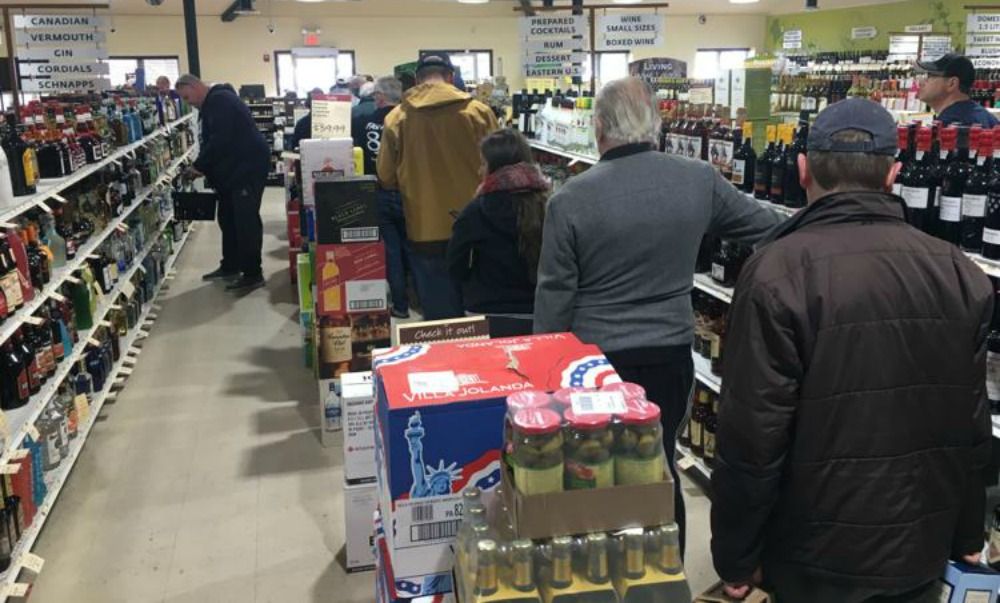
A queue for booze in the US
The IWSR has released its latest trending analysis to show what is going on across the major drinks sales channels in key countries around the world, including the US and UK.
The US
Here it is all about retail and ecommerce sales, which have both been trading strongly since mid March, as the on-trade has shut down and is struggling to generate large delivery sales.
Noticeably IWSR is claiming alcohol sales have been maintained so far through April, and overall are up double digits compared to last year. It’s larger size formats that are selling the most as people make the most of their car trip to the grocery or liquor store. They are also continuing to spend more and using some of their usual on-trade spend on drinking at home.
The UK
IWSR puts the UK off-trade sales up by 20% since the lockdown and 50% for ecommerce. If anything online sales could be even stronger if there was a better supply chain and increased capacity to cope with the increased orders. But with the on-trade closed there is 40% of UK drinks sales still up for grabs.
As well as many drinks suppliers switching to DTC, IWSR has also seen more craft brewers, distillers and wineries do the same. But overall they will struggle to make up for taproom sales.
The IWSR adds: “There are early signs that some UK consumers may become conscious of over-indulging in alcohol at home and may resort to some degree of moderation, be that lowering frequency, swapping to lower ABV drinks or introducing some no/low solutions to their product mix.”
Other markets
Other trends the IWSR has seen in other markets include:
- Italy has doubled its ecommerce sales, but it was starting at a low level. It has, though, resulted in enterprising on-trade wholesalers setting up D2C and makeshift ecommerce and app platforms to sell to their consumers.
- Online sales have been slower in Germany have. They have grown but not to the extent seen in other mature European markets. Instead it is the supermarkets that have benefited.
- In other emerging markets, like India, where there is virtually no ecommerce, sales of alcohol have dropped to close to zero.
- Spirits sales have been particularly badly hit in markets like Argentina, Italy and Spain, where there is so many spirits sold in the on-trade.
- It is the same for beer in Argentina, Germany, and Spain, where the on-trade accounts for around 80% of beer volumes and 60% of spirits volumes.
GDP set to fall 6.5% for this quarter fear analysts
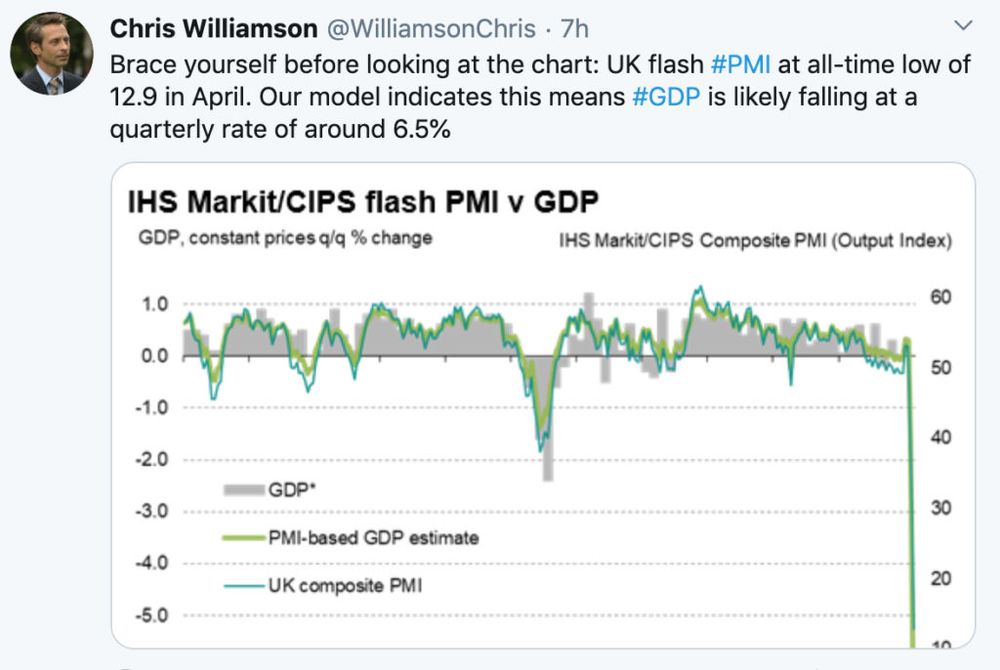
You may not be too close to what the average PMI figure is in the UK. But in times of trouble it’s where market and economic analysts go first as one of the key bellwethers to determine what sort of trouble we could be in for in the weeks and months to come. For PMI stands for the Purchasing Managers’ Index and essentially measures the “prevailing direction of economic trends in the manufacturing and service sectors”. Yes, I Googled it.
According to this assessment above by Chris Williamson, chief business economist at IHS Markit, which specialises in just analysing what our PMI is up to, things are about to get even more lively in the economy.
How brands are re-focusing themselves to help us Feel Good
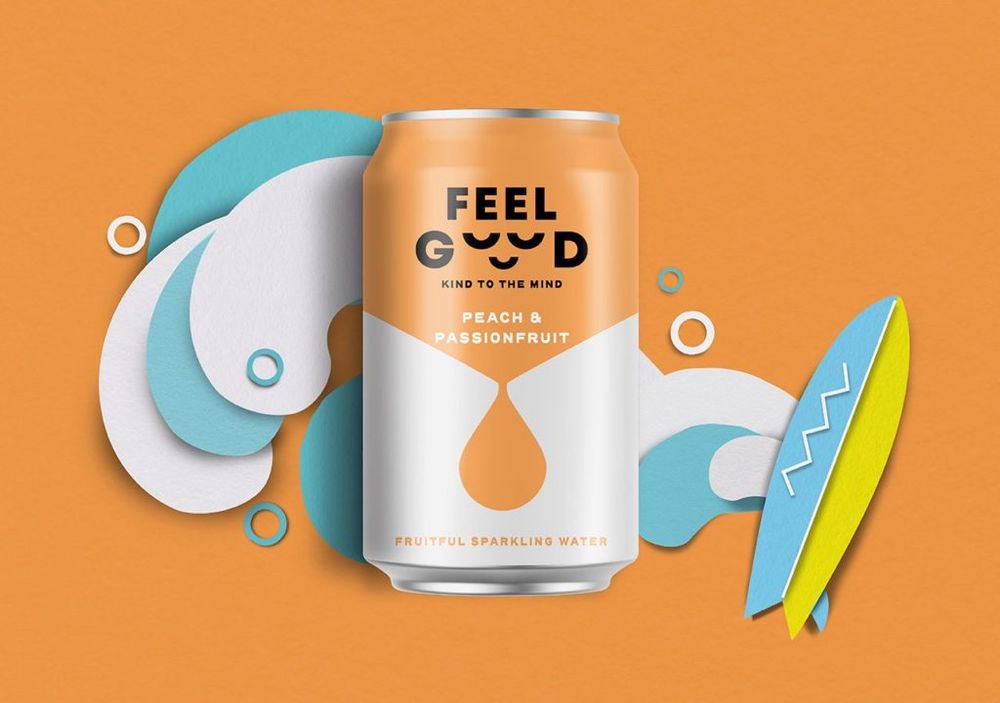
Feel Good drinks is not just about physical health any more but our mental state too
Here’s a good case study of how brands are re-positioning themselves to be more relevant in these times. Take the Feel Good Drinks Co which up to now had focused its drinks on a straight forward health message – drink our brands and it will be good for your health.
It has now worked with brand consultants, The Collaborators, to re-focus itself as a brand that is much more about how you feel and what you can do to make yourself feel better in these difficult times.
As are all now cooped up at home our mental health is as important as our physical one. So the brand has been reworked to fit in with our new daily lives, with a new strapline – Kind to the Mind – and recipes, to include natural super herbs that claim to “lift and calm the mind and body”. All combined with a stack of social media activity all centred around helping people feel good, be it donations to NHS staff, and partnering with schemes like Hospitality for Heroes.
On the can it has gone for an unfussy, uncluttered minimalist design, complete with what it is calling its own ‘zen’ face.Three per cent sales of Feel Good will go to charities that support wellbeing for people and the planet, says Alex Ririe of The Collaborators.
“It really does ‘Feel Good’ to be supporting a brand that gives people a better choice on how they consume. We’re proud to see the approach and our new design has been well received and marks a happier, healthier new chapter for Feel Good Drinks,” she adds.
Number of loans granted has gone up 120% in the last week

“What do you mean you want a loan…what in the heavens for?” Picture: BBC
The amount of money that banks have landed out to companies as part of the government’s new loan scheme has doubled in the last week by £1.45 billion, according to UK Finance.
It claims that under Coronavirus Business Interruption Loan Scheme businesses have now received £2.8bn. Which equates to over 9,000 loans in the last week and over 16,600 in total.
The scheme has been strongly criticised by UK hospitality and trade leaders for not doing enough, moving too slowly and being far too strict in terms of who gets what money. UK Finance claims it has “over 36,000 completed applications so far” of which “16,624 of these applications have been approved” with others still being processed. The big rise in loans will be some comfort to drinks and on-trade companies still looking to hear where they stand. “Over half the total number of loans provided through CBILS have been approved in the past eight days alone,” says UK Finance.
Watch HMRC’s webinars on how to apply for Job Retention Scheme
If you struggling to get your head round the government’s Coronavirus Job Retention Scheme, the HMRC is now running webinars to help businesses go through what they need to do to apply to get funds to pay their furloughed stafff. As part of the government’s commitment to supporting employers through the coronavirus (COVID-19) pandemic, you can now claim online for a grant for 80% of your furloughed employees’ salaries through the Coronavirus Job Retention Scheme.
You can register to follow a live webinar hosted by the HMRC which claims to “provide a step-by-step guide on how to make a claim through the scheme”. Click here to find a time to suit you.
If you have 20 minutes to spare then you can watch a recording that includes some of the content from the webinar on the HMRC’s YouTube channel here.
April 22
Hospitality businesses fear the worst if lockdown continues beyond three more months
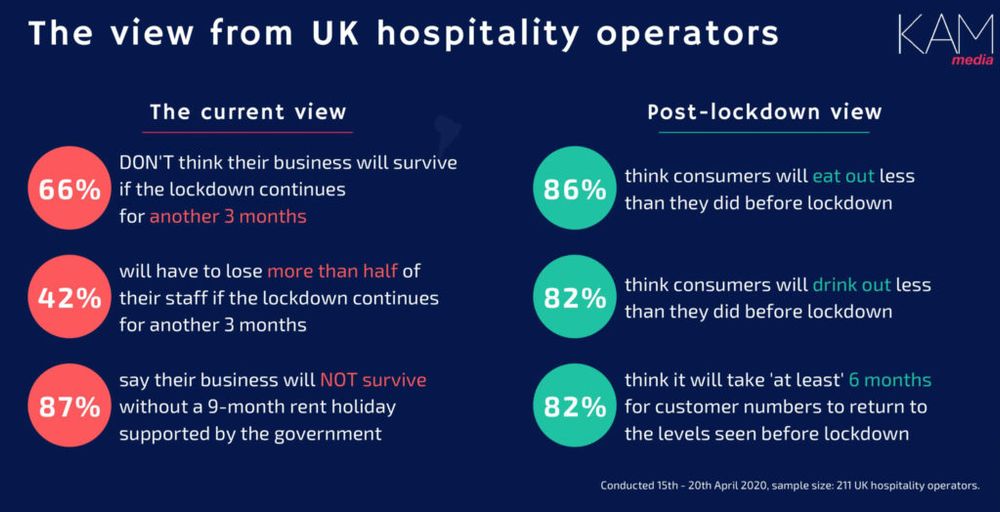
As the lockdown continues and the pressure builds on hospitality businesses and restaurant to make ends meet, even with the government support packages, new research out this week reveals just how desperate the situation is becoming for many of our most respected and well known chains.
A study by KAM Media has found that 66% of hospitality companies believe they will not be able to survive if the lockdown continues for another three months. That figure rises to an alarming 87% if the lockdown continues and they are not granted a rent holiday until the end of the year. Forty two per cent say they will have to move their staff from the furlough scheme and make them redundant if the lockdown continues for three more months.
In all KAM Media surveyed 211 hospitality companies – including pubs, bars, restaurants, cafes and street food venues. Its managing director and co-founder, Katy Moses, said: “So many hospitality businesses are at risk and we need help in navigating a pathway to safety.We need some fundamental interventions on rents and property, and on finance and loans, and it’s becoming clear that much of hospitality will require a much longer extension of the furlough scheme, given that businesses will not emerge fully from lockdown for some time. As an industry, we need to get behind campaigns such as #NationalTimeOut, spearheaded by Jonathan Downey and Hospitality Union, who are campaigning for a nine-month rent holiday, to be supported by the government.”
Kate Nicholls, chief executive of UKHospitality, said: “This research underscores the scale of the challenges, which is reflected in the current mood of the industry. We need far-reaching and continued support, and unprecedented intervention of the order of the proposed nine-month #NationalTimeOut idea or an equivalent concept of similar scale, in order for hospitality jobs and businesses to endure this crisis and to be there to drive the recovery.”
KAM Media also found that:
- 86% of companies expect consumers to eat out less once the lockdown is lifted.
- 82% expect consumers to drink out less, as well.
- 83% expect customer numbers to be down for at least six months after re-opening.
- 38% said they would expect it to take at least a year for their footfall to return to pre-lockdown levels.
Moses added: “We are very likely to see a much more cautious consumer coming out of this lockdown, at least in the short-term.Although there will be a proportion who will run straight to a pub for a cold pint, many will stick to essential only social gatherings in a bid to keep themselves safe.
Interestingly the research also reveals just how many businesses have changed their trading models. Of the 211 companies surveyed, 25% had started offering delivery, and 80% intended to continue offering this service, post-lockdown. A further 67% are already pro-actively planning how to attract customers back once they’re allowed to re-open.
Consumer confidence plummets in April
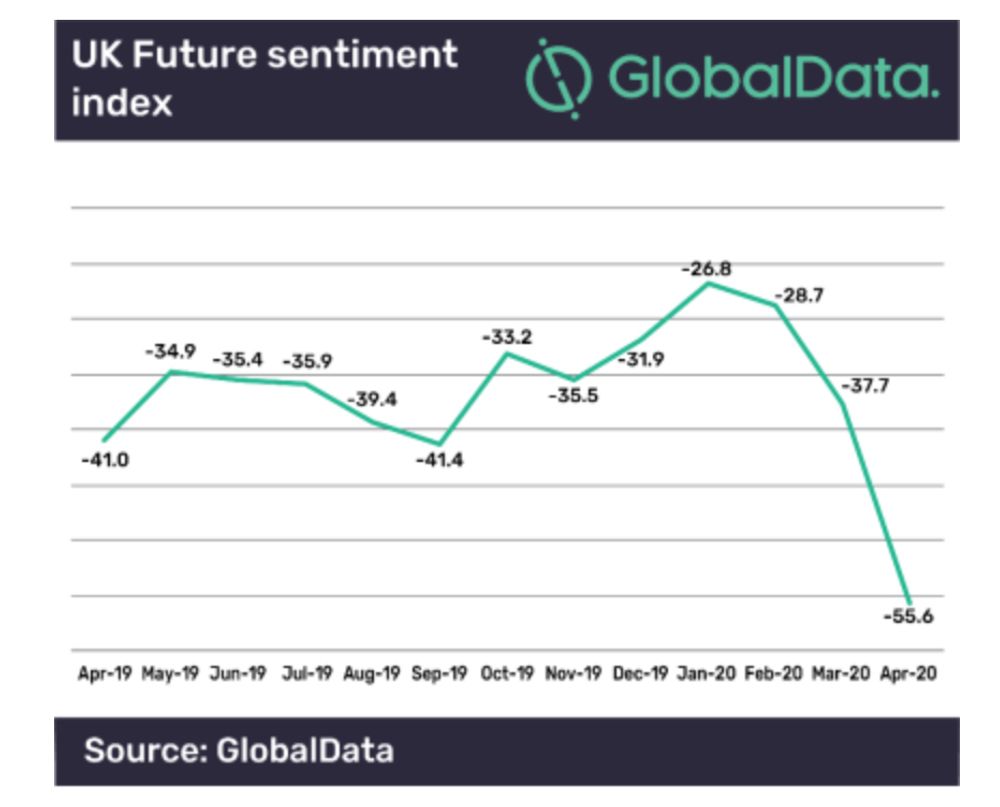
Now it might not surprise you to hear that the average UK consumer is pessimistic about our short term futures. But it’s still a bit of a jolt to discover the “Future Sentiment Index” plummeted to its level in April since it first started tracking our collective moods in April 2012. It does not paint a healthy picture for an immediate pick up when the lockdown might end, says GlobalData, that compiles the research based on a survey of 2,000 people assessing their confidence in relation to economic outlook, personal finances, and future retail spending prospects.
When asked how consumers expect the UK economy to change over the next six months, 78.5% of respondents said they expected it to get worse. When it comes to their personal finances 45.5% expected them to get worse over the next six months
Sofie Willmott, lead analyst at GlobalData, says: “Low levels of consumer confidence do not bode well for retailers – 60.7% of UK consumers expect to spend less on retail over the next six months as they seek to protect their finances and prioritise essentials. Grocery spend will be safeguarded along with essential health and beauty items, but non-essential sectors such as clothing & footwear will be hard hit by consumers deprioritising these items, even after lockdown restrictions are lifted.”
Robin Copestick: VINEX video interview on how Freixenet Copestick is innovating through the crisis
Click above to listen to Robin Copestick, managing director of Freixenet Copestick, as he talks to Richard Siddle on VINEX, the world’s only digital platform for trading bulk and bottle wine about how the company is 100% focused on driving innovation and using this opportunity to get NPD into the market.
He also looks at how it is supported, and encouraged, by its parent business Henkell Freixenet to work with tis partners on building new ideas and bringing new wines into the market like iHeart Super Heroes wine and new South African wine brand, Care for Wild, named after the charity that helps support endangered rhino in South Africa with money from the sales going to the cause.
Netflix boom as we all turn on our TVs during lockdown
Here’s another lockdown set of statistics that are a sign of our times. Netflix, the TV and movie streaming service, has announced its added more than 15.7 million subscribers globally in the first three months of 2020. Taking its total number to 69.9m.

All of which it helped generate revenue of $5.77 billion for the first quarter, up from $4.52bn a year ago. Profits rose to $709.1m from $344.1m in 2019.
As for its most popular show? Well here goes:
- its biggest success has been Tiger King with 64m viewers in 2020 so far.
- nearly 30m households have tuned in for the third season of Ozark – the crime drama with Jason Bateman.
- the reality show Love Is Blind attracted 30m subscribers.
To cope with demand Netflix has been forced to reduce bandwidths in Australia, Mexico, India and many other countries following requests from local governments.
It also expects the initial boom in subscribers to slow as the lockdown becomes the new norm. It said it expected “viewing to decline and membership growth to decelerate as home confinement ends, which we hope is soon.”
Disney Plus has also already got over 50m subscribers for its new platform. HBO launches its new service, HBO Max on May 27. The other issue the big streaming platforms face is all movie and television production has been shut down with no date set for work to resume.
Philip Cox of Cramele Recas shares his insights on Romanian wine on #UKWineHour

Cramele Recas Philip Cox is the latest guest on @SorchaHolloway’s #UKWineHour on April 23 at 7pm (BST) on Twitter when you can have the chance to talk to him about Romanian wines and how he is steering his business – the biggest exporters of Romanian wine – through this crisis.
Hospitality Talks with The Buyer’s Richard Siddle
KAM Media, the research analysts for the on-trade, particularly focused on the pub sector, has really come into its own during this crisis providing great intelligence on what business leaders are thinking and how they are reacting across the sector. Particularly through its series of Hospitality Talks short videos hosted by KAM Media’s co-founder and managing director Katy Moses.
Here she talks with The Buyer’s Richard Siddle to assess what impact the crisis is having on the restaurant wine supply chain and its wide supplier base and what sort of changes are already taking place that could be with us for the long term. In particular the change in business models, the need to go direct to consumer and switch away, in the future from being a single channel supplier. As well as analysing the role of the business media at this time and what they can play in sharing, but also disseminating key information for their audience.
Chance to discover baijiu with #AtHomeWithFenjiu Instagram tastings

Find out about baiju with Enrico Gonzato
Hand up who likes their baijiu? OK, how many of you have actually tried it or know much about it. Well here’s your chance. Cheng International, UK distributor of Fenjiu, a premium “light aroma” baijiu from China, is continuing its ‘At Home with Fenjiu’ tasting series – an Instagram livestream series on baijiu, with two more sessions from industry experts this week.
The series #AtHomewithFenjiu has been put together to try and give spirits buyers, bartenders and sommeliers the chance to widen their knowledge of baijiu – which just happens to be China’s favourite drink and, as a result the most drunk beverage in the world.
This week’s tastings are hosted by Enrico Gonzato, bar manager at The Mezzanine Bar at The Stratford Hotel, and Neil Phillips, aka The Wine Tipster, and take place on April 24 and April 25 at 7pm.
In Friday’s tasting Gonzato will be showing he make his Vivi Fenjiu cocktail with Fenchiew by Fenjiu 10-year-old and his homemade ‘super greens wine’.
Philips takes over on Saturday night to conjure up his own cocktails from his home bar.
April 21
KPMG: hospitality will find it hard to recover – 2021 could be worse than 2020
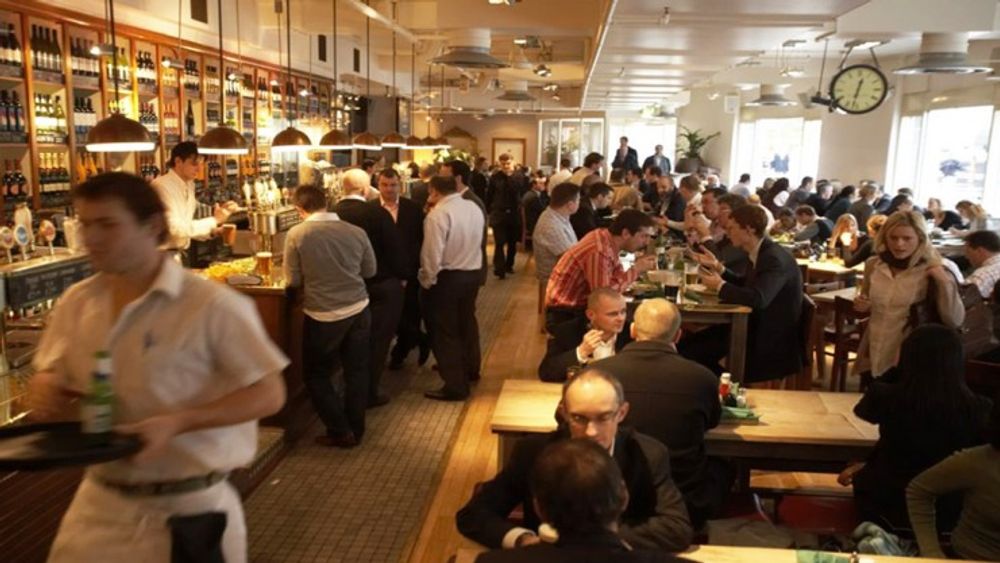
It could be some time before we all see scenes like this again
KPMG has reported it expects UK GDP to fall by 8% in 2020, but that some sectors will do better or worse than others. On the negative side sits the hospitality and restaurants sectors that KPMG fears could see a drop in output of 30%, compared to other sectors, such as utilities, will only lose 12% and transport and logistics will be down by 3% – thanks to all the deliveries we are ordering. By contrast the public sector is expected to grow by 5%.
KPMG’s analysis says: ‘”The hospitality industry will also find it harder to recover lost output next year; cancelled travel plans and restaurant bookings will mostly be gone for good, unlike manufacturing and construction, where there should be a stronger rebound already this year thanks to back orders that can be filled once the lockdown is over, even if the initial fall in output during the lockdown will also be very large.”
KPMG also estimates ‘recreational & cultural service’ income will be down by around 70% in Q2 with a bounce to a running rate of around minus 5% by Q1 next year, according to Langton Capital. KPMG reports re pubs, restaurants etc that ‘we expect the recovery to be more gradual than the recovery of the overall economy, as the threat of reinfection may keep people away beyond the lockdown period until a vaccine becomes available.’
Oh, and for good measure Paul Martin, head of retail at KPMG believes “2021 is likely to be worse than 2020” and that social distancing measures will go on for some time. KPMG concludes: “The current slowdown is unprecedented on a number of levels. The scale of contraction in output that is expected, due to the lockdown and continued social distancing measures anticipated until a vaccine is found.”
Kantar: Wine sales will take longer to recover in China

Wine in restaurants in China may now be sold again but it will take a long time for the sector to recover says Kantar
Kantar claims the loss of sales across the wine category in China during the Covid-19 lockdown means its recovery is going to be far longer than other grocery and FMCG categories.
Whilst some categories, noticeably household cooking areas, health care, can expect a sharp return to growth, or follow the much touted ‘V shaped’ recovery – like laundry, biscuits, nutrient and health lines – the wine industry is faced with what it sees as a longer ‘U shaped’ return.
“These categories are ones that have experienced the worst impact as a result of the COVID-19 outbreak, as they suffered a significant decline during the peak (generally worse than the decline seen for V-Shape categories) and six weeks later they are yet to show signs of a full recovery,” it reports. “Categories here include skincare, make-up, shampoo, Chinese spirits, wine, beer, chocolate and candy.”
Kantar says the key for categories such as wine “is to ensure they can capture demand by emphasising the benefits their brands can offer in the new era”. “Consumers,” it says, “will be more concerned with health but will also be looking to enjoy family occasions and social gatherings even more than before, given that they have been unable to do this for almost two months. Therefore capturing these moments of happiness and time together can benefit both snacking and alcohol brands.”
It has picked out five key areas that will help categories concentrate their recover on.
- Demand Forecasting: understand future demand levels and how to compensate for lost usage occasions.
- Marketing Growth Drivers: what elements of the marketing mix will help to drive sales be it advertising, promotions, in-store activities and distribution.
- Usage occasions: identify new usage occasions that have arisen as a result of the coronavirus will be critical in helping to capture future demand and developing new products to meet these new needs.
- Media Investment: how to optimise your media investment will be more crucial than ever, especially in the event of reduced budgets. Knowing who to reach and how to reach them in the most cost-effective way will help to improve the return on investment.
- Channel Dynamics: online will be even more important but only if you understand how to make it work for your brand and business.
Kantar reports that FMCG sales first started to take a hit in the week of Chinese New Year and then continued for six weeks. “The fastest rate of decline was the week after Chinese New Year (w/c 3rd February) where the FMCG market fell by 39% compared to the equivalent week in 2019,” it says.
But the situation has started to reverse from the second week in March onwards.
Sommet Education: Why hospitality will be at the heart of the global recovery

Benoit-Etienne Domenget of Sommet Education on why hospitality will be key to how the world recovers
Benoit-Etienne Domenget, chief executive of Sommet Education that specialises in hospitality management shares his views on what he thinks is in store for restaurants and bars down the line.
“Four months. Over 7.1 million people infected in all regions of the world and far too many losses. World Trade expected to fall by between 13% and 32%.
A massive 75 million jobs at risk as per the UN World Tourism Organization, a 20 to 30% expected drop in international tourist arrivals, 2.1 Trillion $ of GDP loss, with80% of small and medium-sized companies endangered. The figures of the actual pandemic seem unreal and question all of us to our very core. Our lives and economies are impacted as rarely before….but everywhere, our sense of responsibility, collective solidarity and creativity has never been so vibrant. The word “Hospitality” has never been so meaningful: empathy, generosity, sense of service…
“These words must and will endure ”The Day After”.
“History tells us that this steep downturn will be followed by a strong rebound of the industry. Hospitality is one of the most resilient industries and has already demonstrated its ability to recover quickly, as it did after 9.11 and the 2008 crisis.
“As a first sign of recovery, close to 90% of the hotels in China are now reopened, and China air traffic is running at above 40% of its capacity. Moreover, governments around the globe are preparing and starting to implement post-confinement strategies. A rapid and strong rebound is possible. Decisions taken now will shape the recovery and global growth of tomorrow. We need to lay the foundations for a strong, sustained and socially inclusive recovery now.
“I am convinced that this crisis is the undesired spark that will help us reconcile visions of the world that have been opposed for far too long..Hospitality is so much more than an industry. Hospitality at its core is the art of service, dedication to others, the quest for generosity, as well as openness to the world. Hospitality, amounting to 10% of global GDP and accounting for one out of nine jobs worldwide, will be one of the main contributors to the rebound of the world economy and to job market recovery.
“Managing this complexity is the challenge of our generation. Is it also our commitment towards the next generation…
These are the many qualities the coming generation of leaders will need to succeed “The Day After”.
“In ‘The Day After’ – hospitality is the future.”
M and Gaucho to help NHS with meals and special thank you night
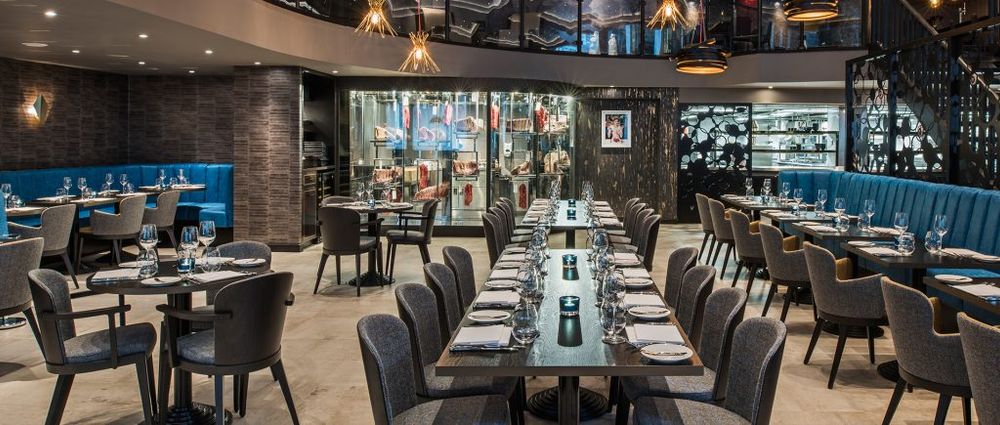
M Restaurant’s Threadneedle Street will host a special dinner for NHS staff and their partners in September
M Restaurants and Gaucho restaurants are to provide 1,000 meals a week for NHS staff in a partnership agreed with Hildon Foundation and Deliveroo. The meals will be prepared from M and Gaucho menus and sent to Guys, St Thomas and The Nightingale hospitals in London. There will be separate deliveries for lunchtime and dinner. The meals have been devised by M’s culinary director Mike Reid, and will be made to fit in with the hospital’s shift patterns.
M is also going to host a fully complimentary “Appreciation Dinner” for 200 NHS front line doctors and nurses and their partners on September 28 at its Threadneedle Street site in the City of London.
Liberation offers rent support to its pub owners
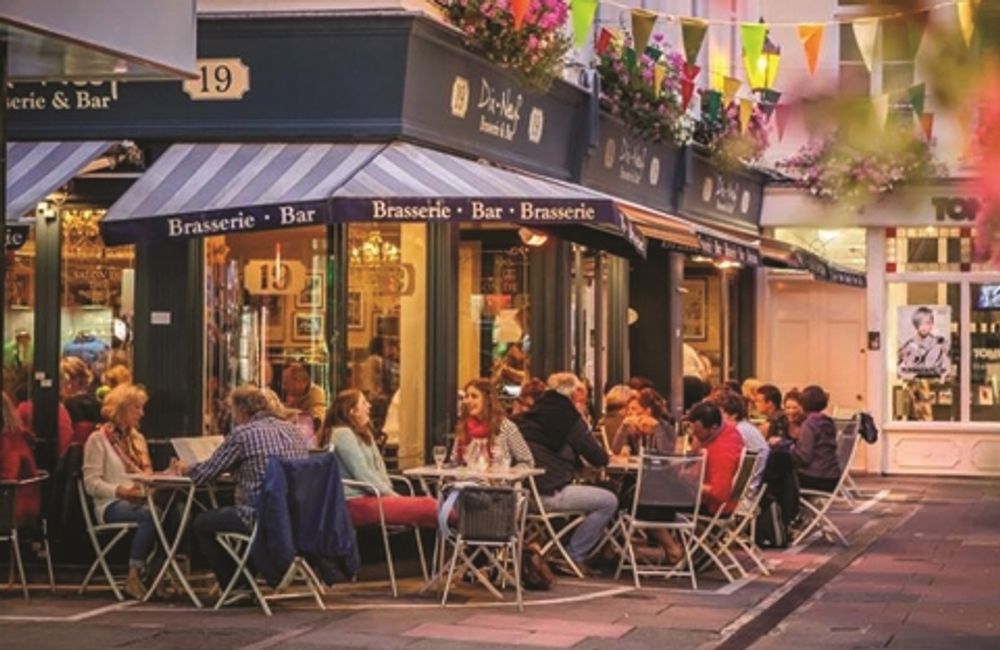
Liberation has a wide range of bars and brasseries in its portfolio
Following calls by hospitality leaders for pub groups and landlords to do more to help tenants with rents and costs the Liberation Group, which runs a network of pubs across the Channel Islands and the West Country, has said it will not collect any rent for the time that its pubs are closed up to a maximum of six months. It is also cancelling 50% of its headline rent and is talking to individual pubs about other measures, which could include long-term deferral of the outstanding rent subject to conditions.
Christine Oxford, tenated pubs managing director, said: “Our priority is to ensure our tenants not only survive this period of closure but they come through this in a strong position to continue to trade with us in the future. With this in mind we have agreed a significant package of support with the Liberation Group board.”
April 20
Crucial week as furlough payments go live

Michael Gove confirmed this weekend that the hospitality sector would be one of the last to re-open after the lockdown. BBC.
This is likely to be a pivotal week for so many businesses in the drinks and hospitality sectors as the much awaited government Coronavirus Job Retention Scheme opened for applications at 8am.
It means any business that has put any members of staff on furlough can now apply and get much needed funds back into their cash flow. Quite how long that takes to process remains to be seen but the government has claimed it will only take six days before the first payments are processed.
The HMRC has stressed any company that claims to keep a note or a print-out of their claim reference number as it will not be sending out a confirmation email or SMS. It says: “Expect to receive the funds six working days after you apply, provided your claim matches records that we hold for your PAYE scheme…to receive payment by 30 April, you will need to complete an application by 22 April.”
The scheme allows companies to claim for a grant for 80% of their furloughed employees’ salaries, up to a maximum of £2,500 per employee, per month. It has now been extended until the June.
You can read all the available guidance on GOV.UK before you apply.
- Here is the link for the documents and calculations you will need to make.
- It also has this step-by-step guide to take you through the process.
The application process comes a day after the Cabinet Minister Michael Gove said in TV interviews this weekend that he expects the hospitably sector to “be among the last to exit the lockdown”.
With headlines claiming today that could mean nearer the end of the year.
It raises the temperature even more within the sector in terms of getting more support and guidance on how drinks operators suppliers and restaurants are going to be able to keep going with weeks and months of further restrictions and lockdown.
Proposals for nine months relief on rents sent to Chancellor

Jonathan Downey has spearheaded the latest hospitality lobby to get a nine month break on rents
Jonathan Downey, chief executive of London Union and founder of the Hospitality Union initiative, is spearheading a campaign, backed by UK Hospitality and sector chiefs, to get the government to agree to a nine-month rent-free period for businesses forced to close because of the coronavirus outbreak.
He has sent in a submission to the Treasury today in which he spells out the mounting pressure on the on-trade and its suppliers and the need for more official government action as leaving it to landlords and banks to offer support is not working.
His Treasury document states: “We were first hit and hardest hit. We’ve been forced to close by government order. We’ll be the last allowed to reopen. We’ll be the last to get back to any kind of normal. We’re one in ten of the UK’s employees. We are vital social and cultural centres at the heart of cities and communities.”
Downey’s proposals set out the reasons why a nine month rent window is approved. It includes a #NationalTimeOut and #NationalRentFree initiative that also applies to landlords and helps them to apply for their own nine-month period on their loan repayments where the debt is secured on premises benefiting from the rent postponement.
This is particularly important as landlords are putting on pressure on their tenants to pay as they themselves have debts and suppliers to service.
Jobs drop in hospitality
With the sector at standstill it is no surprise to find job vacancies in the overall global hospitality sector have dropped by 66% in the year to date, which is the lowest level in more than eight years, according to job search engine Adzuna. It reveals that there are 35% less positions being advertised in the UK hospitality job market in the year-to-date with the number open vacancies in hospitality dropping from 51,998 to 18,645 across Britain this year. Hospitality positions across the globe have dropped 34% but these figures will be reflected by the different phases of the pandemic each country is in at any given time said Adzuna.
Barclaycard reveals changing in consumer spending

As we are all confined to the sofa our spending habits have changed
Interesting new data from Barclaycard that reveals huge changes in consumer spending during March as we all came used to living in lockdown. Its key findings in its latest consumer research found that:
- spending at supermarkets rose 21.3% and specialist food & drinks stores by 30.5% – with the latter up 80% per cent the week before social distancing measures were introduced.
- restaurants and bars, pubs & clubs contracted 35.5% and 22.2% respectively. This will have worsened in April.
- travel fell by 40.5% and fuel decreased by 4.2% as Brits spent more time at home.
- Online purchases rose 5.5% while in-store transactions dropped 4%.
- Confidence in the UK economy fell to 25% yet more than half of shoppers chose to buy locally to support independent businesses.
- Consumer spending overall dropped 6% year-on-year in March as measures to tackle coronavirus were introduced.
- Spending on non-essentials was down 12.9%, with many retailers impacted by the introduction of social distancing measures.
- Barclaycard says more time at home led to digital content and subscription spend rising 17.4% as people entertained themselves by playing digital games, watching boxsets and accessing streaming services.
- 68% of people remain positive about their household finances, broadly in line with last month. This could be attributed to the fact that 56% said that they were saving money by avoiding the pub, eating out and commuting less.’
US wine industry facing $6bn losses in 2020

The US wine industry is facing billions of losses
The impact of Covid-19 could cost the US wine industry $5.94 billion in 2020, according to new analysis by wine industry expert Jon Moramarco, managing partner of bw166 and editor of the Gomberg-Fredrikson Report.
The figures, which have been circulated by the Wine Institute of California, reveal how quickly the situation is unravelling in the US and its more than 10,000 wineries and more than 8,000 winegrape growers.
“Wineries, like all other hospitality businesses, are feeling the impact across the board,” said Robert P. Koch, president and chief executive of Wine Institute. “Our wineries rely heavily on their tasting room and restaurant sales which have been decimated. While we are confident in the long-term consumer demand for California and US wines, we anticipate a long recovery period.”
John Aguirre, president of the California Association of Winegrape Growers, added: “Grape prices were bad before the Covid-19 pandemic hit, but now we are confronted by the prospect of a financial disaster for growers.”
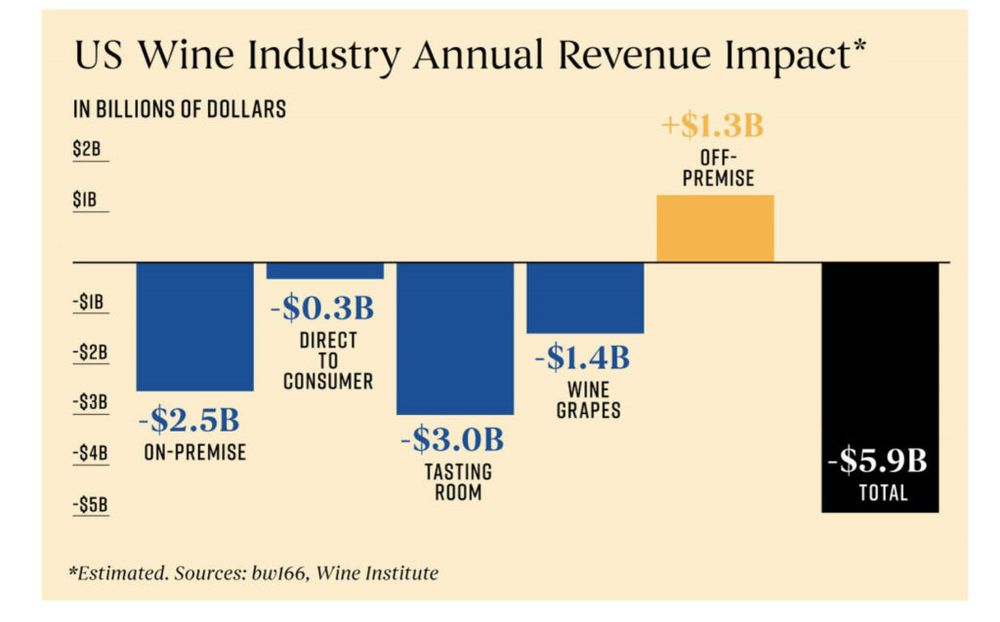
The bw166 figures also reveal:
- On-premise/on-trade: estimated losses will be 80%. Down $2.54bn.
- Direct-to-Consumer: estimated to decline 10%. Down $323m.
- Tasting Room Sales: estimated to decline by 80%. Down $3bn.
- Winegrapes: the shortfall in sales will also create an excess of winegrapes as inventories will be more than required. This is the impact on winery owned grapes and third-party growers this year. Estimated lost winegrape sales total will be 25%. Down $1.40 billion.
- Off-Premise Sales: The off-premise retail sales (grocery stores and other outlets) will be less severely impacted and are benefiting from the decline in on-premise sales during shutdowns. While the initial response to shutdowns has been a large jump in off-premise sales, more recent trends show a moderation. Estimated annual impact increase of 10%. Up $1.33 billion.
Investors start to look for M&A opportunities

The following months are likely to see a number of business deals and M&A activity
Investors are circling around many industry sectors looking to see what opportunities there could be in mergers and acquisitions in the coming months. Of particular interest are said to be companies that offer good “data and analytics capabilities,” according to one investment agency that is looking to set up a ‘dry powder’ fund. “We have compressed changes of behaviour into two or three weeks of lock-down,” they said. “It’s going to get even tougher…Q2 will be such a blood bath. Companies that were flirting with significant digital disruption will really go hard and clear the decks.”
Virtual Whisky Festival launched

Whisky writer Besky Paskin, and co-founder of OurWhisky, is helping to launch a Virtual Whisky Festival to be held between April 30 and May 21. It will feature a series of online tastings and allow whisky lovers, consumers and experts to come together online and share some special drams with whisky makers and master distillers. As Paskin says: “We’ve approached some of the biggest names in whisky, who will be joining us direct from their own living rooms to share some of the liquid they’ve created. All profits will be donated to The Drinks Trust charity to help those in the hospitality industry affected by the Covid-19 pandemic.”
The idea is for people to buy tickets in advance (£30) with which they will be able to attend one of four sessions and use the five 25ml whiskies that will be sent to them as part of the Virtual Whisky Festival tasting kit. “To encourage all you whisky lovers to try something a bit different, and add a little excitement to your day, the whiskies, and special guests for each session, will remain a surprise until the tasting itself,” says OurWhisky.com.
Ticket holders will need to tune in to OurWhisky’s website, or Facebook , Twitter (@ourwhisky) or YouTube channels, for the big reveal.
April 17
Let’s Zoom our way into the weekend
Before we get into the serious and not so serious stuff, here’s a song that has been going around in my head for the last month. Yes Zoom, by the Fat Larry’s Band. No explanation needed but it’s also a cracking song…
Job Retention Scheme is extended until the end of June for furloughed staff
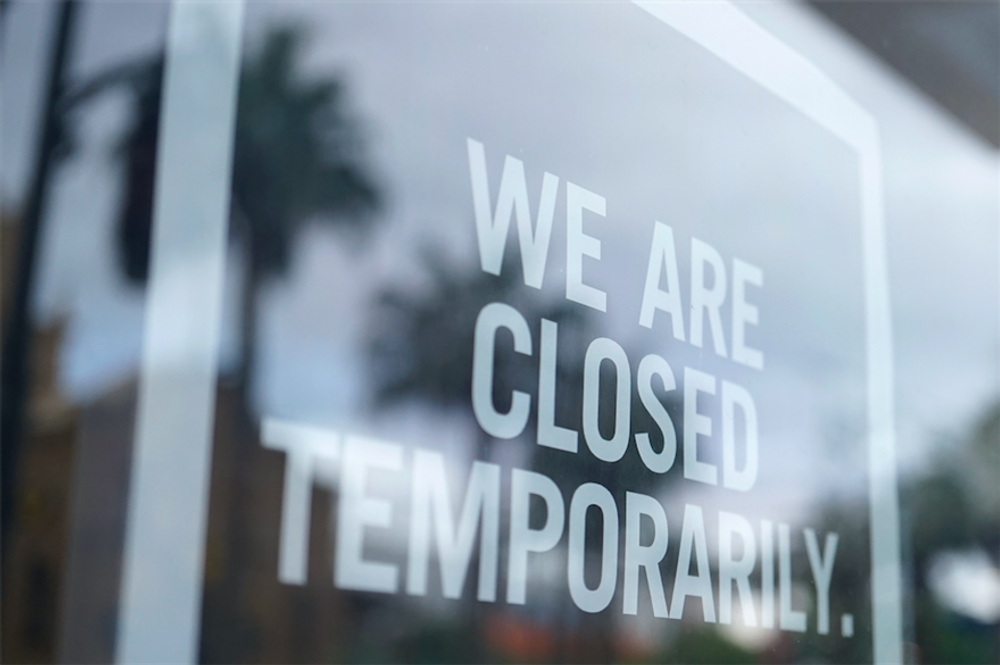
The Chancellor, Rishi Sunak, has announced the Coronavirus Job Retention Scheme (CJRS) will now be open until the end of June which means any staff on furlough will be able to continue to receive up to £2,500 a month through their employee. The news comes as the UK’s budget watchdog has warned the UK is likey to go into recession and that GDP could fall 13% this year.
The British Chambers of Commerce believes 50% of all UK firms will use the job retention scheme, with up to 9m workers expected to be furloughed. The percentage is much higher in the hospitality and drinks supply ca
Miles Beale, chief executive of the Wine and Spirit Trade Association, said: “We welcome the extension of the job retention scheme – which will put off collective redundancy of furloughed workers for at least a month. The scheme is a vital lifeline for the entire hospitality industry. However, the furloughing of staff won’t prevent redundancies altogether – or indeed put them all off until further down the line.”
He said more needs to be done urgently to help “address the cashflow crisis being experienced by hospitality suppliers and outlets” all of which mean “redundancies are increasingly likely”. The WSTA is calling on the Treasury Select Committee to take evidence on the issue at its hearing on Tuesday.
The WSTA has proposed practical measures to address the cashflow crisis:
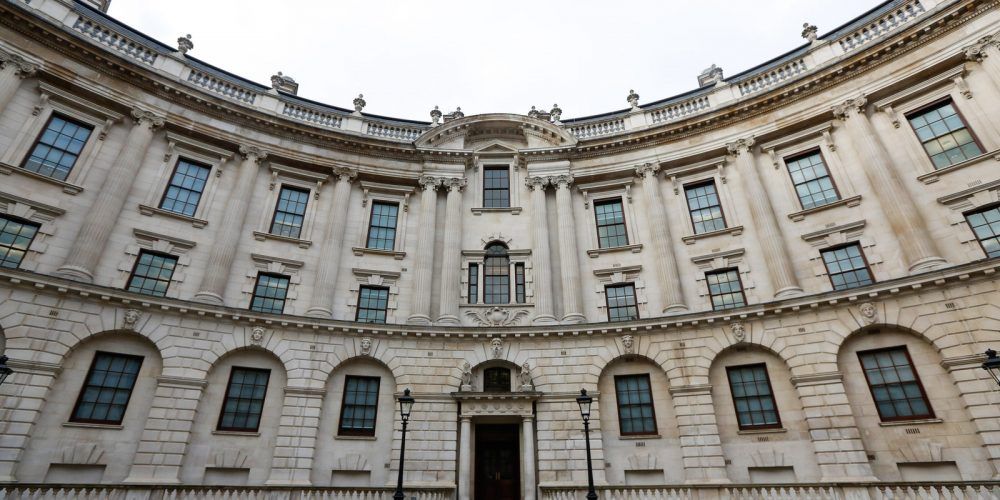
The WSTA is calling on the Treasury to offer more practical support that will help businesses’ cash flow
- crucially drinks and hospitality businesses need support on excise duty payments and still needs the government to introduce a blanket duty deferment scheme.
- currently HMRC is able to defer duty payments but only an individual case basis and drinks companies are finding it very hard to get through to confirm or discuss their personal issues.
- the WSTA wants more to be done in terms of ‘time to pay’ and help firms that don’t have duty deferment accounts.
- the WSTA is also asking for more drinks suppliers – particularly those that 100% support the on-trade to be given the same business rates relief support as has been given to pubs, bars, clubs and restaurants.
Loans scheme extended for bigger businesses above £45m turnover
The Chancellor has also announced that businesses with turnover of more than £250m will now be able to apply for the government’s Coronavirus Large Business Interruption Loans Scheme. It means that:
- firms with a turnover of more than £45 million will now be able to apply for up to £25 million of finance
- companies with over £250m can apply for £50m loans.
Business with turnovers of more than £500 million were originally not eligible for the scheme.
The Chancellor Sunak: “I want to ensure that no viable business slips through our safety net of support as we help protect jobs and the economy. That is why we are expanding this generous scheme for larger firms.”
Boom in US off-trade data helps to offset on-trade collapse
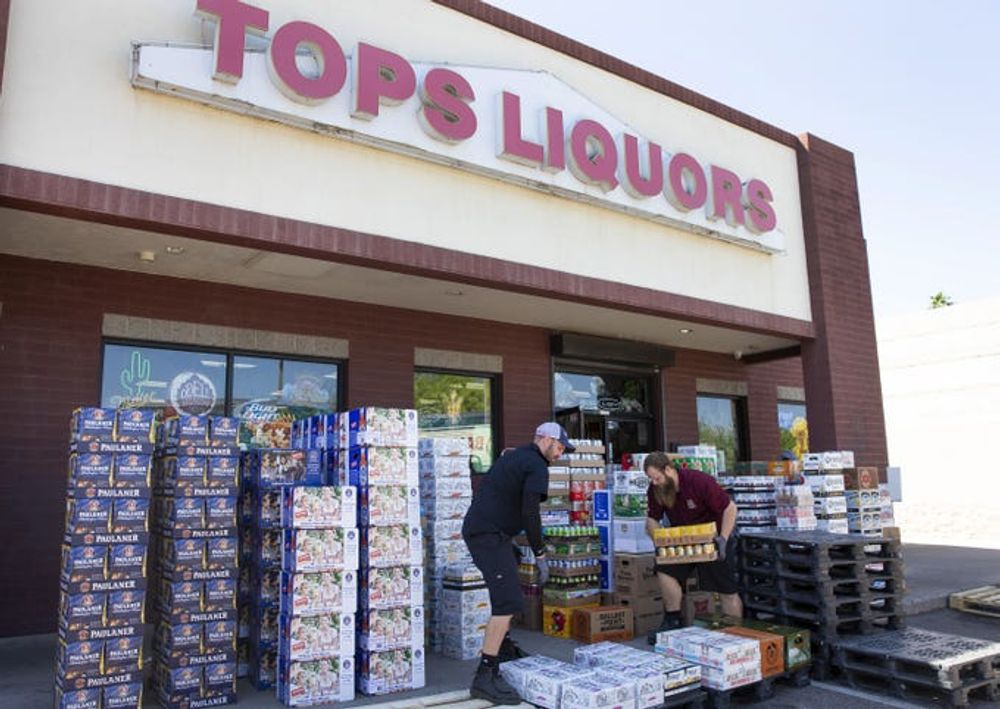
Liquor stores are booming in the US during the lockdown
The alcohol spending trends in the US show how quickly ecommence has taken hold of the market and the importance that drink is playing to average basket sales.
The latest Nielsen data reveals that total alcohol sales were up 22% in the off-trade for the week ending 28 March, which was faster than the growth of total consumer goods (up 16%). It was the rise in e-commerce that was particularly impressive, up 291% vs the same week in 2019, making it the fastest-growing department in percentage terms, albeit on a lower base than most others.
The strong off-trade sales are going some way to replacing the on-trade market that, like the UK, has collapsed since the outbreak of Covid-19. Trade estimates claim the off-trade alcohol market volume growth needs to be up 22%, and imported wine by 29%, just to get flat overall category growth. Imported wine sales are outpacing those of domestic wines at this time.
Key statistics from the latest Nieslen data show:
Total FMCG +15.5% value
Total Alcohol +21.5%
Total Wine +27.4%
Table Wine +26.3%
Imported Wine +28.7% (29.6% share total wine)
Beer (ex Cider) +9.6%
Seltzers +327%
Cider +15%
Spirits +26.9%
3 Litre box +80%
Boisdale issues ‘War Bonds’ for cash flow and to offer customers’ treats to look forward to

Ranald Macdonald in typically upbeat mood
Boisdale, the London premium group of British restaurants and music venues, have devised a series of what it is calling ‘Boisdale War Bonds’ for customers to buy now and then redeem once the lockdown is over and its doors are open again.
It has created 14 different bond levels from £45 up to £1,500 that will hopefully give it some much needed cashflow at this time, whilst providing their regular guests with a restaurant treat to look forward to when the lockdown is over.
You can spend £79.50 for ‘The Definitive Rat Pack VIP Dinner & Show’ which would normally cost £145, or for £75 you can pre-order yourself a 20oz Scottish Chateaubriand Bond for two, which would normally be £120. Or treat yourself to a Lobster Thermidor Bond, with two whole lobsters thermidor and 4 side dishes also for £75 rather than £120.
You can even book in your own ‘Private Victory Dinner Party Bond’ for £1,500 which would normally cost £2,000.
Ranald Macdonald, Boisdale founder, said, “In precarious times it is good to smile and important to have something special to look forward to. Boisdale War Bonds support the Boisdale war effort as well as providing outstanding opportunities for our loyal customers and friends to celebrate Victory Over Corona at Boisdale on spectacular deals.”
What’s more the bonds have been designed on the original British Second World War bonds and feature a photo of Sir Winston Churchill with his typical V-sign salute. They are available to buy up to October 31 2020 from the Boisdale Gift Voucher Website and are valid for a year.
Get behind Phil Crozier and Malbec World Day

Phil Crozier of Wines of Argentina is the man to get behind Malbec World Day
Today is Malbec World Day so the ideal excuse to open a bottle of your favourite Malbec. Who better to guide you through than Phil Crozier, European head of Wines of Argentina. You can catch him on Instagram IGTV sharing his videos of the grape variety that has shaped his career in wine. Click here.
Quarantine Sommelier Training Courses with Roberto Dello Pietra – Tarantino style
This lockdown period is bringing all sorts of talents to the surface. Here’s respected sommelier Roberto Della Pietra who is taking to YouTube to produce a series of slightly tongue in cheek videos that both show of his skills as a budding film actor and his better known talents as a sommelier. They are also a subtle way to brush up on your wine knowledge too. But it’s not likely to be endorsed by the WSET.
First up is take on a famous scene from Pulp Fiction where not knowing the right grape variety can have a serious life changing consequences. You can join in and subscribe to Roberto Della Pietra’s YouTube channel here.
April 16
South African government u-turn sees wine exports stopped

The South African government has also reversed its decision to allow the export of wine despite the ongoing lockdown of the country that also includes the movement of sale of alcohol. According to reports out of South Africa the Minister Fikile Mbalula has confirmed the “cessation of the transport of wine for export purposes”.
Vinpro, the trade body that represent wine growers, has released this statement seen by The Buyer: “As an industry task team, we are deeply disappointed and shocked at this sudden change of direction, following extensive lobbying with various government agencies to relax the lockdown measures pertaining to the export and sale of alcohol. The livelihood and long-term future of our industry is in grave danger and therefore we will explore all avenues in this regard.
“We endeavour to keep all our members informed as further information becomes available and implore each and every one of you to adhere to the newly imposed measures.”
Bruce Jack calls for support for communities in poverty in South Africa

Children queuing for food at a relief station where support is desperately needed
The national lockdown is having what wine producer, Bruce Jack, describes as a “socio-economic disaster” on many communities in South Africa. “Already poor, the shutdown has completely shut off all financial in-flows and people here are desperately hungry,” he said.
To help Jack is working with local government bodies to help raise money through his existing Headstart Charitable Trust, that he already runs to support families in his local community. He is calling on the wider wine industry to see what they can also do to help support and donate much needed money to help the poor of South Africa at this time.
He explained: “There are a myriad issues which have led to this situation, including our area being previously disregarded in terms of relief measures and the unusually high level of piecemeal workers that live hand-to-mouth of a daily and weekly basis. These workers have had no income since the shutdown. The promised government relief packages are incredibly difficult to access for these people.
He added: “Farmers are coming to the rescue. Soup kitchens have been established in rural villages and storage facilities made available…but we need food. Our Charitable Trust has been asked by elected representatives, farmers and religious leaders to help coordinate financial donations and food collections and food donations.”
Anyone able to help is invited to either contact Bruce Jack at bruce@brucejack.com or you can make a donation directly to The HeadStart Trust, at the RMB (Rand Merchant Bank).
Branch code: 202709
Account: 62845089110
Please include the word RELIEF with your donation and the The HeadStart Trust Charitable Trust Number is IT 721/2019(C).
Wine Australia shows first sign of global impact of Covid-19 in China

The sun is shining brightly on all premium parts of Australian wine
The first figures to show the impact the Covid-19 outbreak has had on global trading to China are out today with Wine Australia’s latest export statistics. Andreas Clark, Wine Australia’s ceo, stressed it was too early to get a full picture, but Australian exports to China by value in March 2020 were 43% lower than March 2019 and 14% lower than the same quarter in 2019.
Wine Australia points to import figures from Global Trade Atlas, for the year ended February 2020, show total wine imports to China decreased by 17% in value (USD) and 14% in volume. This decline was driven by French bottled imports, down by 39% in value (see Figure 1). Australia’s bottled imports increased by 11% in value and Australia was the only source country not to experience a decline in bottled wine value.
He stressed the the first three months of each calendar year “was historically the quietest in terms of exports, but the slowdown was significantly steeper in the first quarter of 2020”.
“It is too early to tell what the effect of the subsequent world-wide spread of the virus has had, and will have, on exports to other destinations. Sales data from the UK and US suggests that while cafes and restaurants have closed and sales have been lost, it’s been offset by people buying more wine for at home consumption.”
He added: “There are reports that Australian wine is keeping its share amidst this growth in both the off-trade and online. We will have to see how things go when stockpiling calms down’, he said. The UK and Australia went through similar surges and then calmed down. It remains to be seen if wine sales through off-licence and online balance out the decline in on-premise sales.”
The top five destinations by value were:
- Mainland China, up 15% to $1.15 billion
- United States of America, down 2% to $416 million
- United Kingdom, down 10% to $347 million
- Canada, down 13% to $179 million, and
- Singapore, up 20% to $103 million.
The top five destinations by volume were:
- United Kingdom, down 9% to 219 million litres
- United States of America, down 11% to 136 million litres
- Mainland China, down 11% to 130 million litres
- Canada, down 26% to 52 million litres, and
- New Zealand, down 8% to 30 million litres.
CAMRA launches Pulling Together campaign to promote pubs and breweries doing delivery and takeaway services
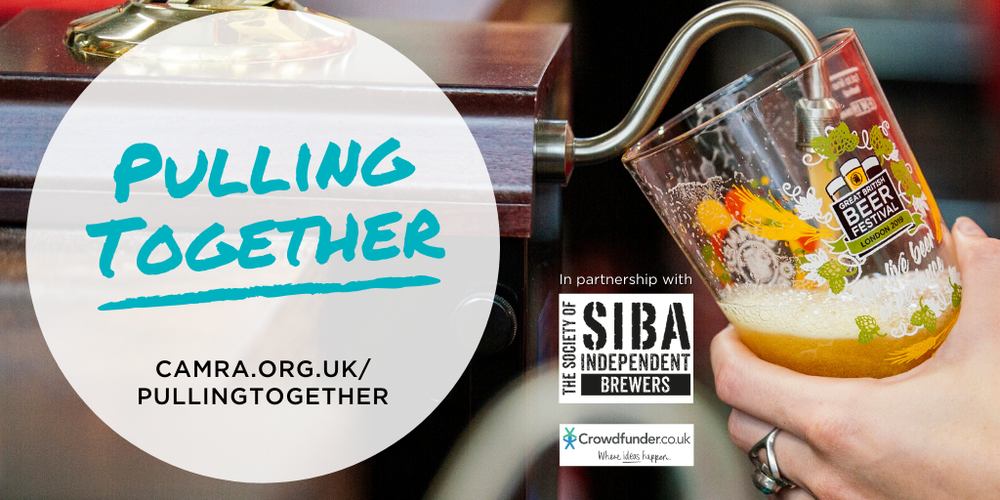
The Campaign For Real Ale believes there are now around 2,000 pubs, breweries and cider makers that are now offering takeaway or delivery services to help keep them in business and serving customers during the lockdown. It has started a ‘Pulling Together’ campaign, launched in partnership with SIBA and Crowdfunder, to encourage beer and cider drinkers to support the industry during this time of crisis and shop locally for their favourite brew.
The WhatPub site also lists over 1,000 pubs that are offering takeaway and delivery services.
Ben Wilkinson, CAMRA’s national director said: “This is the most extensive list out there of safe and legal takeaway and delivery initiatives offering beer and cider around the country. Anyone who loves quality real ale or cider should use this resource to support local businesses, so they’re able to reopen once this crisis has passed. Many pubs are relying on our ongoing support to keep afloat right now, and the best way we can ensure they still exist once the restrictions are lifted is to keep giving them our business.”
CAMRA has also launched an online virtual pub called the Red (On)Lion to help combat loneliness and social isolation during the lockdown, which is open for anyone to use. Visitors to the Red (On)Lion are encouraged to share what they’re drinking when they log in to show how they’re continuing to support the trade during the crisis.
South Welsh distillery switches production to hand sanitisers
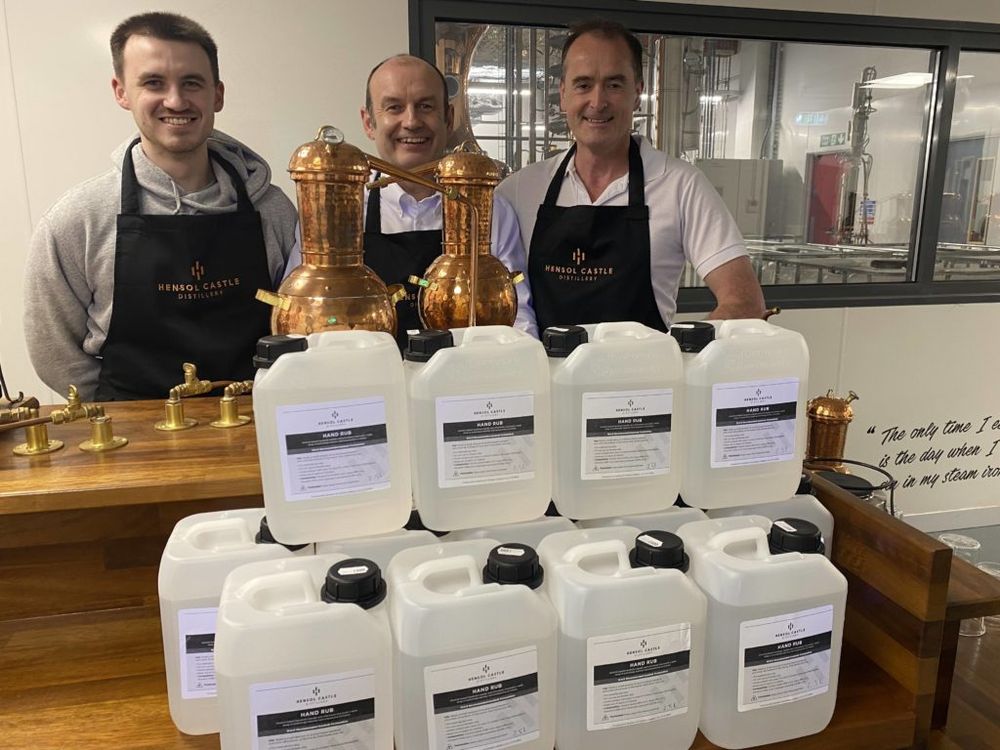
Rhys Mallows, Andy Mallows and Stephen Leeke of Hensol Castle Distillery
Hensol Castle Distillery, South Wales, has converted its newly opened production lines into making much-needed hand sanitiser. The distillery, based in the cellars of a 400-year old castle typically distils its trademark Benjamin Hall and Crawshay gins. But it has diverted its operations to produce hand sanitiser to help meet the national shortage that has occurred as a result of coronavirus.
Andy Mallows, managing director of Hensol Castle Distillery, said: “As the coronavirus pandemic unfolded, it quickly became clear that there was an urgent and national need for hand sanitiser. We realised that, with our production facilities and the manufacturing knowledge of our skilled team, we could help to provide valuable additional supplies at this critical time. From a standing start, we have received World Health Organisation accreditation for our Hensol Castle Hand Rub. Production is now underway and we will build our capacity in the next week to producing more than 1.2 million litres a month, by operating two shifts, seven days a week to fully utilise our facilities. One of the most difficult challenges has been finding containers for the product, and we have been gazumped on more than one occasion. But we have now sourced a variety of sizes from individual 100ml holders to one and 2.5 litre dispensers and even 1,000 litre sizes for industrial use.”
The team has already received orders to supply many of the front-line services including St John’s Ambulance, the Metropolitan Police, Welsh Water as well a number of local councils.
April 15
Born Digital Wine Awards – takes to YouTube to pass out prizes around the world
Last night’s Born Digital Wine Awards helped bring some happiness and light relief to wine writers and commentators all locked down in their homes around the world. To help bring the shortlisted finalists and the judges together, the awards were held live on YouTube with people streaming to join in, share a drink and hear who had won what award. You can see the full list of winners here. And if you want to here’s the link to the full ceremony.

Consumer finance concerns increase around the world as crisis widens
Kantar has released the results from its second global study into what impact Covid-19 is having on consumers around the world. Its key findings of 30,000 consumers in 50 countries are:

Consumers are becoming more concerned about their finances as the crisis deepens
- 52% of people say their day-to-day lives have been impacted by the crisis up from 39% in the first study. wave 1.
- Levels of concern are on the increase, particularly so in the UK and US, where levels have increased by 23% to 82% and 21% to 79% respectively.
- Overall its financial concerns that outweigh personal health concerns at this stage of the crisis.
- 68% of people say the situation demands more proactive financial planning, and 60% are worried about the economy’s ability to recover, while only 50% of people are concerned about falling sick.
- 71% of people say that their household income has or will be impacted by coronavirus. This rises to 78% amongst millennials.
- Young adults are experiencing the most change to their day-to-day lives. Many are making more healthier lifestyle choices, as people look to take control of what they can. 59% of 18-34s say they are eating healthier, 57% are using this as an opportunity, and 48% claim to be exercising more regularly.
- people’s expectations of brands and businesses have also been raised including the donation of useful items and helping the government.
- 47% of people now expect companies to support hospitals during the crisis (vs 41% in wave 1), while 39% say that companies should be making themselves available to governments (35% in wave 1).
- 31% of people want brands to help them during their everyday life suggesting that how brands behave now will be remembered in life after the pandemic.
- only 8% of consumers believe companies should stop advertising, with many claiming that it is a welcome distraction, reminding them of more normal times.
How to manage your business through the crisis
As subject matters go for a webinar series then this is pretty much spot on at the moment. Here’s restaurant and hospitality consultant Peter McAtamney sharing his thoughts on what a wine business can do to manage itself through this crisis in what is a series of talks he is doing to businesses in Australia and New Zealand that are just as relevant for any business around the world. You can have a watch here – just 45 minutes to change your business’ fortune. Or something like that.
Could China open up to UK ecommerce sales?
As China is the first major economic nation to return to something close to normality since the Covid-19 outbreak, ecommence analysts are urging UK businesses to make the most of the huge rise in demand for online sales in the country.
The already strong Chinese e-commerce, worth $1.9 trillion in 2019, market saw mobile usage increase by 20% during the country’s lockdown as Chinese consumers turn more and more to online. Online sales are now expected to $2.3 trillion in 2020.
The highly respected retail analyst Richard Hyman, and founder of Richard Talks Retail told ecommence player JGOO, that looks to connect UK companies to China’s online players: “If British retail businesses are to avoid seeing a fall in sales, the key is to explore other markets. They should be thinking more globally and the online Chinese market is one that they should be considering.”
JGOO has built its business model on targeting Chinese shoppers who are looking to buy British goods online. It claims it can help UK brands and retailers enter the Chinese market within two weeks.
Get Drinks Delivered – new platform to help drinks and restaurant business tell customers about their delivery service
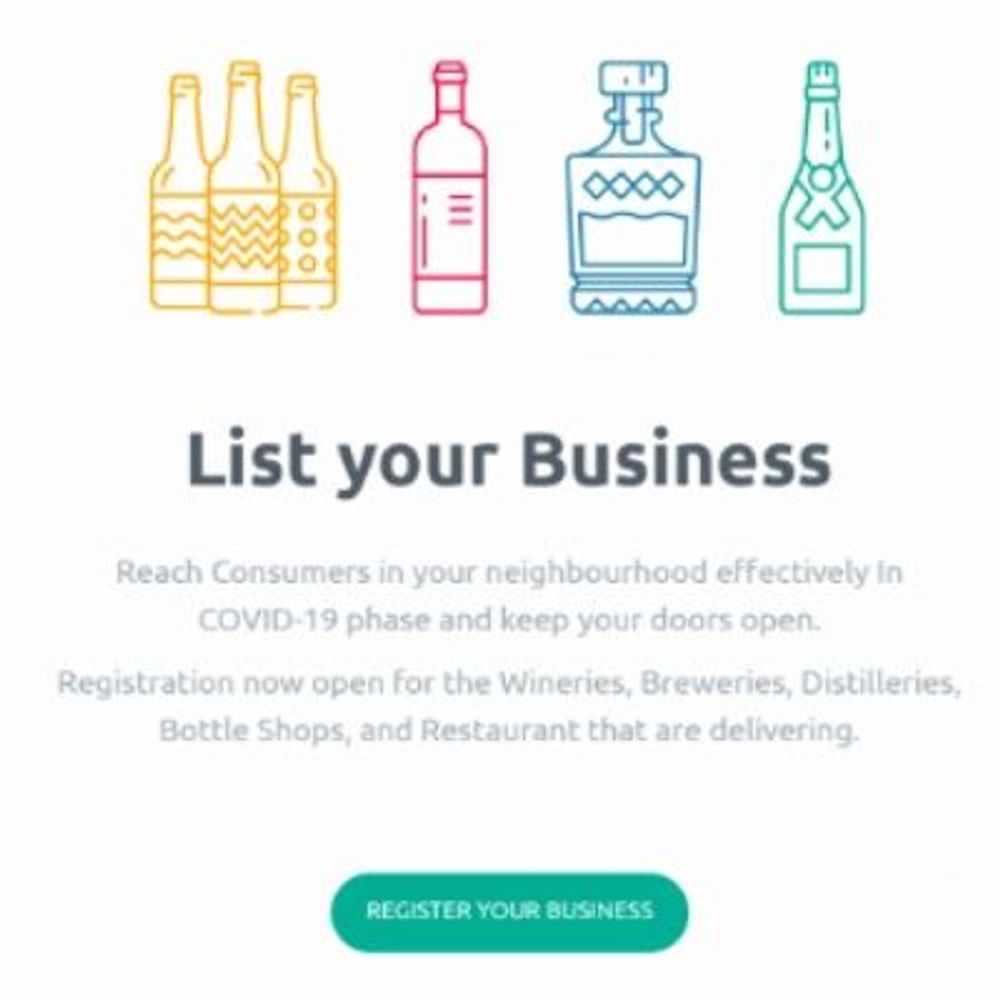
We have already seen tens if not hundreds of companies change their business models so that they can deliver wine, beers and spirits and take advantage of the fact their entire potential consumer base is now at home. How many of these new initiatives will be there when the usual on-trade fires back into life remains to be the seen, but the Beverage Trade Network has introduced a new business model that is not just here for now, but also makes sense in the long term.
It is launching on May 1 the Get Drinks Delivered platform that gives anyone delivering online the chance to come together and tell a wider audience about it. Get Drinks Delivered is initially being launched in the US and the UK and will be open to registration to all bars, restaurants, wine merchants, bottle shops, wineries, distilleries, and breweries that are making deliveries to customers.
Businesses have the opportunity to register now for free using this link. After May 1 there will be a $99 annual administration charge to run the platform.
Sid Patel, chief executive and founder of Beverage Trade Network said of the new platform: “We may very well be in this new normal till the vaccine comes, which may be 12-18 months. This new solution will help the business to get in front of consumers. This is not a backend ecommerce solution or a wine club solution software or a logistical solution – this is pure sales and orders. This will help wineries, breweries, distilleries, bottle shops and restaurants who are delivering themselves in their neighbourhoods tell their consumers they are open and are delivering.
“It’s a very simple solution to a very big problem. Consumers will be able to see who is delivering, what product type and which post and zip codes, and call the business directly. More importantly, BTN will be helping push these businesses and help them market the message to crate awareness and orders.”
Patel told The Buyer: “This is not just a one month solution, we see this as a good long term solution beyond Covid-19 to get some direct orders for themselves and keep their delivery business options in case of such crises.”
April 14
More help needed to get grants and loans out to businesses
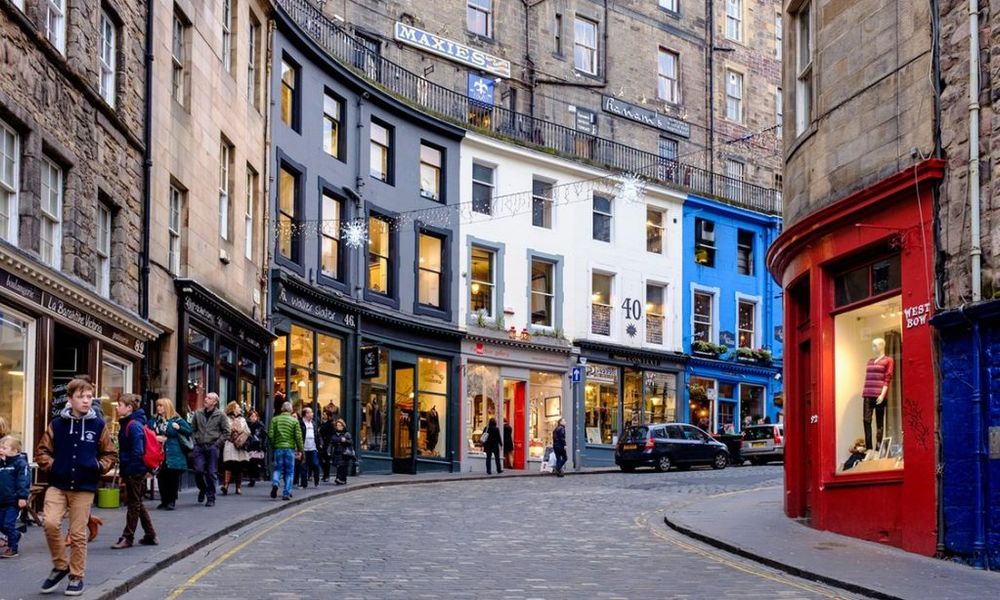
More help is needed to get grants and loans out to smaller hospitality businesses
Kate Nicholls, chief executive of UKHospitality is urging for “one more big, bold intervention” to help hospitality businesses that are not getting the front line support that the government has promised. She has told Propel that the government’s Coronavirus Business Intervention Loan Scheme is not providing the money needed due to administrative issues and decision making that is not getting the cash out fast enough.
Nicholls said: “The government is running out of time to get the cash needed to those companies across the sector that are holding on by their fingertips. They simply cannot afford to wait for another two weeks for decisions to be made -businesses will simply not survive and failure to act will seriously jeopardise the economic recovery, when lock-down ends.”
It comes as it is revealed that only one in 60 applications for grants and loans are being granted. Nicholls said the rate was even higher with 80% finding they were either not eligible or have been refused a government-backed loan because they have a property interest or other security.
“We need radical reform to match the Swiss and American approach of overnight approval and an injection of working capital into smaller businesses, with 100% guarantees from government. The medium-sized companies in the sector need access to funding on the same revised CBILS terms – otherwise the mistakes of the original scheme will simply be repeated – and we urgently need a solution of some sort for companies with a turnover of more than £500m, which have access to no government support,” she said.
UK Hospitality is also asking the government to extend the £25,000 grants to all hospitality premises, irrespective of rateable value and to include what is thought to be 70% of businesses that have a rateable value of more than £51,000.
Supply chains start to buckle and economists fear major GDP fall
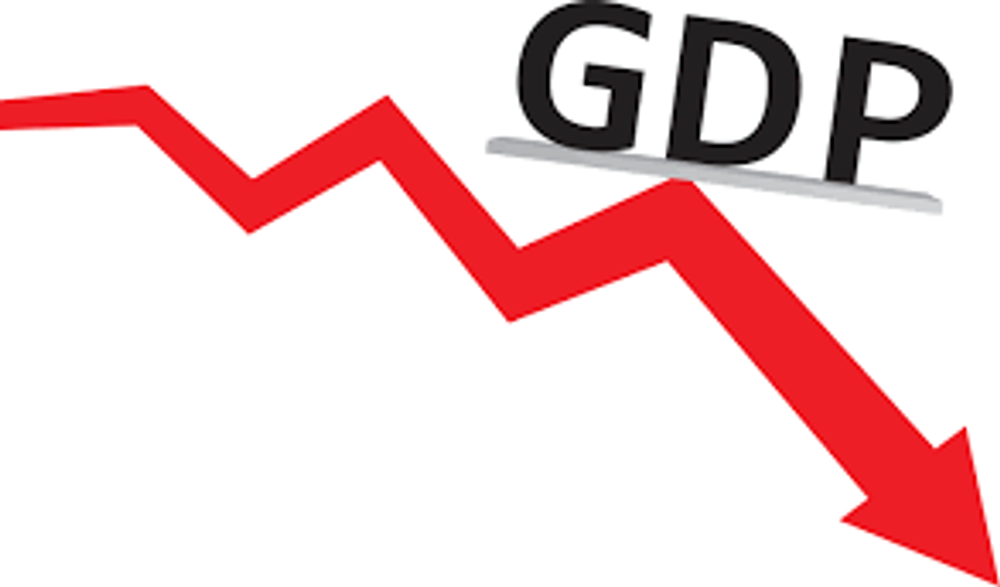
Supply chains are beginning to feel the pressure of the economic lockdown with up to two-thirds (69%) of procurement and supply chain professionals now claiming the impact of coronavirus on businesses is getting worse, according to a Supply Chain Management survey. It has found that 31% of businesses across all sectors who took part in its research had either lengthened on suspended payments to their suppliers. That said there are also cases of major businesses, particularly in the supermarket sector that are shortening their suppliers terms, with 20% offering better terms to help with cash flow and to pay within two weeks.
Economists are also predicting the next 100 days could be vital in how long term the impact of Covid-19 is on jobs across all industry. There are fears by some that GDP could fall by as much as 20% by the end of April. Langton Capital is reporting figures from JP Morgan that claim if GDP does fall by such an extent then it could push unemployment from below 4% at the start of the year to as much as 13%. This would put the country in a worse position than after the financial crisis or the recessions of the 1980s and 1990s. It is thought 1m people have signed up for extra benefits already.
“If the furlough schemes and business support efforts work the unemployment rate could be limited to around 7%, staving off the worst social and economic effects of the crunch,” said Langton Capital.
Digitally native brands are driving the norm – not the exception

Digitally native brands like Eve Sleep will not be the norm such has been the rise of digital retail in recent weeks
We have heard a lot about how digitally native brands somehow stand apart and different to the rest of the retail sector as they abide different rules and need separate skills to operate. Not any more. The impact the Covid-19 outbreak has already had on consumer behaviour and our shopping patterns means digital is now the norm, not the exception. That’s according to Cheryl Calverley, chief marketing officer at online sleep wellness brand Eve Sleep. She believes the lockdown will see e-commerce retailers being treated as the rule, rather than the exception. She told Retail Drive: “We’re all far too fixated on saying we’re digital businesses. Digital is just the mechanism of delivering business in this age. It shouldn’t be the only thing your [brand] is defined by.”
“The reason we sell directly to consumers online is because it is the most efficient way to deal with them, and it is never to be gimmicky. Brands that don’t do it properly will get found out.”
Across the US volume sales on ecommerce sites rose by 14% between March 23 to March 30 according to data from the Forter Global Merchant Network.
Simeon Siegel, managing director at BMO Capital Markets, also told Retail Dive: “It would seem the coronavirus is accelerating the structural changes we’ve been seeing across retail and society for the last decade — toward online interaction, toward e-commerce and away from brick and mortar, toward direct-to-consumer away from department stores. On the one hand, social media has essentially been prepping the world for ‘social distancing.’ On the other, humans aren’t built to not interact.”
Fitch Ratings estimates discretionary retail spending to decline by up to 50% for the first half of 2020, according to an emailed report. With a consumer downturn increasingly likely, Fitch estimates sales to remain in decline during the second-half of 2020, and for sales next year to be down as much as 10% from 2019 levels.
Naked Wines: big online changes in consumer behaviour

The pace of change is also happening in the wine sector where the acceptance of online wine retail has taken even major players such as Naked Wines by surprise. Nick Devlin, group chief executive of Naked said in its financial statement this week – that sees the company on course to increase sales by £200m this year – that the switch to online could be game changing.
He explained: “In the short term, the introduction of social distancing has accelerated the shift in consumer buying behaviour towards online, leading to increased demand from both new and existing customers across all our markets. In the US, especially, I believe the current period could serve as an inflection point for the growth rate of the online category, and as the largest direct to consumer player in the US market we are well positioned as customers move online. Over the medium-term, COVID-19 and its economic impact clearly creates uncertainty. However, Naked, with its advantaged consumer proposition and strong balance sheet is well placed to meet the challenges of a changing consumer environment.”
Naked Wines is also asking its Angels to nominate key workers they know who they think deserve a treat and a few bottles of free wine with a special nomination initiative they have started on its website.
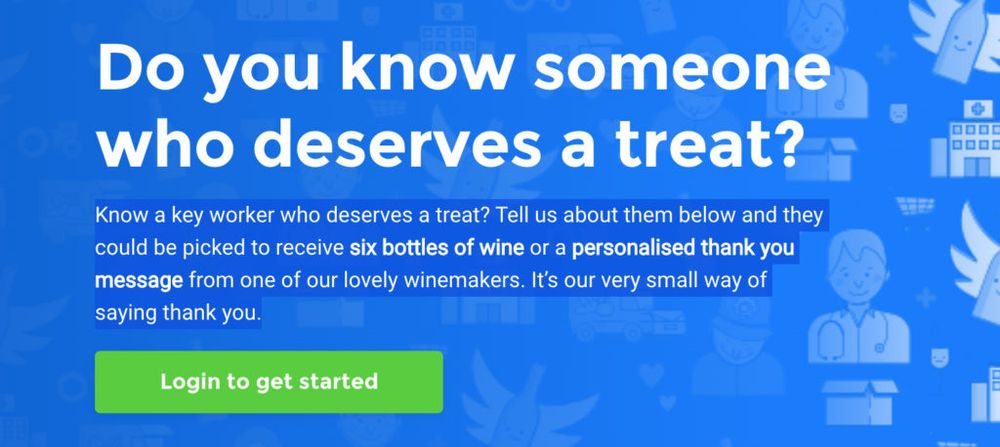
Born Digital Wine Awards – live on a screen near you: April 14, 8pm BST

The Born Digital Wine Awards is hosting a live stream of its 2019 awards on April 14 at 8pm BST. Anyone can join in the fun by taking part in the live stream of the event on its YouTube channel. You will be able to see the awards being presented by the judges that took part in deciding the winners from what were hundreds of entries from all over the world. Also invited to take part, via Zoom, will be the shortlisted finalists in each category, with the winners offered the chance to give an acceptance speech.
The current edition of the awards is its biggest yet in terms of entries and also the quality of those putting in their work in the various categories. There will be awards handed out in the following categories:
- Best Interview
- Best Visual Storytelling
- Sustainability Award
- Innovation Award with Vinventions
- Best Editorial Wine Writing
- Best Tourism with wine content
- Best wine and food content
Behind the Wines with Elaine Chukan Brown and California Wine Institute
The California Wine Institute’s “Behind the Wines” series with Elaine Chukan Brown continues with Episode 2 at 6pm BST. You can register for the Zoom webinar here.

Jasmin Hirsch of Hirsch Vineyards
In this second Chukan Brown will talk to Jasmine Hirsch, winemaker at Hirsch Vineyards, about the challenges and advantages of growing grapes and making wine on the extreme Sonoma Coast. She will also be joined by Cathy Corison, winemaker and founding partner of Corison Winery, who will talk about her winemaking philosophy.
The featured wines being discussed are: 2017 Hirsch ‘East Ridge’ Estate Pinot Noir, Sonoma Coast and 2016 Corison Cabernet Sauvignon, Napa Valley.
Future episodes include:
April 21: Rory Williams, director of viticulture and winemaking, Frog’s Leap Winery and owner and winemaker, Calder Wine Company
April 28: Jason Haas, partner and general manager, Tablas Creek Vineyards.
Larry McKenna, Escarpment in New Zealand – what impact Covid-19 has had on harvest
Have you been harvesting under quarantine or lockdown conditions?
Yes since March 23 New Zealand went into complete lock down at midnight. The wine industry is deemed an essential service so we have been allowed to continue picking under very strict hygiene and people movement regimes. We are well on our way to having an absolutely stunning vintage. Great, clean ripe grapes, from correctly loaded vines. It was our earliest ever harvest start. NZ Winegrowers released a five page document of the terms and conditions we have had to adhere to, to be able to retain essential service status.
Has it been possible to keep social distancing and sanitising whilst doing vintage in the winery?
As long as we can get trades people in the case of a breakdown I think we have everything on hand. Long term relationships established in our district will certainly be a key to getting through this. We were very, very fortunate to have a team of Thai pickers who were willing and able to pick for us. Most other people in the district have moved in with machine harvesters so have freed up the A team of pickers for us.
April 13
Drinks Trust grants deadline 7pm April 14
The deadline to apply for emergency grants for up to £250 from The Drinks Trust ends at 7pm on April 14. To apply go to
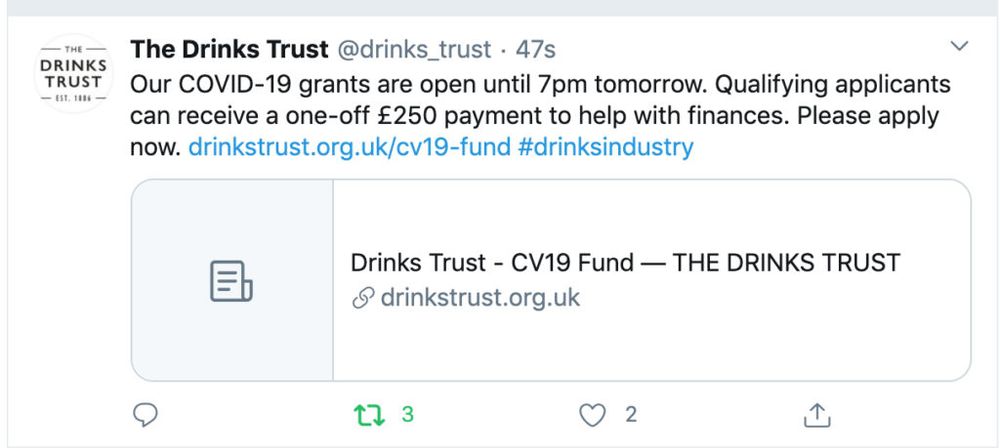
UK grocers see record sales as the nation takes to the shops
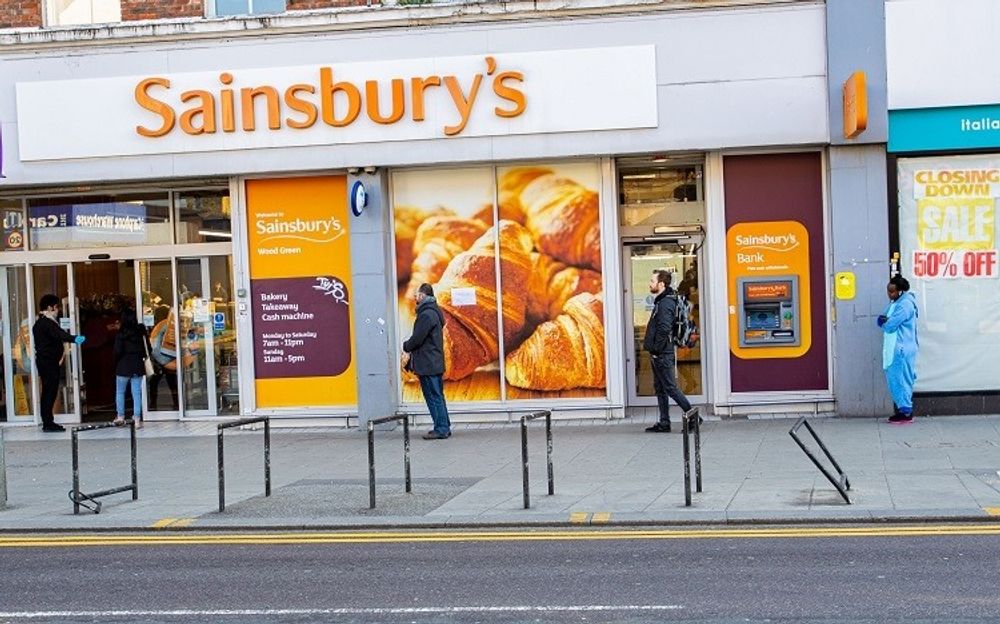
Social distancing in front of Sainsbury’s Wood Green, London, during the Coronavirus pandemic. 26 March 2020.
If you have been stuck in a queue when going out shopping in the last few weeks then you might not be surprised to hear the UK grocery sector has just had a record breaking succession of trading. Some £10.8 billion over the past four weeks, according to the latest figures from Kantar.
March will go down the biggest month ever for grocery sales up over the last four weeks by 20.6%. Even before the lockdown the year-on-year supermarket sales were growing at the fastest rate in over a decade over the past 12 weeks – up by 7.6%.
Kantar said it was on Monday March 16 “that the public headed to the shops in unusually high numbers”. “Between March 16 and March 19, 88% of households visited a grocer, making five trips on average – adding up to 42 million extra shopping trips across four days,” it added.
- The average household spent an extra £62.92 during the past four weeks, equivalent to adding five days worth of groceries.
- Shoppers in London increased their spending the most, up by 26% during the month.
- Alcohol sales are up 22%, an additional £199 million in the past month.
- Those with children over the age of 16 spent £508 this month on average, £88.13 more than they did in March 2019 – a trend that likely reflects students returning home from college and university
- Kantar estimates an extra 503 million meals, mainly lunches and snacks, will be prepared and eaten at home every week for the foreseeable future.
- Purchasing of food and drink items for store cupboards rose by 28% during the past four weeks and by the same again for frozen goods.
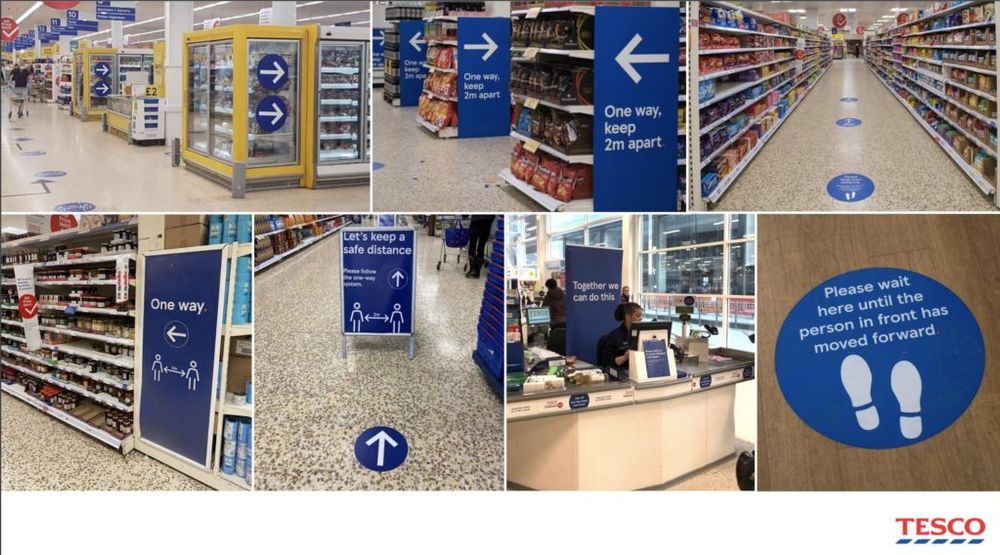
- Convenience stores and independent retailers increased their share of spend to 13.3%, growing sales by 30% compared with the same four weeks a year ago.
- The online figures are perhaps not as high as we might expect, at 13% higher than the same period in 2019, and average baskets were £81.88, only £6 more than in March 2019. This is probably down to limited delivery slots and government advice to free up online shopping to those who need it the most.
- It meant only 14.6% of households received an online delivery in the past four weeks, up from 13.8% in March 2019 but probably well below actual demand.
- The big grocers and discounters took 76% of spend through their tills in the past four weeks, with sales 19% higher than March 2019.
Kantar, though, does not see these big leaps in sales to continue and the industry needs to brace itself for a “drop off over the coming weeks”. It added: “Regular trips to smaller local stores are likely to continue, as people avoid travelling and queues at stores with one-in-one-out policies in place.”
US sees big boom in alcohol and grocery sales
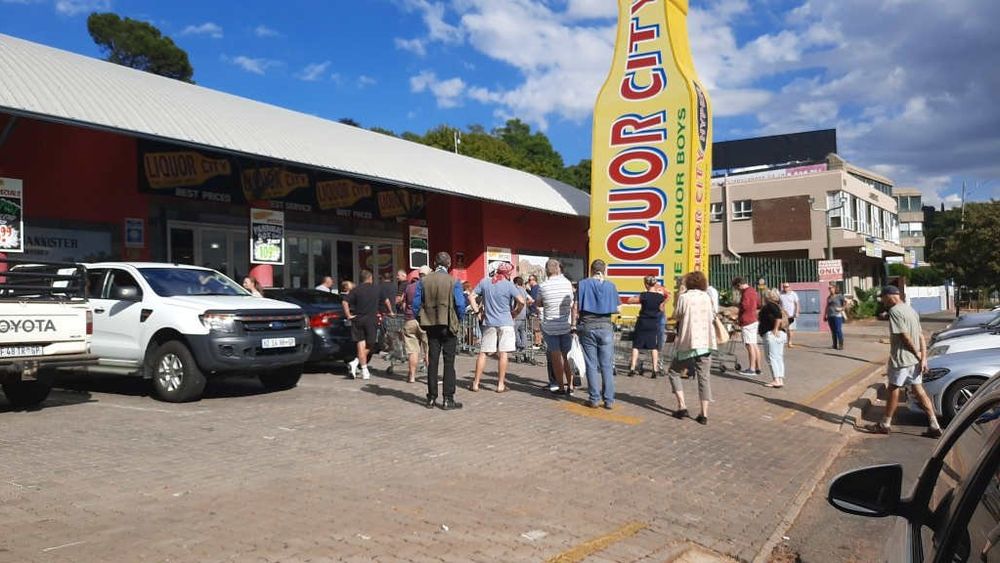
The US has seen a rush on alcohol and wine – and hard seltzers
The US has also seen record sales of groceries and alcohol as its lockdown spreads across the country. Nielsen claimed that by the third week of March, alcohol sales in the US had risen by 55% – with hard seltzers up 106%.
Meininger Wine Business International quotes Rich Bergsund, chief executive of wine.com, one of the country’s biggest ecommerce players, who said its sales more than doubled in March and “are currently running at three times last year’s pace. We are currently selling and shipping over a million dollars (50,000 bottles) per day”. It has had to hire 300 staff across six states to keep up with demand.
According to Meininger’s report wine.com is seeing five times more people joining than normal and it has had a ten ten increase in people singing up to its annual free shipping membership, which gives hope that these customers could be around for a while.
Customers are also asking for advice from its live chat sommeliers at four times the normal rate. wine.com said in March its customers bought 21,000 different wines.
Beer 52’s online beer festival – Cyberfest
Beer 52, the specialist home delivery operator for craft beers, has put together a new-customer package of eight beers, a snack and its magazine, Ferment. It is also going to host on April 18 its own online beer festival – Cyberfest – which it claims is a world first. Those who order now can get the beers that will feature in the event to taste and drink during various streams os debates, and Q&As with the local brewers, giving them a platform to share what they are doing to cope with Covid-19.
April 10
Forget The Body Coach what we all need right now is Joe Wadsack as The Drinks Coach
Joe Wadsack is back on a screen near you thanks to a new vlog series he is doing with CUBE Communications in which he will be sharing – in 10 to 12 minute videos – his tips on what you can be drinking and why as part of a new daily series: The Drinks Coach.
Yes, you can start your day at 9am with a bit of fitness with The Body Coach, and then nearly 12 hours later crack open a bottle and let Mr Wadsack take you on his own unique journey of different wines, spirits and beers to enjoy. Every night at 8.30pm, starting April 9, Wadsack, aka The Drinks Coach, will release a new video on his own dedicated YouTube Channel, The Drinks Coach UK. First up he talked all about why having the right glass is as important as the wine in it. “Your glass is your hifi equivalent to listening to music,” he says.
More pearls of wisdom on April 10 when he’s talking about sparkling wine – and no doubt English to coincide with the trade love-in on Good Friday for all things English in a bottle – and April 11 is dedicated to Shiraz.
It’s a way for Joe to share his vast experience of every kind of beverage you could want to put in a glass, but also give you ideas on what to do when out shopping locally with some specific tips on what wines, beers and spirits to look out for.
As he says: “This is a challenging time for everyone. I’m here to make you smile as you enjoy a a relaxing drink at the end of the day, whether you’ve been juggling work, kids, running a house or simply going a bit crazy. With The Drinks Coach, I’ll be bringing you a short burst of drinks fun and expertise, that will guarantee you’ll never mumble over a wine list again. Ask questions, share your favourites and let me help you with your wine woes.”
You can also keep up with him on Facebook, Instagram and Twitter via @drinkscoachuk (or for those in the know @vinesack).
Gaucho’s Martin Williams launches new ‘All Together’ chief exec mentoring scheme made up industry leaders from across hospitality and business sectors
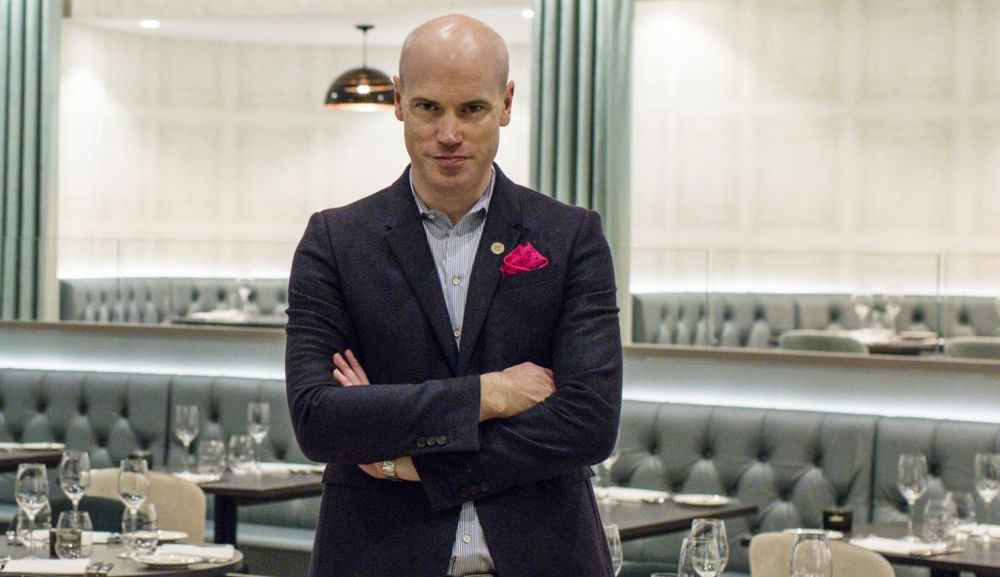
Martin Williams has brought together 30 industry leaders to offer free business advice to those caught up in Covid-19 crisis
Martin Williams, chief executive of Gaucho and M Restaurants, has brought together a group of 30 leading figures across the restaurant and hospitality sectors who together are looking to offer and share their expertise and experience with individuals and businesses who have directly been hit by the Covid-19 crisis.
Williams explained to The Buyer what he hoped they could collectively achieve: “The hospitality industry is facing a huge challenge to come out the other side of the Covid Crisis in anything resembling a healthy place. To help founders and chief executives in both the restaurant and other sectors have come together to create the ‘All Together’ movement – a collection of amazing names, all legends in their industries – to offer pro bono advice and mentoring during this time.”
The initiative also includes the founders of Innocent Drinks,the former ceos of The White Stuff, Flying Tiger and The Body Shop, and a wide range of people in technology, consumer goods, retail, hospitality and the creative industries, as well as business services, VC, engineering and manufacturing.

Some of the founders of Innocent Drinks are part of the All Together mentoring scheme
The free service is specifically open ceos and business owners of SMEs with annual revenues of £5m-£100m.
Williams added: “These are extraordinary times, for society and for our business community. CEOs and business owners today are making critical decisions that will determine not only their ability to survive this unprecedented crisis, but the sort of business they will be once the economy starts to recover. Whilst many in hospitality are offering support, I have always found cross-sector advice to be more objective and empathetic. All together offers both specialist sector advice and mentoring opportunities from other industries.”
“The All Together movement opens the doors of myself and a wealth of experience from legends such as Xavier Vidal, Sally Bailey, Goran Strandberg and Jamie Mitchell. As more advisors and business leaders seeking help join our community, I anticipate that we can truly all come together to fight this unprecedented challenge as one. This is a time when hospitality leaders need to step up, give support, job security and create a community for their colleagues. There have been too many red faces from Hospitality ‘Leaders’ in the past few weeks. It’s now time to support each other and truly be ‘All Together.’”
Key advice from UK Hospitality and Association of Convenience Stores on tackling Covid-19

KAM Media has been conducting a series of interviews with leading figures in the industry that are at the sharp end of dealing with Covid-19. None more so than Kate Nicholls, chief executive of UK Hospitality and James Lowman, chief executive of the Association of Convenience Stores. If you have half an hour to spare this Easter then listen to these great insights into what their sectors are doing to help their communities and what steps they are taking to help their members and their respective sectors at this time. The interview covers key areas such as:
- How we are seeing collaboration between the industries and how they could better collaborate.
- How we are seeing the lines between the channels obliterated as hospitality offer grocery retail and convenience stores offer delivery and foodservice
- How furloughed pub staff have moved across to the convenience sector.
- What will the future look like? Will they continue to expect hot food / takeaway from c-store long term? Will groceries provide a new revenue stream for pubs?
- How this affecting the supply chain to retail and hospitality.
- What this might mean in terms of future reform.
- You can listen to the full interview on Sound Cloud here.
Fiona Beckett’s Twitter #weekendwinematching

If you want to know what to drink with what you are planning on eating this Easter then send your recipes to #weekendwinematching and Guardian wine critic, Fiona Beckett, will give you some ideas from all the years she has spent compiling her own Matchingfoodandwine website. You can do so live at 5pm on April 9 or follow @winematcher and sure she will give you a tip or two out of hours as it were.
Star Wine List to host world tasting live from Stockholm April 15

The line up for Star Wine Lists first global tasting
Our partners at Star Wine List are to host a global wine tasting next week, in partnership with Austrian Wine, featuring top sommeliers and influential figures across the wine trade for a online chat and tasting at 4pm (Central European Time – 3pm in the UK). Taking part will be the ASI Best Sommelier of the World Marc Almert, and Raimonds Tomsons, who came seventh in the 2019 Best Sommelier competition.
The tasting is being hosted by Ruth Spivey, who is the UK ambassador for Star Wine List, and will also feature other wine list ambassadors around the world including Simon Woolf in Amsterdam, Liinaa Berry in Adelaide and Manu Rosier in Berlin. The idea is for them to each bring a favourite Austrian wine and share stories around them. You can take part by going to its Facebook Live page on Wednesday where you can also ask questions. Oh, and bring a bottle of Austrian wine to help get in the mood.
South Africa is back open for exports
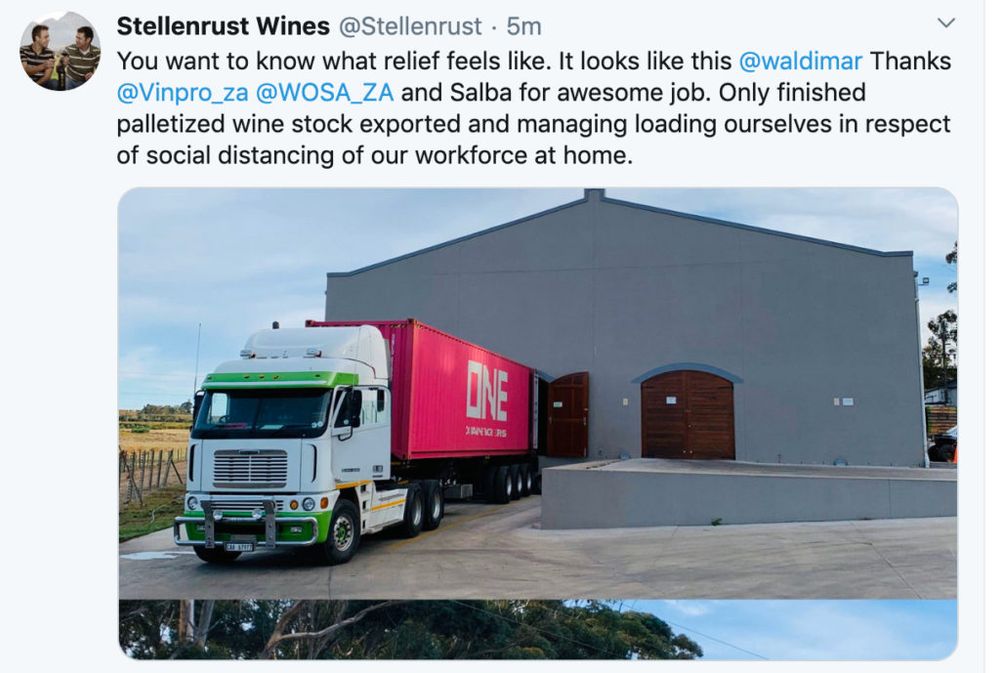
Just one example of the relief in South Africa now that wine exports can be started again
The hard fought lobby to allow the South African wine industry to carry on exporting wine around the world during the country’s 21-day Covid-19 lockdown has been won this week. It follows days of “intensive lobbying by an Industry Exporters Task Team” to allow wine to be exported and therefore safeguard 1000s of job within the South African wine industry.
The initial lockdown ruled out the sale, movement or even harvesting of any wine grape during the 21-day period. The first success was to get the government to allow the harvest to continue which was won at the end of last week. Now the government has agreed to allow exports to continue as well.
Vinpro, which has been working with other trade bodies including Wines of South Africa for further concession, has revealed that Fikile Mbalula, Minister of Transport agreed to lift the lockdown Regulations and “to expressly permit the export of wines and other fresh produce products”.
A video from Creation Wines that captures what everyone is doing to stay safe at the moment
Austrian Wine Online Roundtable April 16
Austrian Wine is also hosting an Online Round Table with key players in the UK wine market on April 16 at 4pm (BST). The five experts taking part are below and as well as discussing current trends and Austrian wine’s place on wine lists they will be going through six Austrian wines:
- Anne Krebiehl MW, writer for The Buyer and contributor editor for Austria, Alsace, Burgundy and England for US Wine Enthusiast Magazine
- Ronan Sayburn MS, head of wine at 67 Pall Mall London, and head of The Court of Master Sommeliers Europe.
- Christina Rasmussen, wine writer, co-founder of Littlewine.
- Helena Nicklin, of The Three Drinkers.
- Wieteke Teppema, sommelier.
- You can register to take part by clicking this link.
Boutique Bar Brands online tastings success
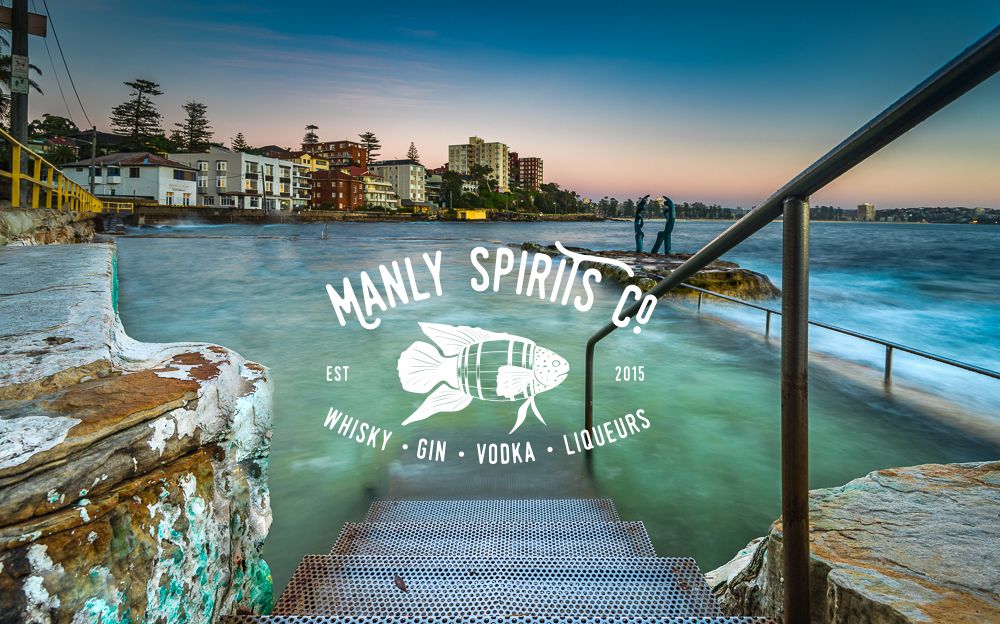
Philip Harding, director of Boutique Bar Brands said it launchd its new online tasting platform last week, in partnership with Solution17. They held a tasting with Manly Spirits Co. Distillery and Lilly Pilly gin and invited 50 gin influencers to attend. Not really knowing what to expect they were delighted to find that the new tasting platform has helped – a week later – to:
- acquire 600 new Manly UK followers
- 2,000 profile visits
- generate 120,000 impressions
- reach 76,000 people
- and get 500 story mentions
It’s hopeful of more the same on Good Friday evening at 8.30pm when it is again opening its virtual doors to members of the public, where they can hear the Manly Spirits story straight from its founder David Whittaker live from Sydney! It will also include a cocktail masterclass and a Q&A session.
To take part go to: https://staging-demo-portal.webcastlivetools.com/user/register
April 8
All in this together
The International Labour Organisation has reported that 81% of workers around the world have seen their jobs “impacted in one way or another” by the coronavirus outbreak.
Key global drinks trends have been turned on their heads
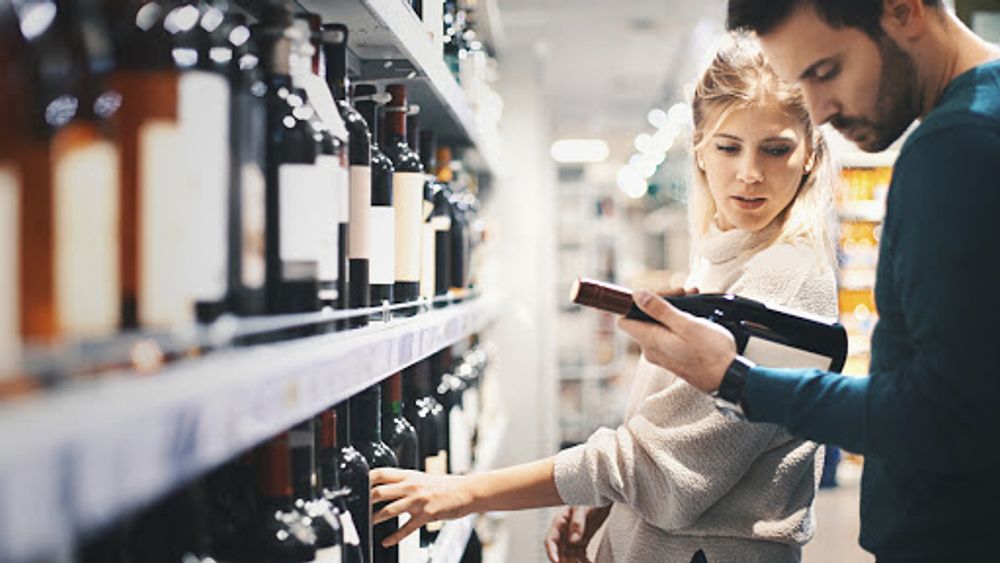
Shoppers are going to want to pay less for their wine and promote where they can more local producers
Although Wine Intelligence claims the four key trends it identified at the start of 2020 as being the key driving forces for the year ahead are still relevant – namely relationship, retail, repertoire and responsibility – the Covid-19 outbreak has already changed what impact they will individually have.
Retail: It believes the big surge in off-trade sales we have seen since the lockdown of the on-trade will, if as expected it is followed by a global economic recession then “this switch to at-home consumption of wine will be both a medium and potentially long-term trend”. But the key to success here will be the operators that can deliver a “strong and memorable experience in an out-of-home setting”. Those that do will have to get used to it being less often with less money spent.
Premiumisation: the trend the wine category has enjoyed in recent years, “driven by the ‘less but better’ mentality” is one that “may be turned on its head by coronavirus”. “Economies will recover, but consumer confidence may take longer to come back. Value for money will be paramount and this will be particularly true for the category of wine, where price-points are distributed across such a broad range, delivering quality options at lower prices,” said Halstead.

Robin Copestick believes the wine market in both the on and off-trades are likely to go back to the value and discounted trends that dominated wine after the 2009 recession
Robin Copestick, managing director of Freixenet Copestick, agreed. He believes we are likely to return to the wine market that came out of the last great recession in 2009. “We saw a lot of interest in wine at that time, but it was very much at the entry level. So with people likely to be spending less we can see a return to heavy discounting,” said Copestick.
Felix Solis Ramos, international commercial and marketing director at Spain’s Felix Solis, said he is already seeing its major retailer customers look to re-assure their customers by concentrating on sourcing good quality, but affordable everyday wines they can rely on. Which, in turn, could be good news for the major branded wine players and suppliers capable of producing – and sourcing – consistent wine at below £10, £8 and £6 a bottle.
Richard Cochrane, Felix Solis’ UK managing director, told The Buyer that a lot would depend on how consumers collectively “emerge” from this crisis and the weeks of lockdown. It’s the big unknown that the drinks industry can only speculate about, but his feeling is that “new habits” will have been formed and we will only really see those when restaurants and bars open up again. Will people choose to go out as much as they did remains to be seen, he stressed.
The exciting and positive aspect of the situation we all find ourselves in is how fast drinks companies across all sectors have been to respond, added Cochrane. “It’s been remarkable to see,” he added.
Wine origin: Wine Intelligence also expects to see a “shift in consumption” towards domestic and local wines as “national populations become more inwardly-focused and protective”.
Lack of loyalty: Although we might want to support our local producers more, Wine Intelligence does not see a change in consumers’ lack of loyalty to any particular drinks category. If anything the lockdown will have made us more adventurous as drinkers.
Rise in ecommerce and home delivery
No prizes here but ecommerce continues to be the key growth category as so many operators in the UK on and off-trades have been forced into going online and doing home deliveries. It’s the same situation in the US where Rabobank is reporting overall DTC wine sales up 60%, with players such as wine.com up 200%, Drizly 250% and City Hive up 900% respectively. But it’s clearly working.
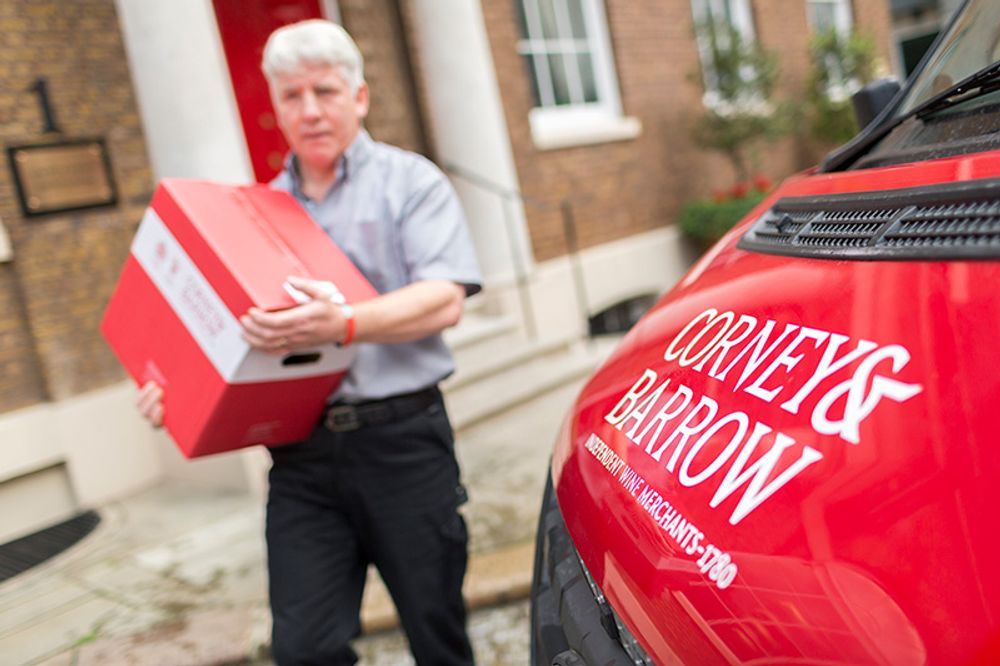
From A to B: Corney & Barrow is like most major ecommerce wine distributors enjoying huge sales growth at the moment
Drinks research analysts, IWSR, claims Corney & Barrow “reported a 40-50% increase in deliveries at the end of March, while Armit Wines said March had seen its highest turnover in internet sales in over a year, with traffic levels similar to Christmas, but over a more prolonged period”.
Major drinks and spirits brands are also cutting out traditional routes to market and going direct. Like Bacardi, that was already ahead of the game by forging close ties with online drinks apps. “Because we had these important pillars already in place, we were able to quickly shift our strategy. This segment is now a critical part of our business that is helping us weather the crisis: just these past few weeks, we’ve seen triple-digit ecommerce growth,” said Lorran Brown Cosby of Bacardi North America.
IWSR chief executive, Mark Meech, is not convinced this switch to online will continue in the long term: “Consumption habits formed now may stick around in the future, however people who used to go out and shop will likely not switch to ecommerce completely going forward.”
“It will likely have a big impact on craft,”added IWSR director, Alastair Smith. “Consumers will be less likely to spend money on a bottle of craft gin when they don’t know if they’ll like it or not. This could lead to quite a shake-out.”
On-trade recovery?

Farr Vintners’ Steve Browett is confident the on-trade will bounce back
The trade is currently split on how quickly the on-trade can respond once the lockdown is over and bars and restaurants can open again. The fear is not only will it have seen many go to the wall, but consumers will have changed and they might prefer to carry on spending time at home but now with their friends and family rather than risk further infection by going to crowded on-trade outlets.
Stephen Browett, chairman of Farr Vintners, is not convinced: “Once the crisis is over, we are sure that people will want to celebrate and there will definitely be a surge in parties, eating out, wine dinners, etc. My sense is that this is short-term. I can’t imagine that the bars, clubs and pubs will be particularly different from what they are right now. Smaller restaurants and bars might not be able to survive, but it’s not unreasonable to think that their place will be taken by someone else. I think people are now really craving social interaction. If this ends in a few months, August could make for a pretty great summer for the on-trade.”
Smith at IWSR agrees: “Quite clearly there’s a massive switch from the on-trade to at-home consumption, but this will not be a permanent shift for the long term.” says Smith. “It is a forced restriction in many markets and while some consumers may opt to enjoy drinks at home with friends, especially as disposable incomes take a hit, many consumers will continue to enjoy the on-premise atmosphere.”
WSTA steps up its calls for duty to be suspended until the end of the year
The Wine and Spirit Trade Association has this week written to the Chancellor Rishi Sunak setting out in three clear steps what it hopes he can do to help drinks businesses through 2020 – particularly around halting and suspending duty payments.

The Chancellor has the opportunity to suspend duty payments says WSTA
1 It has called on the Chancellor to extend immediately the support on offer to pubs, bars and restaurants to wider hospitality supply chain businesses, “many of which” it says “have seen demand reduced to zero almost overnight, but which are currently deemed ineligible for much of the government’s support”.
2 It urges the government “to employ the same approach to excise duty as it does to VAT, and implement proactively a duty deferment scheme – in the same way it has for other taxes.” “Spreading duty payments over the remainder of the year from the summer would result in no loss of revenue to the Exchequer, but would provide a vital and welcome cash injection to businesses – which would help them to tackle the cashflow crisis, the single largest challenge for so many of these businesses, especially the smallest. This cash injection, the WSTA argues, could prevent smaller businesses being lost amid current restricted trading conditions, and would help larger businesses maintain payments to other businesses throughout the sector.”
3 The WSTA is asking for businesses to be allowed “to put stocks of duty-paid wines and spirits back into excise suspense, thus allowing them to claim back duty already paid on products not yet sold and further ease cashflow pressures”.
Pubs Code Adjudicator: Pubcos need to do more
The Pubs Code Adjudicator has responded to the news that many of the so called Big Six PubCo groups have not cancelled rent payments at this time but simply suspended it. It is asking them to do more and follow the lead of other pub groups like Admiral Inns and Fullers in cancelling them completely.
Nik Antona chairman of CAMRA said the “intervention” by the Pubs Code Adjudicator was “timely and encouraging”. “From the outset of the COVID-19 crisis, CAMRA has called on pub companies to do the right thing and cancel rents. The rest of the big six pubcos should be following Admiral’s example. Deferring rent collection simply isn’t enough – the pub industry is facing unprecedented challenges and the survival of the trade as we know it is at stake.”
According to a CAMRA press statement Ei Group, Punch, Greene King and Star Pubs and Bars have suspended rent collection but have not cancelled rents. Marstons is said to be suspending rent collection on a case by case basis
Robinsons Brewery cancels all rents and restructures for the crisis
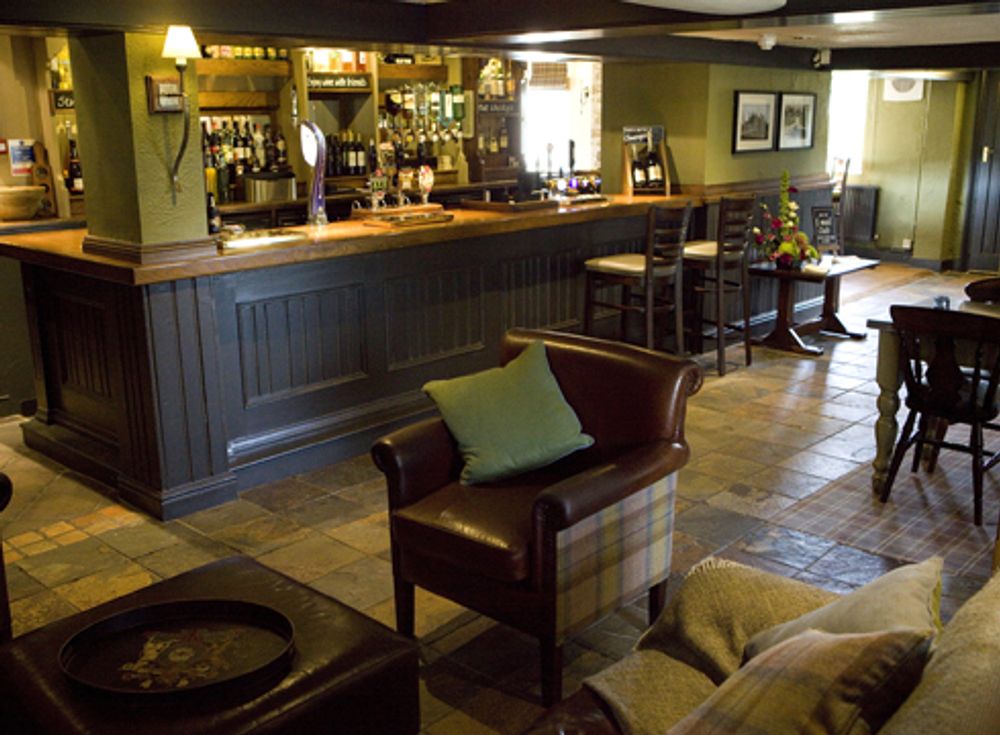
A typical interior of one of Robinsons’ 300 plus pubs
Robinsons Brewery, the north west brewer, has cancelled all rent for its 240 tenanted pubs and suspended direct debits and freezed repayments of loans and interest charges until its pubs are allowed to open. It is also promising to replace all draught beer and cider that goes out of date during the lockdown.
Its board and executive team have also taken a voluntary pay cut and the company has pledged not to made any redundancies. It is keeping on a skeleton team at its brewery and packaging centre on full pay, whilst the rest of its employees are receiving 80% of their normal salary. It is continuing to brew and package beer for export and the off-trade. Robinsons also paid suppliers in full at the end of March to “repay their support for us over the years”.
Tesco reveals impact of stockpiling
Tesco has released a series of graphics to show the impact changing consumer spending has had on the grocery supply chain.
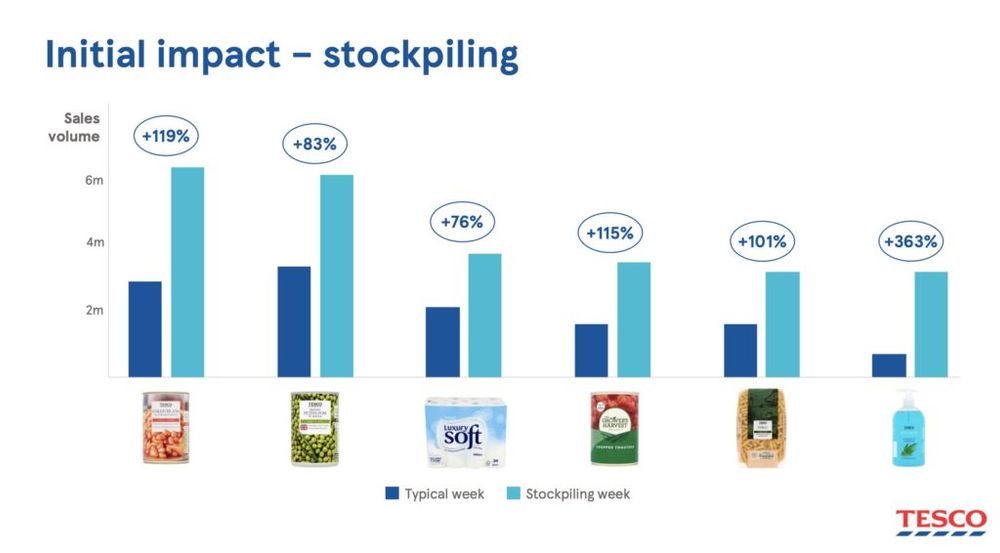
How to get involved in #theBIGenglishwinegoodfriday
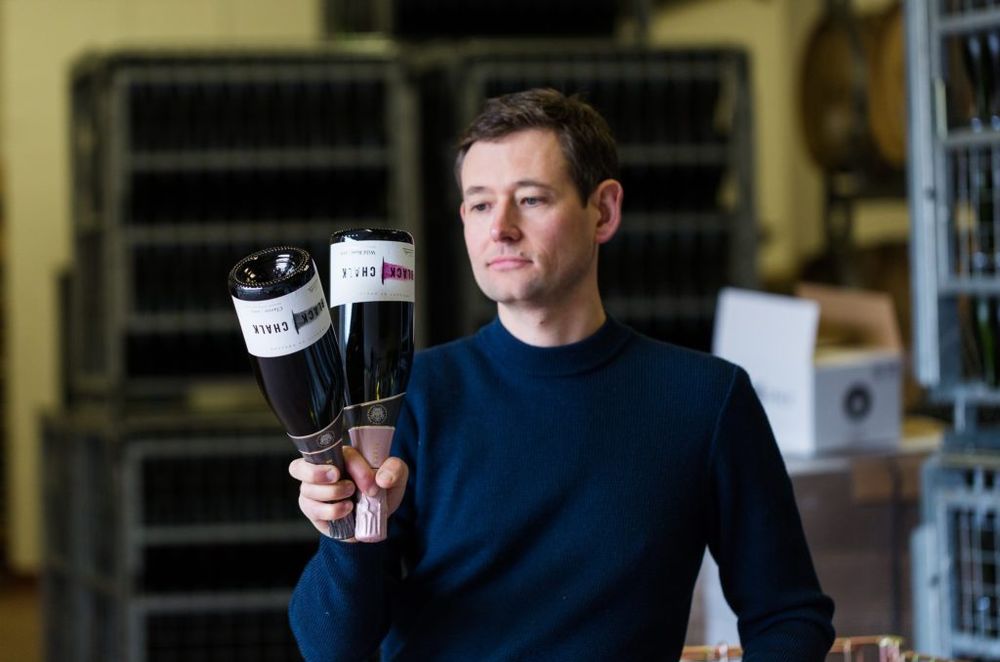
Black Chalk’s Jacob Leadley tweet has helped to launch a national campaign
Here’s a way to enjoy Easter with colleagues across the wine trade, whilst also helping to support the English winemaking community. A new wine tasting and social media initiative has been set up under the hashtag #theBIGenglishwinegoodfriday. The idea is bring as many people as possible together at 7pm on Good Friday to share wines, stories and help give English wine producers their 15 minutes (or so) in the spotlight.
The whole idea came about when Black Chalk winemaker, Jacob Leadley sent out this tweet on March 27: “If every person in the UK that loves English or Welsh wine bought a bottle direct from their favourite producer I think we might secure an entire industry and their workforce on one very enjoyable evening.”
The idea has mushroomed from there and a number of winemakers, including appropriately enough Leadley and his assistant winemaker, Zoe Driver, will produce short videos to be released across social media channels on Good Friday evening.
The initiative has been picked up by a number of other major trade figures and wine writers including Olly Smith and Helen McGinn all keen to be doing their bit for the English wine industry. “I really didn’t expect this to escalate as it has done. But the original tweet seemed to resonate with the industry as I think we are all searching for some positives right now,” said Leadley.
WineGB has set up a SHOP LOCAL campaign page for consumers to find vineyards who will deliver direct to their home and which flags up special offers. Click here .
Armit Wines to donate to Drinks Trust from cases sold

Armit Wines is to donate £10 to The Drinks Trust on every order placed for delivery through its consumer website and via its private client team, and, as an added touch will include an extra free bottle of wine with the order. Customers will also be given the chance to donate an additional fixed amount to the charity. It is also donating £10 for every trade order placed over £250.
The money raised will go toward’s The Drinks Trust’s Covid-19 Emergency Fund which is giving out grants of £250 for those in the sector that have been directly impacted by the crisis.
Brett Fleming, Armit’s managing director, said: “At this most difficult time it is important to recognise the challenges people are facing who have lost their jobs or find themselves out of work through no fault of their own. Here at Armit we are doing all we can to ensure we represent our suppliers best interests, and in supporting The Drinks Trust I am sure we echo their own desires to support those who need it most at this time.”
You can find out more and pledge money to the Drinks Trust Covid-19 Emergency Fund here or call the helpline on 0800 915 4610.
Churchill to host online chats with its winemakers
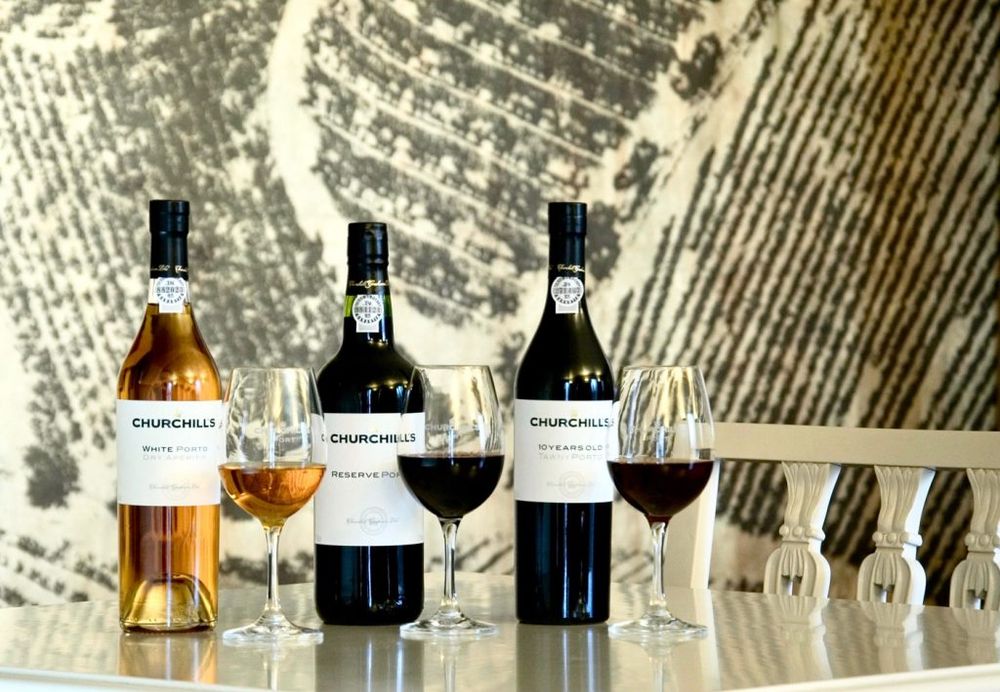
Churchill’s Port and Douro Wines is opening up to its customers by hosting a series of online tastings with winemaking duo John Graham and Ricardo Pinto Nunes aimed at showing people at home its range of classic ports and Douro terroir wines. It will all be live streamed through Churchill’s Instagram during April.
It is part of a company strategy to grasp the situation and this month make a concerted effort to “shift focus online and make meaningful consumer connections during a difficult period for small wineries”. Consumers will be able to buy the wines being tasted in advance.
Zoe Graham said: “We are largely dependent on other small businesses, such as independent wine shops and restaurants, many of whom have had to close their doors. While bigger producers have the supermarkets, we have to find new ways to reach our consumers. We’re excited to experiment in online sales and live-streaming, where people can engage with our winemakers and experience Churchill’s wines and ports in more meaningful ways.”
The tastings will be live-streamed on April 14, 16, 21 and 23 at 8.30pm BST, including live question and answer sessions with the winemakers (@churchillls_port). The e-tastings will also be available to view on-demand afterwards.

